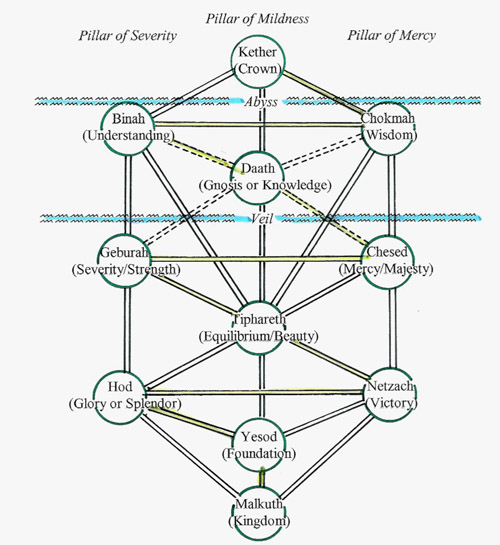Author: Mathieu Struck
Batrachomyomachia (o Physignathos, la Rana hija de Peleo)

Zoomorfismo urbano nos subúrbios de Buenos Aires (Oct-2007).
Photo: Mathieu Struck
Great Physignathos I, from Peleus’ race,
Begot in fair Hydromede’s embrace.
Where, by the nuptial bank that paints his side,
The swift Eridanus delights to glide.
Parnell: Battle of the Frogs, bk. i.
Source: Dictionary of Phrase and Fable, E. Cobham Brewer, 1894
La Batramiomaquia
de Homero (ou de algum outro sujeito)
Al comenzar esta primera página, ruego al coro del Helicón que venga a mi alma para entonar el canto que recientemente consigné en las tablas, sobre mis rodillas ââ?¬â?una lucha inmensa, obra marcial llena de bélico tumultoââ?¬â? deseando que llegue a oídos de todos los mortales cómo se distinguieron los ratones al atacar a las ranas, imitando las proezas de los gigantes, hijos de la tierra. Tal como entre los hombres se cuenta, su principio fue del siguiente modo:
Un ratón sediento, que se había librado del peligro de una comadreja, sumergía su ávida barba cerca de allí, en un lago, y se refocilaba con el agua dulce como la miel cuando le vio una vocinglera rana, que en el lago tenía sus delicias y le habló de esta suerte:
ââ?¬â?Forastero, í¿quién eres? í¿De dónde viniste a estas riberas? í¿Quién te engendró? Dímelo todo sinceramente: no sea que yo advierta que mientes. Si te considerare digno de ser mi amigo, te llevaré a mi casa y te haré muchos y buenos presentes de hospitalidad. Yo soy Hinchacarrillos y en el lago me honran como perpetuo caudillo de las ranas: crióme mi padre Lodoso y me dio a luz Reinadelasaguas, que se había juntado amorosamente con él a orillas del Erídano. Pero noto que también eres hermoso y fuerte, más aún que los otros; y debes de ser rey portador de cetro y valeroso combatiente en las batallas. Mas sea, declárame pronto tu linaje.
ââ?¬â?í¿Por qué me preguntas por mi linaje? Conocido es de todos los hombres y dioses y hasta de las aves que vuelan por el cielo. Yo me llamo Hurtamigas, soy hijo del magnánimo Roepán y tengo por madre a Lamemuelas, hija del rey Roejamones. Pero, í¿cómo podrás conseguir que sea tu amigo, si mi naturaleza es completamente distinta de la tuya? Para ti la vida está en el agua, mas yo acostumbro roer cuanto poseen los hombres: no se me oculta el pan floreado que se guarda en el redondo cesto; ni la gran torta rociada de sésamo; ni la tajada de jamón; ni el hígado, dentro de su blanca túnica; ni el queso fresco, de dulce leche fabricado; ni los ricos melindres, que hasta los inmortales apetecen; ni cosa alguna de las que preparan los cocineros para los festines de los mortales, echando a las ollas condimentos de toda especie.
Jamás huí de la gritería horrenda de las batallas, sino que siempre me encamino hacia el tumulto y pronto me mezclo con los combatientes más avanzados. No me espanta el hombre con su gran cuerpo, pues encaramándome a la cama en que reposa le muerdo la punta del dedo y hasta le cojo por el talón sin que le venga ningún dolor ni le desampare el dulce sueí±o mientras yo le muerdo. Dos son los enemigos de quienes en gran manera lo temo todo en toda la tierra: el gavilán y la comadreja, que me causan terribles pesares; y también el luctuoso cepo, donde se oculta traidora muerte. Pero temo mucho más a la comadreja, que es fortísima y, cuando me escondo en un agujero, al mismo agujero va a buscarme. No como rábanos, ni coles, ni calabazas ni me nutro de verdes acelgas ni de apio; que estos son vuestros manjares, alimentos propios de los que habitáis en la laguna.
A estas razones Hinchacarrillos contestó sonriendo: ââ?¬â?áOh forastero! Mucho te envaneces por lo del vientre; también las ranas tenemos muy muchas cosas admirables de ver, así en el lago como en la tierra firme. Pues el Cronión nos dio un doble modo de vivir y podemos saltar en la tierra y zambullir nuestro cuerpo en el agua, habitando moradas que de ambos elementos participan. Si quieres comprobarlo, muy fácil te ha de ser: monta sobre mi espalda, agárrate a mí para que no resbales y llegarás contento a mi palacio. Así dijo; y le presentó la espalda. El otro, subiendo al punto con fácil salto, asióse con las manos al tierno cuello. Y al principio regocijábase contemplando los vecinos puertos y deleitándose con el nado de Hinchacarrillos; mas, así que se sintió baí±ado por las purpúreas olas, brotáronle copiosas lágrimas y, tardíamente arrepentido, se lamentaba y se arrancaba los pelos, apretaba con sus pies el vientre de la rana, le palpitaba el corazón por lo insólito de la aventura y anhelaba volver a tierra firme; y en tanto el glacial terror le hacía gemir horriblemente. Extendió entonces la cola sobre el agua, moviéndola como un remo, y, mientras pedía a las deidades que le dejaran arribar a tierra firme, iban baí±ándolo las purpúreas ondas. Gritó, por fin, y estas fueron las palabras que profirió su boca:
ââ?¬â?No fue así ciertamente como llevó sobre los hombros la amorosa carga el toro que, al través de las olas, condujo a Creta la ninfa Europa; como, nadando me transporta a mí sobre los suyos esta rana que apenas levanta el amarillo cuerpo entre la blanca espuma.
De súbito apareció una hidra, con el cuello erguido sobre el agua áAmargo espectáculo para entrambos! Al verla, sumergióse Hinchacarrillos, sin parar mientes en la calidad del compaí±ero que, abandonado, iba a perecer. Fuese, pues, la rana a lo hondo del lago y así evitó la negra muerte. El ratón, al soltarlo la rana, cayó en seguida de espaldas sobre el agua; y apretaba las manos; y, en su agonía, daba agudos chillidos. Muchas veces se hundió en el agua, otras muchas se puso a flote coceando; pero no logró escapar a su destino. El pelo, mojado, aumentaba aún más su pesantez. Y pereciendo en el agua, pronunció estas palabras:
ââ?¬â?No pasará inadvertido tu doloso proceder, oh Hinchacarrillos, que a este náufrago despeí±aste de tu cuerpo como de una roca. En tierra, oh muy perverso, no me vencieras ni en el pancracio, ni en la lucha, ni en la carrera; pero te valiste del engaí±o para tirarme al agua. Tiene la divinidad un ojo vengador, y pagarás la pena al ejército de los ratones sin que consigas escaparte.
Diciendo así, expiró en el agua. Mas acercó a verlo Lameplatos, que se hallaba en el blando césped de la ribera; y, profiriendo horribles chillidos corrió a participarlo a los ratones. Así que éstos se enteraron de la desgracia, todos se sintieron poseídos de terrible cólera. En seguida ordenaron a los heraldos que al romper el alba convocaran a junta en la morada de Roepán, padre del desdichado Hurtamigas, cuyo cadáver aparecía tendido de espaldas en el estanque, pues el mísero ya no se hallaba próximo a la ribera, sino que iba flotando en medio del ponto. Y cuando, al descubrirse la aurora, todos acudieron diligentes, Roepán, irritado por la suerte de su hijo, se levantó el primero y les dijo estas palabras:
ââ?¬â?áOh amigos! Aunque a mí solo me han hecho padecer las ranas tantos males, la actual desventura a todos nos alcanza. Soy muy desgraciado, puesto que perdí tres hijos. Al mayor lo mató la odiosísima comadreja, echándole la zarpa por un agujero. Al segundo lleváronlo a la muerte los crueles hombres, con novísimas artes, inventando un lígneo armadijo que llaman ratonera y es la perdición de los ratones. Y el que era mi tercer hijo, tan caro a mi y a su veneranda madre, lo ha ahogado Hinchacarrillos, conduciéndolo al fondo de la laguna. Mas, ea, armaos y salgamos todos contra las ranas, bien guarnecido el cuerpo con las labradas armaduras.
Diciendo semejantes razones, a todos les persuadió a que se armaran; y a todos los armó Ares, que se cuida de la guerra. Primeramente ajustaron a sus muslos, como grebas, vainillas de verdes habas bien preparadas, que entonces abrieron y que durante la noche habían roído de la planta. Pusiéronse corazas de pieles con caí±as, que ellos mismos habían dispuesto con gran habilidad, después de desollar una comadreja. Su escudo consistía en una tapa de las que llevan en el centro los candiles; sus lanzas eran larguísimas agujas, broncínea labor de Ares; y formaba su morrión una cáscara de guisante sobre las sienes.
Así se armaron los ratones. Las ranas, al notarlo, salieron del agua y, reuniéndose en cierto lugar, celebraron consejo para tratar de la perniciosa guerra. Y mientras inquirían cuál fuera la causa de aquel levantamiento y de aquel tumulto, acercóseles un heraldo con una varita en la mano ââ?¬â?Penetraollas, hijo del magnánimo Roequesoââ?¬â? y les anunció la funesta declaración de guerra, hablándoles de esta suerte: ââ?¬â?áOh ranas! Los ratones os amenazan con la guerra y me envían a deciros que os arméis para la lucha y el combate, pues vieron en el agua a Hurtamigas, a quien mató vuestro rey Hinchacarrillos. Pelead, pues, los que más valientes seáis entre las ranas.
Diciendo así, les declaró el mensaje. Su discurso penetró en todos los oídos y turbó la mente de las soberbias ranas. Y como ellas increparan a Hinchacarrillos, éste se levantó y les dijo:
ââ?¬â?áAmigos! Ni he dado muerte al ratón, ni le he visto perecer. Debió de ahogarse mientras jugaba a orillas del lago, imitando el nadar de las ranas; y los perversos me acusan a mí que soy inocente. Mas, ea, busquemos de qué manera nos será posible destruir los pérfidos ratones. Voy a deciros la que me parece más conveniente. Cubramos el cuerpo con las armas y coloquémonos todos en los bordes más altos de la ribera, en el lugar más abrupto; y cuando aquéllos vengan a atacarnos, asgamos por el casco a los que a nosotros se aproximen y echémoslos prestamente al lago con sus mismas armaduras. Y después que se ahoguen en el agua, pues no saben nadar, erigiremos alegres un trofeo que el ratonicidio conmemore.
Diciendo así, a todos les persuadió a que se armaran. Cubrieron sus piernas con hojas de malva; pusiéronse corazas de verdes y hermosas acelgas, transformaron hábilmente en escudos unas hojas de col; tomaron a guisa de lanza sendos juncos, largos y punzantes; y cubrieron su cabeza con yelmos que eran conchas de tenues caracoles. Vestida la armadura, formáronse en lo alto de la ribera, blandiendo las lanzas, llenos de furor.
Entonces Zeus llamó a las deidades al estrellado cielo y, mostrándoles toda la batalla y los fuertes combatientes, que eran muchos y grandes y manejaban luengas picas ââ?¬â?como si se pusiera en marcha un ejército de centauros o de gigantesââ?¬â? preguntó sonriente “í¿Cuáles dioses auxiliarán a las ranas y cuáles a los ratones?” Y dijo a Atenea:
ââ?¬â?áHija! í¿Irás por ventura a dar auxilio a los ratones, puesto que todos saltan en tu templo, donde se deleitan con el vapor de la grasa quemada y con manjares de toda especie?
ââ?¬â?áOh padre! Jamás iré a prestar mi auxilio a los afligidos ratones, porque me han causado multitud de males, estropeando las diademas y las lámparas para beberse el aceite. Y aun me atormenta más el ánimo otra de sus fechorías: me han roído y agujereado un peplo de sutil trama y fino estambre que tejí yo misma; y ahora el sastre me apremia por la usura ââ?¬â?ásituación horrible para un inmortal!ââ?¬â? pues tomé al fiado lo que necesitaba para tejer y ahora no sé como devolverlo. Mas ni aun así querré auxiliar a las ranas, que tampoco tienen ellas sano juicio: pues recientemente, al volver de un combate en que me cansé mucho, me hallaba falta de sueí±o y no me dejaron pegar los ojos con su alboroto; y estuve acostada, sin dormir y doliéndome la cabeza, hasta que cantó el gallo. Ea, pues, oh dioses, abstengámonos de darles nuestra ayuda: no fuese que alguno de vosotros resultase herido por el punzante dardo, pues combatirán cuerpo a cuerpo, aunque una deidad se les oponga; y gocémonos todos en contemplar desde el cielo la contienda.
Así dijo. Obedeciéronla los restantes dioses y todos juntos se encaminaron a cierto paraje. Entonces los cínifes preludiaron con grandes trompetas el fragor horroroso del combate; y Zeus Cronida tronó desde el cielo, dando la seí±al de la funesta lucha.
Primeramente Chillafuerte hirió con su pica a Lamehombres, que se hallaba entre los más avanzados luchadores, clavándosela en el vientre, en medio del hígado: el ratón cayó boca abajo, se le mancharon las tiernas crines, y, al venir a tierra con gran ruido, las armas resonaron sobre su cuerpo. Después Habitagujeros, como alcanzara a Cienolento, le hundió en el pecho la robusta lanza: hizo presa en el caído la negra muerte y el alma le voló del cuerpo. Acelguívoro mató a Penetraollas, tirándole un dardo al corazón, y en la propria orilla mató también a Roequeso.
Comepan hirió en el vientre a Muchavoz, que cayó boca abajo y el alma le voló de los miembros. Gozalago al ver que Muchavoz se moría, adelantóse e hirió a Habitagujeros en el delicado cuello con una piedra como de molino y a éste la oscuridad le veló los ojos.
Grandemente apesarado Albahaquero hirió al ratón con el aguzado junco, sin que luego se le acercara para recobrar la lanza. Así que lo vio Lamehombres, dirigióle un brillante dardo y no le erró, pues se lo clavó en el hígado. Y como viera que Comecosto huía, cayóse al pie de la elevada orilla. Pero ni aun así cesó de luchar, sino que le hirió; y éste vino al suelo para no levantarse más; tií±óse el lago con la purpúrea sangre y el ratón quedó en la ribera envuelto en las delgadas cuerdas de sus intestinos.
Juncalero, al ver a Taladrajamones, entró en gran temor, tiró el escudo y huyó, echándose de un salto en el agua. El irreprensible Reposaenelcieno mató a Pastinascívoro y Gozaenelagua dio muerte al rey Roejamones, hiriéndole con un canto en la parte superior de la cabeza: el cerebro le fluía al ratón por la nariz y la tierra se manchaba de sangre.
Lameplatos mató al irreprensible Reposaenelcieno, acometiéndole con la lanza; y a éste la obscuridad le veló los ojos. Puerrívoro, al verlo, cogió por el pie a Oliscasado y, apretándole con la mano el tendón, lo ahogó en el lago.
Ladrondemigajas quiso vengar a su difunto compaí±ero e hirió a Puerrívoro en el vientre, en medio del hígado: cayó a sus pies la rana y el espíritu de la misma fuese al Hades. Andaentrecoles, cuando lo vio, tiróle desde lejos un puí±ado de cieno, que le manchó el rostro y por poco no le ciega.
Encolerizóse el ratón y cogiendo con su robusta mano una enorme piedra que había en la llanura, verdadera carga de la tierra, con ella hirió a Andaentrecoles debajo de las rodillas: quebróse toda la pierna derecha de la rana, y cayó ésta de espaldas en el polvo. Vocinglero acudió en su auxilio y, acometiendo a Ladrondemigajas, le hirió en medio del vientre: envasóle todo el aguzado junco y, al arrancarle la pica con su robusto brazo, todos los intestinos se desparramaron por el suelo.
Y así que lo vio en lo alto de la ribera Habitagujeros ââ?¬â?el cual, hallándose sumamente abatido, se retiraba del combate cojeandoââ?¬â? saltó a un foso para escapar de la horrible muerte. Roepán hirió en la extremidad del pie a Hinchacarrillos; y éste, afligido, diose en seguida a la fuga y saltó el lago.
Alguívoro, cuando le vio caído y casi exánime, abrióse paso por entre los combatientes delanteros y acometió a Roepán con el aguzado junco, mas no logró romperle el escudo y en éste se quedó clavada la punta de la pica. Pero le hirió en el eximio casco de cuádruple penacho, haciéndose émulo del propio Ares, el divinal Catorégano, único combatiente que sobresalía entre la muchedumbre de las ranas. Mas arremetieron contra él y, al verlo, no se atrevió a esperar a los esforzados héroes y fue a sumergirse en lo profundo del lago.
Figuraba entre los ratones el mancebo Robaparte, seí±alado entre todos e hijo del irreprensible Roedor que acecha el pan. Roedor fue a su casa y mandó a su hijo que interviniera en el combate, y éste aseguró, braveando, que había de exterminar el linaje de las ranas. Púsose cerca de ellas con ganas de combatir reciamente; rompió por la mitad una cáscara de nuez y armóse metiendo las manos en ambos fragmentos. Temerosas las ranas fuéronse todas al lago. Y aquél hubiera llevado a cabo su propósito, pues su fuerza era grande, si no lo hubiese advertido en seguida el padre de los hombres y de los dioses. El Cronión se compadeció entonces de las ranas, que perecían, y, moviendo la cabeza, dijo de esta suerte:
ââ?¬â?áOh dioses! Grande es la hazaí±a que van a contemplar mis ojos. Muy perplejo me dejó Robaparte al gloriarse fieramente de que ha de destruir las ranas en el lago. Mas enviemos cuanto antes a Palas, que produce el tumulto de la guerra, o a Ares, para que lo aparten de la batalla no obstante su valentía.
Así se expresó el Cronida, y Ares contestóle diciendo: ââ?¬â?Ni el poder de Atenea ni el de Ares bastarán, oh Cronida, para librar a las ranas de la perdición horrenda. Mas, ea, vayamos en su auxilio todos juntos o mueve tu arma con la cual mataste a los titanes, que eran con mucho los mejores de todos; y de esta manera quedará domeí±ado el más valiente, como en otro tiempo hiciste perecer al robusto varón Capaneo, al gran Enceladonte y a las feroces familias de los Gigantes. Así dijo; y el Cronida arrojó el brillante rayo. Primeramente despidió un trueno, que hizo estremecer el vasto Olimpo, y en seguida lanzó el rayo ââ?¬â?temible arma de Zeusââ?¬â? que voló, serpeando, de la soberana mano. Su caída a todos les causó pavor, así a las ranas como a los ratones; mas no por eso abandonó el combate el ejército de estos últimos, que hubiera esperado aún más que antes destruir el linaje de las belicosas ranas, si Zeus, compadeciéndose de ellas desde el Olimpo, no les hubiera enviado prestamente auxiliares.
De pronto se presentaron unos animales de espaldas como yunques, de garras corvas, de marcha oblicua, de pies torcidos, de bocas como tijeras, de piel crustácea, de consistencia ósea, de lomos anchos y relucientes, patizambos, de prolongados labios, que miraban por el pecho y tenían ocho pies y dos cabezas, indomables: eran cangrejos, los cuales se pusieron a cortar con sus bocas las colas, pies y manos de los ratones, cuyas lanzas se doblaban al acometer a los nuevos enemigos.
Temiéronles los tímidos ratones y, cesando en su resistencia, se dieron a la fuga. Y al ponerse el sol, terminó aquella batalla que había durado un solo día.
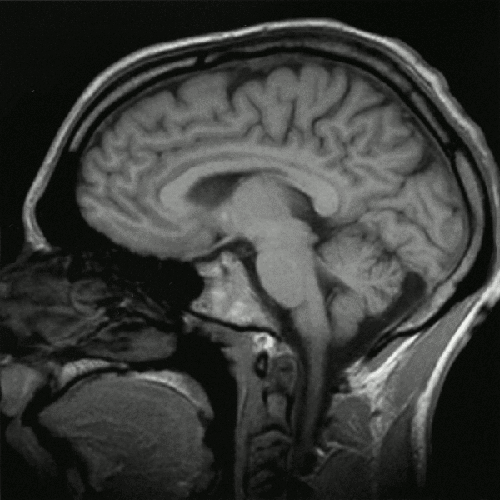
Canto XVI da Ilíada de Homero (tradução de Odorico Mendes) – 26/07/2007 – Curitiba/Brasil – com Richard Rebelo

Canto XVI da Ilíada, na tradução de Odorico Mendes
com Richard Rebelo
Direção: Octávio Camargo
26/07/2007 (quinta-feira) 20h

Local: ACT – Ateliê de Criação Teatral
R. Paulo Graeser Sobrinho, 305
São Francisco – Cep: 80510-170
Curitiba – Paraná – Brasil
Fones: 41.3338 0450 / 3338 6189
E-mail: act.atelie@uol.com.br

Ensaio realizado em 22/07/2007
Fotos: Mathieu Bertrand Struck
Licensed under CC-BY-SA
Bons Augúrios para o Bom Retiro
LôÉpique aux Tropiques

LA GLOIRE DôAGAMEMNON
Statue du Baron du Rio Branco, Place Generoso Marques, Curitiba, Brésil, 2006.
LôIliade dôHomí¨re, Chant I.
Traduction dôOdorico Mendes (Brésil, 1799-1864).Tournée européenne de la compagnie de théatre Iliadahomero, en mai-juin 2007. Avec Claudete Pereira JORGE et direction dôOctavio CAMARGO.
Au départ: Thessaloniki (pendant la Thessaloniki Biennale of Contemporary Art), Skopje, Istambul, Sofia, München, Lisbonne, Porto…
Dôautres villes dôEurope peuvent contacter la compagnie (pour le séjour de mai 2007 ou de futures tournées), pour vérifier la possibilité dôune présentation. Pour cela, écrire au directeur Mr. Octávio CAMARGO ou directement í la compagnie.
Le fichier pdf qui suit au dessous est un court essai a propos du travail et de la tournée de la compagnie Iliadahomero (illustré avec les photos de la dernií¨re présentation de Me. JORGE í Curitiba avant le départ de la compagnie). Ces images sont en domaine public et disponibles pour impression 20cm x 30cm ici.
Le fichier pdf contient aussi un court éssai photographique de la ville de Curitiba (qui héberge Iliadahomero depuis 1999) inspiré dans la thématique dôHomére. Les photos de cet essai sont sous licence Creative Commons CC-BY-SA 2.0, ainsi que le texte de lôéssai proprement dit. Veuillez consulter lôauteur pour dôautres usages.
Dave Bowman: What’s the problem?
HAL: I think you know what the problem is just as well as I do.
Download this pdf directly here.
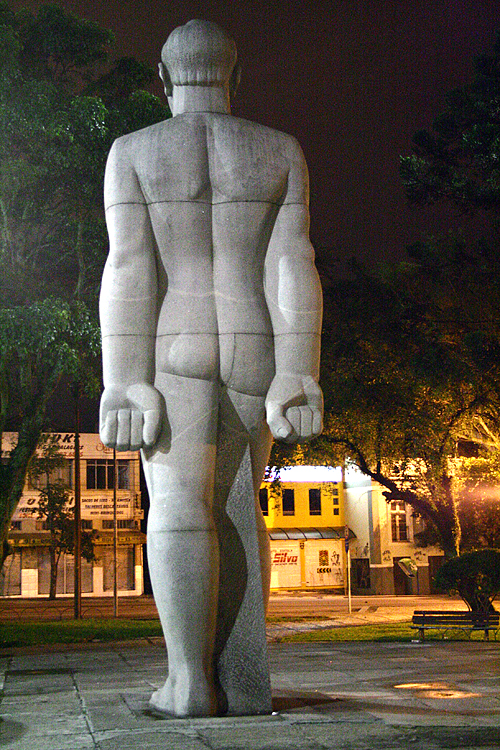
LôABANDON DôACHILLE
Statue de lôHomme Nu, 2007
Erbo STENZEL (Centénaire de lôÉtat du Paraná, 1853-1953)
A Intenção e o Princípio

Ilíada, Canto I, por Claudete Pereira Jorge, em direção de Octávio Camargo.
Photomontage: Mathieu Struck
Domínio Público/Public Domain/Úí¿í¹í½ÃÅ? úÃâ??í®üí±
O Vermelho, o Negro e os primeiros 248 versos – Canto I da Ilíada de Homero e Odorico Mendes (por Claudete Pereira Jorge e Octávio Camargo – 14/05/2007)

Apresentação do Canto I da Ilíada, na tradução de Odorico Mendes.
Realização: Companhia Iliadahomero.
Com Claudete Pereira Jorge.
Direção: Octavio Camargo.
Vila de 25ú25’04 S 49ú14’30, 14 de maio de 2007.

Photos: Mathieu Struck
(Released by the author on Public Domain/Domínio Público/Úí¿í¹í½ÃÅ? úÃâ??í®üí± – This applies worldwide)
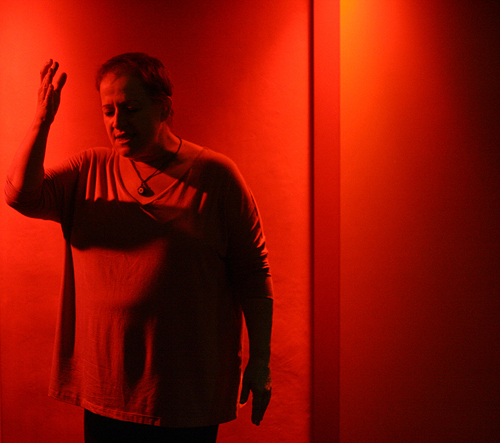
Ã?Å?á¿â? í½í¹í½ á¼â??õí¹ôõ, í¸õí¬, í í·í»í·í¹í¬ôõÃâ?° á¼Ë?Ãâ?¡í¹í»Ã¡Â¿â? í¿Ãâ??
í¿Ã¡Â½Âí»í¿üíí½í·í½, á¼£ üÃâ?¦ÃÂí¯Ã¢â?¬â?¢ á¼Ë?Ãâ?¡í±í¹í¿Ã¡Â¿â??Ãâ?? á¼â??í»óõââ?¬â?¢ á¼â?í¸í·úõ,
Ãâ?¬í¿í»í»Ã¡Â½Â°Ãâ?? ôââ?¬â?¢ á¼°Ãâ? í¸í¯üí¿Ãâ?¦Ãâ?? ÃË?Ãâ?¦Ãâ?¡Ã¡Â½Â°Ãâ?? á¼Å?ÃÅ ôí¹ Ãâ?¬ÃÂí¿Ã¡Â¿â??í±ÃË?õí½
ἡÃÂÃŽÃâ?°í½, í±Ã¡Â½ÂÃâ??í¿Ã¡Â½ÂºÃâ?? ôá½² á¼â??í»ÃŽÃÂí¹í± Ãâ??õῦÃâ?¡õ úÃÂí½õÃÆ?ÃÆ?í¹í½
í¿Ã¡Â¼Â°Ãâ?°í½í¿Ã¡Â¿â??ÃÆ?í¯ Ãâ??õ Ãâ?¬Ã¡Â¾Â¶ÃÆ?í¹í· Ã?â?í¹Ã¡Â½Â¸Ãâ?? ôââ?¬â?¢ á¼ÂÃâ??õí»õí¯õÃâ??í¿ í²í¿Ãâ?¦í»í®í· 5
á¼Âí¾ í¿Ã¡Â½â?? ôá½´ Ãâ??á½° Ãâ?¬ÃÂῶÃâ??í± ôí¹í±ÃÆ?Ãâ??í®Ãâ??í·í½ á¼ÂÃÂí¯ÃÆ?í±í½Ãâ??õ
á¼Ë?Ãâ??ÃÂõíôí·Ãâ?? Ãâ??õ á¼â??í½í±í¾ á¼â?¬í½ôÃÂÃ¡Â¿Â¶í½ úí±Ã¡Â½Â¶ ôá¿â??í¿Ãâ?? á¼Ë?Ãâ?¡í¹í»í»õÃÂÃâ??.
í¤í¯Ãâ?? Ãâ??í¬Ã ÃÆ?Ãâ? Ãâ?°õ í¸õÃ¡Â¿Â¶í½ Ã¡Â¼â?ÃÂí¹ôí¹ í¾Ãâ?¦í½íí·úõ üí¬Ãâ?¡õÃÆ?í¸í±í¹;
Ã?â?ºí·Ãâ??í¿Ã¡Â¿Â¦Ãâ?? úí±Ã¡Â½Â¶ Ã?â?í¹Ã¡Â½Â¸Ãâ?? Ãâ?¦Ã¡Â¼Â±ÃÅ?Ãâ??í· Ã¡Â½Æ? óὰàí²í±ÃÆ?í¹í»Ã¡Â¿â? í¹ Ãâ?¡í¿í»Ãâ?°í¸õὶÃâ??
í½í¿Ã¡Â¿Â¦ÃÆ?í¿í½ á¼â?¬í½Ã¡Â½Â° ÃÆ?Ãâ??ÃÂí±Ãâ??Ã¡Â½Â¸í½ Ã¡Â½Â¦ÃÂÃÆ?õ úí±úí®í½, á½â?¬í»íúí¿í½Ãâ??í¿ ôá½² í»í±í¿í¯, 10
í¿Ã¡Â½â?¢í½õúí± Ãâ??Ã¡Â½Â¸í½ çÃÂÃÂÃÆ?í·í½ á¼ Ãâ??í¯üí±ÃÆ?õí½ Ã¡Â¼â?¬ÃÂí·Ãâ??á¿â? ÃÂí±
á¼Ë?Ãâ??ÃÂõíôí·Ãâ??í· Ã¡Â½Æ? óὰàἦí»í¸õ í¸í¿Ã¡Â½Â°Ãâ?? á¼ÂÃâ?¬Ã¡Â½Â¶ í½Ã¡Â¿â? í±Ãâ?? á¼Ë?Ãâ?¡í±í¹Ã¡Â¿Â¶í½
í»Ãâ?¦ÃÆ?ÃÅ?üõí½ÃÅ?Ãâ?? Ãâ??õ í¸ÃÂóí±Ãâ??ÃÂí± Ãâ? íÃÂÃâ?°í½ Ãâ??ââ?¬â?¢ á¼â?¬Ãâ?¬õÃÂõí¯ÃÆ?í¹Ã¢â?¬â?¢ á¼â??Ãâ?¬í¿í¹í½í±,
ÃÆ?Ãâ??íüüí±Ãâ??’ á¼â?Ãâ?¡Ãâ?°í½ á¼Âí½ Ãâ?¡õÃÂÃÆ?Ã¡Â½Â¶í½ Ã¡Â¼â??úí·í²ÃÅ?í»í¿Ãâ?¦ á¼Ë?Ãâ?¬ÃÅ?í»í»Ãâ?°í½í¿Ãâ??
Ãâ?¡ÃÂÃâ?¦ÃÆ?íῳ á¼â?¬í½Ã¡Â½Â° ÃÆ?úí®Ãâ?¬Ãâ??ÃÂῳ, úí±Ã¡Â½Â¶ í»í¯ÃÆ?ÃÆ?õÃâ??í¿ Ãâ?¬í¬í½Ãâ??í±Ãâ?? á¼Ë?Ãâ?¡í±í¹í¿ÃÂÃâ??, 15
á¼Ë?Ãâ??ÃÂõá¿â??ôí± ôá½² üí¬í»í¹ÃÆ?Ãâ??í± ôÃÂÃâ?°, úí¿ÃÆ?üí®Ãâ??í¿ÃÂõ í»í±Ã¡Â¿Â¶í½í·
í« Ã¡Â¼Ë?Ãâ??ÃÂõá¿â??ôí±í¹ Ãâ??õ úí±Ã¡Â½Â¶ á¼â??í»í»í¿í¹ á¼ÂÃâ?¹úí½í®üí¹ôõÃâ?? á¼Ë?Ãâ?¡í±í¹í¿í¯,
á½â??üá¿â??í½ üÃ¡Â½Â²í½ í¸õí¿Ã¡Â½Â¶ ôí¿Ã¡Â¿â??õí½ Ã¡Â½Ë?í»ÃÂüÃâ?¬í¹í± ôÃŽüí±Ãâ??ââ?¬â?¢ á¼â?Ãâ?¡í¿í½Ãâ??õÃâ??
á¼ÂúÃâ?¬íÃÂÃÆ?í±í¹ í ÃÂí¹í¬üí¿í¹í¿ Ãâ?¬ÃÅ?í»í¹í½, õá½â?? ôââ?¬â?¢ í¿Ã¡Â¼Â´úí±ôââ?¬â?¢ á¼±úíÃÆ?í¸í±í¹í·
Ãâ?¬í±Ã¡Â¿â??ôí± ô’ á¼Âüí¿Ã¡Â½Â¶ í»ÃÂÃÆ?í±í¹Ãâ??õ Ãâ? í¯í»í·í½, Ãâ??á½° ôââ?¬â?¢ á¼â??Ãâ?¬í¿í¹í½í± ôíÃâ?¡õÃÆ?í¸í±í¹, 20
á¼Âí¶ÃÅ?üõí½í¿í¹ Ã?â?í¹Ã¡Â½Â¸Ãâ?? Ãâ?¦Ã¡Â¼Â±Ã¡Â½Â¸í½ á¼â??úí·í²ÃÅ?í»í¿í½ á¼Ë?Ãâ?¬ÃÅ?í»í»Ãâ?°í½í±. í»
á¼Å?í½í¸’ á¼â??í»í»í¿í¹ üÃ¡Â½Â²í½ Ãâ?¬í¬í½Ãâ??õÃâ?? á¼ÂÃâ?¬õÃâ?¦Ãâ? í®üí·ÃÆ?í±í½ á¼Ë?Ãâ?¡í±í¹í¿Ã¡Â½Â¶
í±Ã¡Â¼Â°ôõá¿â??ÃÆ?í¸í±í¯ í¸Ã¢â?¬â?¢ á¼±õÃÂá¿â? í± úí±Ã¡Â½Â¶ á¼â?¬óí»í±Ã¡Â½Â° ôíÃâ?¡í¸í±í¹ á¼â??Ãâ?¬í¿í¹í½í±í·
á¼â?¬í»í»’ í¿Ã¡Â½Âú á¼Ë?Ãâ??ÃÂõíôá¿Æ? á¼Ë?óí±üíüí½í¿í½í¹ á¼¥í½ôí±í½õ í¸Ãâ?¦üá¿·,
á¼â?¬í»í»Ã¡Â½Â° úí±úῶÃâ?? á¼â?¬Ãâ? í¯õí¹, úÃÂí±Ãâ??õÃÂÃ¡Â½Â¸í½ ôââ?¬â?¢ á¼ÂÃâ?¬Ã¡Â½Â¶ üῦí¸í¿í½ á¼â?Ãâ??õí»í»õí· 25
í« Ã?Å?í® ÃÆ?õ, óíÃÂí¿í½ úí¿í¯í»Ã¡Â¿Æ?ÃÆ?í¹í½ á¼Âóá½¼ Ãâ?¬í±ÃÂá½° í½í·Ãâ?¦ÃÆ?ὶ úí¹Ãâ?¡õí¯Ãâ?°
á¼¢ í½Ã¡Â¿Â¦í½ ôí·í¸ÃÂí½í¿í½Ãâ??ââ?¬â?¢ á¼¢ á½â?¢ÃÆ?Ãâ??õÃÂí¿í½ í±Ã¡Â½â??Ãâ??í¹Ãâ?? á¼°ÃÅ?í½Ãâ??í±,
üí® í½Ã Ãâ??í¿í¹ í¿Ã¡Â½Â Ãâ?¡ÃÂí±í¯ÃÆ?üá¿Æ? ÃÆ?úá¿â? Ãâ?¬Ãâ??ÃÂí¿í½ úí±Ã¡Â½Â¶ ÃÆ?Ãâ??íüüí± í¸õí¿Ã¡Â¿â??í¿í·
Ãâ??Ã¡Â½Â´í½ ôââ?¬â?¢ á¼Âóá½¼ í¿Ã¡Â½Â í»ÃÂÃÆ?Ãâ?°í· Ãâ?¬ÃÂí¯í½ üí¹í½ úí±Ã¡Â½Â¶ óá¿â? ÃÂí±Ãâ?? á¼â?Ãâ?¬õí¹ÃÆ?í¹í½
ἡüõÃâ??íÃÂῳ á¼Âí½Ã¡Â½Â¶ í¿Ã¡Â¼Â´úῳ á¼Âí½ Ã¡Â¼Å?ÃÂóõÃÅ , Ãâ??í·í»ÃÅ?í¸í¹ Ãâ?¬í¬Ãâ??ÃÂí·Ãâ??, 30
á¼±ÃÆ?Ãâ??Ã¡Â½Â¸í½ Ã¡Â¼ÂÃâ?¬í¿í¹Ãâ?¡í¿üíí½í·í½ úí±Ã¡Â½Â¶ á¼ÂüÃ¡Â½Â¸í½ í»íÃâ?¡í¿Ãâ?? á¼â?¬í½Ãâ??í¹ÃÅ?Ãâ?°ÃÆ?í±í½í·
á¼â?¬í»í»Ã¢â?¬â?¢ á¼´í¸í¹ üí® üââ?¬â?¢ á¼ÂÃÂíí¸í¹í¶õ, ÃÆ?í±ÃŽÃâ??õÃÂí¿Ãâ?? á½¥Ãâ?? úõ í½íí·í±í¹. í»

ὫÃâ?? á¼â?Ãâ? í±Ãâ??ââ?¬â?¢í· á¼â?ôõí¹ÃÆ?õí½ ôââ?¬â?¢ á½ óíÃÂÃâ?°í½ úí±Ã¡Â½Â¶ á¼ÂÃâ?¬õí¯í¸õÃâ??í¿ üÃÂí¸Ã¡Â¿Â³í·
í²Ã¡Â¿â? ôââ?¬â?¢ á¼â?¬úíÃâ?°í½ Ãâ?¬í±ÃÂá½° í¸Ã¡Â¿â??í½í± Ãâ?¬í¿í»Ãâ?¦Ãâ? í»í¿í¯ÃÆ?í²í¿í¹í¿ í¸í±í»í¬ÃÆ?ÃÆ?í·Ãâ??í·
Ãâ?¬í¿í»í»Ã¡Â½Â° ôââ?¬â?¢ á¼â?Ãâ?¬õí¹Ãâ??ââ?¬â?¢ á¼â?¬Ãâ?¬í¬í½õÃâ?¦í¸õ úí¹Ã¡Â½Â¼í½ á¼ ÃÂᾶí¸Ã¢â?¬â?¢ á½ óõÃÂí±í¹Ã¡Â½Â¸Ãâ?? 35
á¼Ë?Ãâ?¬ÃÅ?í»í»Ãâ?°í½í¹ á¼â??í½í±úÃâ??í¹, Ãâ??Ã¡Â½Â¸í½ Ã¡Â¼Â ÃÂúí¿üí¿Ãâ?? Ãâ??íúõ Ã?â?ºí·Ãâ??ÃŽí·
í« Úí»Ã¡Â¿Â¦í¸í¯ üõÃâ?¦, á¼Ë?ÃÂóÃâ?¦ÃÂÃÅ?Ãâ??í¿í¾Ã¢â?¬â?¢, á½Æ?Ãâ?? çÃÂÃÂÃÆ?í·í½ á¼â?¬üÃâ? í¹í²íí²í·úí±Ãâ??
Úí¯í»í»í¬í½ Ãâ??õ í¶í±í¸íí·í½ í¤õí½íôí¿í¹ÃÅ? Ãâ??õ ἶÃâ? í¹ Ã¡Â¼â?¬í½í¬ÃÆ?ÃÆ?õí¹Ãâ??,
ãüí¹í½í¸õῦ, õá¼´ Ãâ?¬í¿Ãâ??í Ãâ??í¿í¹ Ãâ?¡í±ÃÂí¯õí½Ãâ??ââ?¬â?¢ á¼ÂÃâ?¬Ã¡Â½Â¶ í½í·Ã¡Â½Â¸í½ á¼â?ÃÂõÃË?í±,
á¼¢ õá¼° ôí® Ãâ?¬í¿Ãâ??í Ãâ??í¿í¹ úí±Ãâ??á½° Ãâ?¬í¯í¿í½í± üí·ÃÂí¯Ã¢â?¬â?¢ á¼â?úí·í± 40
Ãâ??í±ÃÂÃÂÃâ?°í½ á¼ ôââ?¬â?¢ í±Ã¡Â¼Â°óῶí½, Ãâ??ὸôõ üí¿í¹ úÃÂí®í·í½í¿í½ á¼Âíí»ôÃâ?°ÃÂí·
Ãâ??í¯ÃÆ?õí¹í±í½ Ã?â?í±í½í±í¿Ã¡Â½Â¶ á¼Âüá½° ôí¬úÃÂÃâ?¦í± ÃÆ?í¿Ã¡Â¿â??ÃÆ?í¹ í²íí»õÃÆ?ÃÆ?í¹í½. í»
ὫÃâ?? á¼â?Ãâ? í±Ãâ??ââ?¬â?¢ õá½ÂÃâ?¡ÃÅ?üõí½í¿Ãâ??, Ãâ??í¿Ã¡Â¿Â¦ ôââ?¬â?¢ á¼â?úí»Ãâ?¦õ í¦í¿Ã¡Â¿â??í²í¿Ãâ?? á¼Ë?Ãâ?¬ÃÅ?í»í»Ãâ?°í½,
í²Ã¡Â¿â? ôá½² úí±Ãâ??ââ?¬â?¢ Ã?Ÿá½Âí»ÃÂüÃâ?¬í¿í¹í¿ úí±ÃÂí®í½Ãâ?°í½ Ãâ?¡Ãâ?°ÃÅ?üõí½í¿Ãâ?? úá¿â? ÃÂ,
Ãâ??ÃÅ?í¾Ã¢â?¬â?¢ ὤüí¿í¹ÃÆ?í¹í½ á¼â?Ãâ?¡Ãâ?°í½ á¼â?¬üÃâ? í·ÃÂõÃâ? íí± Ãâ??õ Ãâ? í±ÃÂíÃâ??ÃÂí·í½í· 45
á¼â?úí»í±óí¾í±í½ ôââ?¬â?¢ á¼â??ÃÂââ?¬â?¢ á½â?¬í¹ÃÆ?Ãâ??í¿Ã¡Â½Â¶ á¼ÂÃâ?¬Ã¢â?¬â?¢ ὤüÃâ?°í½ Ãâ?¡Ãâ?°í¿üíí½í¿í¹í¿,
í±Ã¡Â½ÂÃâ??í¿Ã¡Â¿Â¦ úí¹í½í·í¸íí½Ãâ??í¿Ãâ??í· Ã¡Â½Â ôââ?¬â?¢ ἤí¹õ í½Ãâ?¦úÃâ??ὶ á¼Âí¿í¹úÃŽÃâ??í·
á¼â?¢í¶õÃâ??ââ?¬â?¢ á¼â?Ãâ?¬õí¹Ãâ??ââ?¬â?¢ á¼â?¬Ãâ?¬í¬í½õÃâ?¦í¸õ í½õῶí½, üõÃâ??á½° ôââ?¬â?¢ Ã¡Â¼Â°Ã¡Â½Â¸í½ Ã¡Â¼â?¢í·úõí·
ôõí¹í½Ã¡Â½Â´ ôá½² úí»í±óóá½´ óíí½õÃâ??ââ?¬â?¢ á¼â?¬ÃÂóÃâ?¦ÃÂíí¿í¹í¿ í²í¹í¿Ã¡Â¿â??í¿í·
í¿Ã¡Â½ÂÃÂá¿â? í±Ãâ?? üÃ¡Â½Â²í½ Ãâ?¬ÃÂῶÃâ??í¿í½ á¼ÂÃâ?¬Ã¡Â¿Â´Ãâ?¡õÃâ??í¿ úí±Ã¡Â½Â¶ úÃÂí½í±Ãâ?? á¼â?¬ÃÂóí¿ÃÂÃâ??, 50
í±Ã¡Â½ÂÃâ??ὰàá¼â?Ãâ?¬õí¹Ãâ??ââ?¬â?¢ í±Ã¡Â½ÂÃâ??í¿Ã¡Â¿â??ÃÆ?í¹ í²íí»í¿Ãâ?? á¼ÂÃâ?¡õÃâ?¬õÃâ?¦úá½²Ãâ?? á¼ÂÃâ? í¹õὶÃâ??
í²í¬í»í»Ã¢â?¬â?¢í· í±Ã¡Â¼Â°õὶ ôá½² Ãâ?¬Ãâ?¦ÃÂí±Ã¡Â½Â¶ í½õúÃÂÃâ?°í½ úí±í¯í¿í½Ãâ??í¿ í¸í±üõí¹í±í¯.
á¼Ë?í½í½Ã¡Â¿â? üí±Ã üÃ¡Â½Â²í½ Ã¡Â¼â?¬í½Ã¡Â½Â° ÃÆ?Ãâ??ÃÂí±Ãâ??Ã¡Â½Â¸í½ Ã¡Â¾Â¤Ãâ?¡õÃâ??í¿ úá¿â? í»í± í¸õí¿Ã¡Â¿â??í¿,
Ãâ??á¿â?¡ ôõúí¬Ãâ??á¿Æ? ô’ á¼â?¬óí¿ÃÂÃ¡Â½Â´í½ ôá½² úí±í»íÃÆ?ÃÆ?í±Ãâ??í¿ í»í±Ã¡Â½Â¸í½ á¼Ë?Ãâ?¡í¹í»í»õÃÂÃâ??í·
Ãâ??á¿· óὰàá¼ÂÃâ?¬Ã¡Â½Â¶ Ãâ? ÃÂõÃÆ?ὶ í¸Ã¡Â¿â? úõ í¸õá½° í»õÃâ?¦úÃŽí»õí½í¿Ãâ?? á¼ÂÃÂí·í· 55
úí®ôõÃâ??í¿ óὰàÃ?â?í±í½í±Ã¡Â¿Â¶í½, á½â?¦Ãâ??í¹ Ã¡Â¿Â¥í± í¸í½í®ÃÆ?úí¿í½Ãâ??í±Ãâ?? á½ÂÃÂᾶÃâ??í¿í·
í¿Ã¡Â¼Â³ ôââ?¬â?¢ á¼ÂÃâ?¬õὶ í¿Ã¡Â½â??í½ Ã¡Â¼Â¤óõÃÂí¸õí½ Ã¡Â½Âüí·óõÃÂíõÃâ?? Ãâ??ââ?¬â?¢ á¼Âóíí½í¿í½Ãâ??í¿,
Ãâ??í¿Ã¡Â¿â??ÃÆ?í¹ ôââ?¬â?¢ á¼â?¬í½í¹ÃÆ?Ãâ??í¬üõí½í¿Ãâ?? üõÃâ??íÃâ? í· Ãâ?¬ÃÅ?ôí±Ãâ?? á½ úὺÃâ?? á¼Ë?Ãâ?¡í¹í»í»õÃÂÃâ??í·
í« Ã¡Â¼Ë?Ãâ??ÃÂõá¿â??ôí·, í½Ã¡Â¿Â¦í½ á¼â??üüõ Ãâ?¬í±í»í¹üÃâ?¬í»í±óÃâ?¡í¸íí½Ãâ??í±Ãâ?? á½â?¬í¯Ãâ?°
á¼â??ÃË? á¼â?¬Ãâ?¬í¿í½í¿ÃÆ?Ãâ??í®ÃÆ?õí¹í½, õá¼´ úõí½ í¸í¬í½í±Ãâ??ÃÅ?í½ óõ Ãâ? ÃÂóí¿í¹üõí½, 60
õá¼° ôá½´ á½Âüí¿Ã¡Â¿Â¦ Ãâ?¬ÃÅ?í»õüÃÅ?Ãâ?? Ãâ??õ ôí±üá¾· úí±Ã¡Â½Â¶ í»í¿í¹üὸÃâ?? á¼Ë?Ãâ?¡í±í¹í¿ÃÂÃâ??í·
á¼â?¬í»í»Ã¢â?¬â?¢ á¼â??óõ ôí® Ãâ??í¹í½í± üí¬í½Ãâ??í¹í½ á¼ÂÃÂõí¯í¿üõí½ Ã¡Â¼Â¢ á¼±õÃÂá¿â? í±,
á¼¢ úí±Ã¡Â½Â¶ á½â?¬í½õí¹ÃÂí¿Ãâ?¬ÃÅ?í»í¿í½, úí±Ã¡Â½Â¶ óí¬Ã Ãâ??ââ?¬â?¢ á½â??í½í±Ã á¼Âú Ã?â?í¹ÃÅ?Ãâ?? á¼ÂÃÆ?Ãâ??í¹í½,
á½â?¦Ãâ?? úââ?¬â?¢ õá¼´Ãâ?¬í¿í¹ á½â?¦ Ãâ??í¹ Ãâ??ÃÅ?ÃÆ?ÃÆ?í¿í½ á¼ÂÃâ?¡ÃŽÃÆ?í±Ãâ??í¿ í¦í¿Ã¡Â¿â??í²í¿Ãâ?? á¼Ë?Ãâ?¬ÃÅ?í»í»Ãâ?°í½,
õá¼´ Ãâ??í±Ã á½â?¦ óââ?¬â?¢ õá½ÂÃâ?¡Ãâ?°í»Ã¡Â¿â? Ãâ?? á¼ÂÃâ?¬í¹üíüÃâ? õÃâ??í±í¹ á¼ ôââ?¬â?¢ á¼â??úí±Ãâ??ÃÅ?üí²í·Ãâ??, 65
í±Ã¡Â¼Â´ úíí½ Ãâ?¬Ãâ?°Ãâ?? á¼â?¬ÃÂí½Ã¡Â¿Â¶í½ úí½í¯ÃÆ?í·Ãâ?? í±Ã¡Â¼Â°óÃ¡Â¿Â¶í½ Ãâ??õ Ãâ??õí»õí¯Ãâ?°í½
í²í¿ÃÂí»õÃâ??í±í¹ á¼â?¬í½Ãâ??í¹í¬ÃÆ?í±Ãâ?? ἡüá¿â??í½ Ã¡Â¼â?¬Ãâ?¬Ã¡Â½Â¸ í»í¿í¹óÃ¡Â½Â¸í½ Ã¡Â¼â?¬üῦí½í±í¹. í»

ἬÃâ??í¿í¹ á½â?¦ óââ?¬â?¢ á½£Ãâ?? õá¼°Ãâ?¬Ã¡Â½Â¼í½ úí±Ãâ??ââ?¬â?¢ á¼â??ÃÂââ?¬â?¢ á¼â?¢í¶õÃâ??í¿í· Ãâ??í¿Ã¡Â¿â??ÃÆ?í¹ ôââ?¬â?¢ á¼â?¬í½íÃÆ?Ãâ??í·
Úí¬í»Ãâ?¡í±Ãâ?? Ã?Ë?õÃÆ?Ãâ??í¿ÃÂí¯ôí·Ãâ??, í¿Ã¡Â¼Â°Ãâ?°í½í¿Ãâ?¬ÃÅ?í»Ãâ?°í½ á½â??Ãâ?¡Ã¢â?¬â?¢ á¼â??ÃÂí¹ÃÆ?Ãâ??í¿Ãâ??,
á½Æ?Ãâ?? á¾â?ôí· Ãâ??í¬ Ãâ??ââ?¬â?¢ á¼ÂÃÅ?í½Ãâ??í± Ãâ??í¬ Ãâ??ââ?¬â?¢ á¼ÂÃÆ?ÃÆ?ÃÅ?üõí½í± Ãâ?¬ÃÂÃÅ? Ãâ??ââ?¬â?¢ á¼ÂÃÅ?í½Ãâ??í±, 70
úí±Ã¡Â½Â¶ í½í®õÃÆ?ÃÆ?ââ?¬â?¢ ἡóí®ÃÆ?í±Ãâ??ââ?¬â?¢ á¼Ë?Ãâ?¡í±í¹Ã¡Â¿Â¶í½ á¼¼í»í¹í¿í½ õá¼´ÃÆ?Ãâ?°
Ã¡Â¼Â£í½ ôí¹Ã¡Â½Â° üí±í½Ãâ??í¿ÃÆ?ÃÂí½í·í½, Ãâ??í®í½ í¿Ã¡Â¼Â± Ãâ?¬ÃÅ?ÃÂõ í¦í¿Ã¡Â¿â??í²í¿Ãâ?? á¼Ë?Ãâ?¬ÃÅ?í»í»Ãâ?°í½í·
á½â?¦ ÃÆ?Ãâ? í¹í½ á¼Âὺ Ãâ? ÃÂí¿í½íÃâ?°í½ á¼â?¬óí¿ÃÂí®ÃÆ?í±Ãâ??í¿ úí±Ã¡Â½Â¶ üõÃâ??íõí¹Ãâ?¬õí½í·
í« Ã¡Â½Â® á¼Ë?Ãâ?¡í¹í»õῦ, úíí»õí±í¯ üõ, Ã?â?í¹Ã¡Â¿â?? Ãâ? í¯í»õ, üÃâ?¦í¸í®ÃÆ?í±ÃÆ?í¸í±í¹
üá¿â? í½í¹í½ á¼Ë?Ãâ?¬ÃÅ?í»í»Ãâ?°í½í¿Ãâ?? á¼â??úí±Ãâ??í·í²õí»íÃâ??í±í¿ á¼â??í½í±úÃâ??í¿Ãâ??í· 75
Ãâ??í¿Ã¡Â½Â¶ óὰàá¼ÂóÃ¡Â½Â¼í½ Ã¡Â¼ÂÃÂíÃâ?°í· ÃÆ?ὺ ôá½² ÃÆ?ÃÂí½í¸õí¿ úí±í¯ üí¿í¹ á½â??üí¿ÃÆ?ÃÆ?í¿í½
ἦ üíí½ üí¿í¹ Ãâ?¬ÃÂÃÅ?Ãâ? ÃÂÃâ?°í½ á¼â?Ãâ?¬õÃÆ?í¹í½ úí±Ã¡Â½Â¶ Ãâ?¡õÃÂÃÆ?Ã¡Â½Â¶í½ Ã¡Â¼â?¬ÃÂí®í¾õí¹í½í·
ἦ óὰàá½â?¬í¯í¿üí±í¹ á¼â??í½ôÃÂí± Ãâ?¡í¿í»Ãâ?°ÃÆ?íüõí½, á½Æ?Ãâ?? üíóí± Ãâ?¬í¬í½Ãâ??Ãâ?°í½
á¼Ë?ÃÂóõí¯Ãâ?°í½ úÃÂí±Ãâ??íõí¹ úí±í¯ í¿Ã¡Â¼Â± Ãâ?¬õí¯í¸í¿í½Ãâ??í±í¹ á¼Ë?Ãâ?¡í±í¹í¿í¯í·
úÃÂõí¯ÃÆ?ÃÆ?Ãâ?°í½ óὰàí²í±ÃÆ?í¹í»õὺÃâ?? á½â?¦Ãâ??õ Ãâ?¡ÃŽÃÆ?õÃâ??í±í¹ á¼â?¬í½ôÃÂὶ Ãâ?¡íÃÂí·í¹í· 80
õá¼´ Ãâ?¬õàóí¬Ã Ãâ??õ Ãâ?¡ÃÅ?í»í¿í½ óõ úí±Ã¡Â½Â¶ í±Ã¡Â½ÂÃâ??á¿â? üí±Ã úí±Ãâ??í±Ãâ?¬íÃË?á¿Æ?,
á¼â?¬í»í»í¬ Ãâ??õ úí±Ã¡Â½Â¶ üõÃâ??ÃÅ?Ãâ?¬í¹ÃÆ?í¸õí½ Ã¡Â¼â?Ãâ?¡õí¹ úÃÅ?Ãâ??í¿í½, á½â??Ãâ? ÃÂí± Ãâ??õí»íÃÆ?ÃÆ?á¿Æ?,
á¼Âí½ ÃÆ?Ãâ??í®í¸õÃÆ?ÃÆ?í¹í½ á¼â??í¿Ã¡Â¿â??ÃÆ?í¹í· ÃÆ?ὺ ôá½² Ãâ? ÃÂí¬ÃÆ?í±í¹ õá¼´ üõ ÃÆ?í±ÃŽÃÆ?õí¹Ãâ??. í»
í¤Ã¡Â½Â¸í½ ôââ?¬â?¢ á¼â?¬Ãâ?¬í±üõí¹í²ÃÅ?üõí½í¿Ãâ?? Ãâ?¬ÃÂí¿ÃÆ?íÃâ? í· Ãâ?¬ÃÅ?ôí±Ãâ?? á½ úὺÃâ?? á¼Ë?Ãâ?¡í¹í»í»õÃÂÃâ??í·
í« Ã?Ë?í±ÃÂÃÆ?í®ÃÆ?í±Ãâ?? üí¬í»í± õá¼°Ãâ?¬Ã¡Â½Â² í¸õí¿Ãâ?¬ÃÂÃÅ?Ãâ?¬í¹í¿í½ á½â?¦ Ãâ??í¹ í¿Ã¡Â¼Â¶ÃÆ?í¸í±í· 85
í¿Ã¡Â½Â üá½° óὰàá¼Ë?Ãâ?¬ÃÅ?í»í»Ãâ?°í½í± Ã?â?í¹Ã¡Â¿â?? Ãâ? í¯í»í¿í½, ᾧ Ãâ??õ ÃÆ?ὺ, Úí¬í»Ãâ?¡í±í½,
õá½ÂÃâ?¡ÃÅ?üõí½í¿Ãâ?? Ã?â?í±í½í±í¿Ã¡Â¿â??ÃÆ?í¹ í¸õí¿Ãâ?¬ÃÂí¿Ãâ?¬í¯í±Ãâ?? á¼â?¬í½í±Ãâ? í±í¯í½õí¹Ãâ??,
í¿Ã¡Â½â? Ãâ??í¹Ãâ?? á¼Âüõῦ í¶Ã¡Â¿Â¶í½Ãâ??í¿Ãâ?? úí±Ã¡Â½Â¶ á¼ÂÃâ?¬Ã¡Â½Â¶ Ãâ?¡í¸í¿í½Ã¡Â½Â¶ ôõÃÂúí¿üíí½í¿í¹í¿
ÃÆ?í¿Ã¡Â½Â¶ úí¿í¯í»Ã¡Â¿Æ?Ãâ?? Ãâ?¬í±ÃÂá½° í½í·Ãâ?¦ÃÆ?ὶ í²í±ÃÂõí¯í±Ãâ?? Ãâ?¡õá¿â??ÃÂí±Ãâ?? á¼ÂÃâ?¬í¿í¯ÃÆ?õí¹
ÃÆ?Ãâ?¦üÃâ?¬í¬í½Ãâ??Ãâ?°í½ Ã?â?í±í½í±Ã¡Â¿Â¶í½, í¿Ã¡Â½Âôââ?¬â?¢ Ã¡Â¼Â¢í½ Ã¡Â¼Ë?óí±üíüí½í¿í½í± õá¼´Ãâ?¬Ã¡Â¿Æ?Ãâ??, 90
á½Æ?Ãâ?? í½Ã¡Â¿Â¦í½ Ãâ?¬í¿í»í»Ã¡Â½Â¸í½ á¼â??ÃÂí¹ÃÆ?Ãâ??í¿Ãâ?? á¼â??í½Ã¡Â½Â¶ ÃÆ?Ãâ??ÃÂí±Ãâ??á¿· õá½â?Ãâ?¡õÃâ??í±í¹ õἶí½í±í¹. í»
Úí±Ã¡Â½Â¶ Ãâ??ÃÅ?Ãâ??õ ôá½´ í¸í¬ÃÂÃÆ?í·ÃÆ?õ úí±Ã¡Â½Â¶ í·Ã¡Â½â?ôí± üí¬í½Ãâ??í¹Ãâ?? á¼â?¬üÃÂüÃâ?°í½í·
í« Ã?Ÿá½â? Ãâ??í±Ã á½â?¦ óââ?¬â?¢ õá½ÂÃâ?¡Ãâ?°í»Ã¡Â¿â? Ãâ?? á¼ÂÃâ?¬í¹üíüÃâ? õÃâ??í±í¹ í¿Ã¡Â½Âôââ?¬â?¢ á¼â??úí±Ãâ??ÃÅ?üí²í·Ãâ??,
á¼â?¬í»í»Ã¢â?¬â?¢ á¼â?¢í½õúââ?¬â?¢ á¼â?¬ÃÂí·Ãâ??á¿â? ÃÂí¿Ãâ??, á½Æ?í½ Ã¡Â¼Â Ãâ??í¯üí·ÃÆ?ââ?¬â?¢ á¼Ë?óí±üíüí½Ãâ?°í½,
í¿Ã¡Â½Âôââ?¬â?¢ á¼â?¬Ãâ?¬íí»Ãâ?¦ÃÆ?õ í¸ÃÂóí±Ãâ??ÃÂí± úí±Ã¡Â½Â¶ í¿Ã¡Â½Âú á¼â?¬Ãâ?¬õôíí¾í±Ãâ??ââ?¬â?¢ á¼â??Ãâ?¬í¿í¹í½í±í· 95
Ãâ??í¿Ã¡Â½â?í½õúââ?¬â?¢ á¼â??ÃÂââ?¬â?¢ á¼â??í»óõââ?¬â?¢ á¼â?ôÃâ?°úõí½ Ã¡Â¼â?¢úí·í²ÃÅ?í»í¿Ãâ?? á¼ ôââ?¬â?¢ á¼â?Ãâ??í¹ ôÃŽÃÆ?õí¹,
í¿Ã¡Â½Âôââ?¬â?¢ á½â?¦ óõ Ãâ?¬ÃÂÃ¡Â½Â¶í½ Ã?â?í±í½í±í¿Ã¡Â¿â??ÃÆ?í¹í½ á¼â?¬õí¹úíí± í»í¿í¹óÃ¡Â½Â¸í½ Ã¡Â¼â?¬Ãâ?¬ÃŽÃÆ?õí¹
Ãâ?¬ÃÂí¯í½ óââ?¬â?¢ á¼â?¬Ãâ?¬Ã¡Â½Â¸ Ãâ?¬í±Ãâ??ÃÂὶ Ãâ? í¯í»Ã¡Â¿Â³ ôÃÅ?üõí½í±í¹ á¼â??í»í¹úÃŽÃâ?¬í¹ôí± úí¿ÃÂÃÂí·í½
á¼â?¬Ãâ?¬ÃÂí¹í¬Ãâ??í·í½ á¼â?¬í½í¬Ãâ?¬í¿í¹í½í¿í½, á¼â??óõí¹í½ í¸Ã¢â?¬â?¢ á¼±õÃÂÃ¡Â½Â´í½ Ã¡Â¼â??úí±Ãâ??ÃÅ?üí²í·í½
á¼ÂÃâ?? çÃÂÃÂÃÆ?í·í½í· Ãâ??ÃÅ?Ãâ??õ úíí½ üí¹í½ á¼±í»í±ÃÆ?ÃÆ?í¬üõí½í¿í¹ Ãâ?¬õÃâ?¬í¯í¸í¿í¹üõí½. í» 100
ἬÃâ??í¿í¹ á½â?¦ ó’ á½£Ãâ?? õá¼°Ãâ?¬Ã¡Â½Â¼í½ úí±Ãâ??’ á¼â??ÃÂ’ á¼â?¢í¶õÃâ??í¿í· Ãâ??í¿Ã¡Â¿â??ÃÆ?í¹ ô’ á¼â?¬í½íÃÆ?Ãâ??í·
á¼¥ÃÂÃâ?°Ãâ?? á¼Ë?Ãâ??ÃÂõíôí·Ãâ?? õá½ÂÃÂὺ úÃÂõí¯Ãâ?°í½ á¼Ë?óí±üíüí½Ãâ?°í½
á¼â?¬Ãâ?¡í½ÃÂüõí½í¿Ãâ??í· üíí½õí¿Ãâ?? ôá½² üíóí± Ãâ? ÃÂíí½õÃâ?? á¼â?¬üÃâ? í¹üíí»í±í¹í½í±í¹
Ãâ?¬í¯üÃâ?¬í»í±í½Ãâ??’, á½â??ÃÆ?ÃÆ?õ ôí í¿Ã¡Â¼Â± Ãâ?¬Ãâ?¦ÃÂὶ í»í±üÃâ?¬õÃâ??ÃÅ?Ãâ?°í½Ãâ??í¹ Ã¡Â¼ÂíúÃâ??í·í½í·
Úí¬í»Ãâ?¡í±í½Ãâ??í± Ãâ?¬ÃÂÃŽÃâ??í¹ÃÆ?Ãâ??í± úí¬ú’ á½â?¬ÃÆ?ÃÆ?ÃÅ?üõí½í¿Ãâ?? Ãâ?¬ÃÂí¿ÃÆ?íõí¹Ãâ?¬õí· 105
í« Ã?Å?í¬í½Ãâ??í¹ úí±úÃ¡Â¿Â¶í½ í¿Ã¡Â½Â Ãâ?¬ÃŽ Ãâ?¬í¿Ãâ??í üí¿í¹ Ãâ??ὸ úÃÂí®óÃâ?¦í¿í½ õἶÃâ?¬í±Ãâ??í·
í±Ã¡Â¼Â°õí¯ Ãâ??í¿í¹ Ãâ??á½° úí¬ú’ á¼ÂÃÆ?Ãâ??ὶ Ãâ? í¯í»í± Ãâ? ÃÂõÃÆ?ὶ üí±í½Ãâ??õÃÂõÃÆ?í¸í±í¹,
á¼ÂÃÆ?í¸í»Ã¡Â½Â¸í½ ô’ í¿Ã¡Â½â?Ãâ??í Ãâ??í¯ Ãâ?¬Ãâ?° õἶÃâ?¬í±Ãâ?? á¼â?Ãâ?¬í¿Ãâ?? í¿Ã¡Â½â?Ãâ??’ á¼ÂÃâ??íí»õÃÆ?ÃÆ?í±Ãâ??í·
úí±Ã¡Â½Â¶ í½Ã¡Â¿Â¦í½ á¼Âí½ Ã?â?í±í½í±í¿Ã¡Â¿â??ÃÆ?í¹ í¸õí¿Ãâ?¬ÃÂí¿Ãâ?¬íÃâ?°í½ á¼â?¬óí¿ÃÂõÃÂõí¹Ãâ??
ὡÃâ?? ôá½´ Ãâ??í¿Ã¡Â¿Â¦ô’ á¼â?¢í½õúí¬ ÃÆ?Ãâ? í¹í½ á¼â??úí·í²ÃÅ?í»í¿Ãâ?? á¼â??í»óõí± Ãâ??õÃÂÃâ?¡õí¹, 110
í¿Ã¡Â½â?¢í½õú’ á¼Âóá½¼ úí¿ÃÂÃÂí·Ãâ?? çÃÂÃâ?¦ÃÆ?í·íôí¿Ãâ?? á¼â?¬óí»í¬’ á¼â??Ãâ?¬í¿í¹í½í±
í¿Ã¡Â½Âú á¼â?í¸õí»í¿í½ ôíí¾í±ÃÆ?í¸í±í¹, á¼ÂÃâ?¬õὶ Ãâ?¬í¿í»Ã¡Â½Âº í²í¿ÃÂí»í¿üí±í¹ í±Ã¡Â½ÂÃâ??á½´í½
í¿Ã¡Â¼Â´úí¿í¹ á¼â?Ãâ?¡õí¹í½í· úí±Ã¡Â½Â¶ óí¬ÃÂ Ã¡Â¿Â¥í± Úí»Ãâ?¦Ãâ??í±í¹üí½í®ÃÆ?Ãâ??ÃÂí·Ãâ?? Ãâ?¬ÃÂí¿í²íí²í¿Ãâ?¦í»í±
úí¿Ãâ?¦ÃÂí¹ôí¯í·Ãâ?? á¼â?¬í»ÃÅ?Ãâ?¡í¿Ãâ?¦, á¼ÂÃâ?¬õὶ í¿Ã¡Â½â? á¼â??í¸íí½ Ã¡Â¼ÂÃÆ?Ãâ??í¹ Ãâ?¡õÃÂõí¯Ãâ?°í½,
í¿Ã¡Â½Â ôíüí±Ãâ?? í¿Ã¡Â½Âôá½² Ãâ? Ãâ?¦í®í½, í¿Ã¡Â½â?Ãâ??’ á¼â??àÃâ? ÃÂíí½í±Ãâ?? í¿Ã¡Â½â?Ãâ??í Ãâ??í¹ Ã¡Â¼â?ÃÂóí±. 115
á¼â?¬í»í»Ã¡Â½Â° úí±Ã¡Â½Â¶ ὧÃâ?? á¼Âí¸íí»Ãâ?° ôÃÅ?üõí½í±í¹ Ãâ?¬í¬í»í¹í½ õá¼° Ãâ??ÃÅ? ó’ á¼â??üõí¹í½í¿í½í·
í²í¿ÃÂí»í¿ü’ á¼Âóá½¼ í»í±Ã¡Â½Â¸í½ ÃÆ?Ã¡Â¿Â¶í½ Ã¡Â¼â?üüõí½í±í¹ á¼¢ á¼â?¬Ãâ?¬í¿í»íÃÆ?í¸í±í¹í·
í±Ã¡Â½ÂÃâ??ὰàá¼Âüí¿Ã¡Â½Â¶ óíÃÂí±Ãâ?? í±Ã¡Â½ÂÃâ??í¯Ãâ?¡’ á¼â??Ãâ??í¿í¹üí¬ÃÆ?í±Ãâ??’ á½â??Ãâ? ÃÂí± üá½´ í¿Ã¡Â¼Â¶í¿Ãâ??
á¼Ë?ÃÂóõí¯Ãâ?°í½ á¼â?¬óíÃÂí±ÃÆ?Ãâ??í¿Ãâ?? á¼â?Ãâ?°, á¼ÂÃâ?¬õὶ í¿Ã¡Â½Âôá½² á¼â?í¿í¹úõí·
í»õÃÂÃÆ?ÃÆ?õÃâ??õ óὰàÃâ??ÃÅ? óõ Ãâ?¬í¬í½Ãâ??õÃâ?? á½â?¦ üí¿í¹ óíÃÂí±Ãâ?? á¼â?ÃÂÃâ?¡õÃâ??í±í¹ á¼â??í»í»Ã¡Â¿Æ?. í» 120

í¤Ã¡Â½Â¸í½ ô’ á¼ üõí¯í²õÃâ??’ á¼â?Ãâ?¬õí¹Ãâ??í± Ãâ?¬í¿ôí¬ÃÂúí·Ãâ?? ôá¿â??í¿Ãâ?? á¼Ë?Ãâ?¡í¹í»í»õÃÂÃâ??í·
í« Ã¡Â¼Ë?Ãâ??ÃÂõíôí· úÃÂôí¹ÃÆ?Ãâ??õ, Ãâ? í¹í»í¿úÃâ??õí±í½ÃŽÃâ??í±Ãâ??õ Ãâ?¬í¬í½Ãâ??Ãâ?°í½,
Ãâ?¬Ã¡Â¿Â¶Ãâ?? óí¬Ã Ãâ??í¿í¹ ôÃŽÃÆ?í¿Ãâ?¦ÃÆ?í¹ óíÃÂí±Ãâ?? üõóí¬í¸Ãâ?¦üí¿í¹ á¼Ë?Ãâ?¡í±í¹í¿í¯;
í¿Ã¡Â½Âôí Ãâ??í¯ Ãâ?¬í¿Ãâ?¦ á¼´ôüõí½ í¾Ãâ?¦í½í®ÃÅ í± úõí¯üõí½í± Ãâ?¬í¿í»í»í¬í·
á¼â?¬í»í»Ã¡Â½Â° Ãâ??á½° üÃ¡Â½Â²í½ Ãâ?¬í¿í»í¯Ãâ?°í½ á¼Âí¾õÃâ?¬ÃÂí¬í¸í¿üõí½, Ãâ??á½° ôíôí±ÃÆ?Ãâ??í±í¹, 125
í»í±í¿Ã¡Â½ÂºÃâ?? ô’ í¿Ã¡Â½Âú á¼ÂÃâ?¬íí¿í¹úõ Ãâ?¬í±í»í¯í»í»í¿óí± Ãâ??í±Ã¡Â¿Â¦Ãâ??’ á¼ÂÃâ?¬í±óõí¯ÃÂõí¹í½.
á¼â?¬í»í»Ã¡Â½Â° ÃÆ?ὺ üÃ¡Â½Â²í½ í½Ã¡Â¿Â¦í½ Ãâ??á¿â? í½ôõ í¸õá¿· Ãâ?¬ÃÂÃÅ?õÃâ??í· í±Ã¡Â½ÂÃâ??ὰàá¼Ë?Ãâ?¡í±í¹í¿Ã¡Â½Â¶
Ãâ??ÃÂí¹Ãâ?¬í»Ã¡Â¿â?¡ Ãâ??õÃâ??ÃÂí±Ãâ?¬í»Ã¡Â¿â?¡ Ãâ??’ á¼â?¬Ãâ?¬í¿Ãâ??õí¯ÃÆ?í¿üõí½, í±Ã¡Â¼Â´ úí Ãâ?¬í¿í¸í¹ ÂõὺÃâ??
ôá¿·ÃÆ?í¹ Ãâ?¬ÃÅ?í»í¹í½ í¤ÃÂí¿í¯í·í½ õá½ÂÃâ??õí¯Ãâ?¡õí¿í½ á¼Âí¾í±í»í±Ãâ?¬í¬í¾í±í¹. í»
í¤Ã¡Â½Â¸í½ ô’ á¼â?¬Ãâ?¬í±üõí¹í²ÃÅ?üõí½í¿Ãâ?? Ãâ?¬ÃÂí¿ÃÆ?íÃâ? í· úÃÂõí¯Ãâ?°í½ á¼Ë?óí±üíüí½Ãâ?°í½í· 130
í« Ã?Å?á½´ ô’ í¿Ã¡Â½â?¢Ãâ??Ãâ?°Ãâ?? á¼â?¬óí±í¸ÃÅ?Ãâ?? Ãâ?¬õàá¼ÂÃ¡Â½Â¼í½ í¸õí¿õí¯úõí»’ á¼Ë?Ãâ?¡í¹í»í»õῦ
úí»íÃâ?¬Ãâ??õ í½ÃÅ?ῳ, á¼ÂÃâ?¬õὶ í¿Ã¡Â½Â Ãâ?¬í±ÃÂõí»õÃÂÃÆ?õí±í¹ í¿Ã¡Â½Âôí üõ Ãâ?¬õí¯ÃÆ?õí¹Ãâ??.
ἦ á¼Âí¸íí»õí¹Ãâ?? á½â??Ãâ? ÃÂ’ í±Ã¡Â½ÂÃâ??ὸÃâ?? á¼â?Ãâ?¡Ã¡Â¿Æ?Ãâ?? óíÃÂí±Ãâ??, í±Ã¡Â½ÂÃâ??ὰàá¼â?ü’ í±Ã¡Â½â?Ãâ??Ãâ?°Ãâ??
ἧÃÆ?í¸í±í¹ ôõÃâ?¦ÃÅ?üõí½í¿í½, úíí»õí±í¹ ôí üõ Ãâ??á¿â? í½ô’ á¼â?¬Ãâ?¬í¿ôí¿Ã¡Â¿Â¦í½í±í¹;
á¼â?¬í»í»’ õá¼° üÃ¡Â½Â²í½ ôÃŽÃÆ?í¿Ãâ?¦ÃÆ?í¹ óíÃÂí±Ãâ?? üõóí¬í¸Ãâ?¦üí¿í¹ á¼Ë?Ãâ?¡í±í¹í¿Ã¡Â½Â¶ 135
á¼â??ÃÂÃÆ?í±í½Ãâ??õÃâ?? úí±Ãâ??á½° í¸Ãâ?¦üÃ¡Â½Â¸í½ Ã¡Â½â?¦Ãâ?¬Ãâ?°Ãâ?? á¼â?¬í½Ãâ??í¬í¾í¹í¿í½ á¼â?ÃÆ?Ãâ??í±í¹í·
õá¼° ôí úõ üá½´ ôÃŽÃâ?°ÃÆ?í¹í½ á¼Âóá½¼ ôí úõí½ í±Ã¡Â½ÂÃâ??ὸÃâ?? á¼â?¢í»Ãâ?°üí±í¹
á¼¢ Ãâ??õÃ¡Â½Â¸í½ Ã¡Â¼Â¢ Âá¼´í±í½Ãâ??í¿Ãâ?? Ã¡Â¼Â°Ã¡Â½Â¼í½ óíÃÂí±Ãâ??, á¼¢ á½Ë?ôÃâ?¦ÃÆ?á¿â? í¿Ãâ??
á¼â??í¾Ãâ?° á¼â??í»ÃŽí½í· á½Æ? ôí úõí½ úõÃâ?¡í¿í»ÃŽÃÆ?õÃâ??í±í¹ á½â?¦í½ úõí½ Ã¡Â¼ÂµúÃâ?°üí±í¹.
á¼Ë?í»í»’ ἤÃâ??í¿í¹ üÃ¡Â½Â²í½ Ãâ??í±Ã¡Â¿Â¦Ãâ??í± üõÃâ??í±Ãâ? ÃÂí±ÃÆ?ÃÅ?üõÃÆ?í¸í± úí±Ã¡Â½Â¶ í±Ã¡Â½â??Ãâ??í¹Ãâ??, 140
í½Ã¡Â¿Â¦í½ ô’ á¼â??óõ í½Ã¡Â¿â? í± üíí»í±í¹í½í±í½ á¼ÂÃÂÃÂÃÆ?ÃÆ?í¿üõí½ õá¼°Ãâ?? á¼â?¦í»í± ôá¿â??í±í½,
á¼Âí½ ô’ á¼ÂÃÂíÃâ??í±Ãâ?? á¼ÂÃâ?¬í¹Ãâ??í·ôá½²Ãâ?? á¼â?¬óõí¯ÃÂí¿üõí½, á¼ÂÃâ?? ô’ á¼â??úí±Ãâ??ÃÅ?üí²í·í½
í¸õí¯í¿üõí½, á¼â??í½ ô’ í±Ã¡Â½ÂÃâ??Ã¡Â½Â´í½ çÃÂÃâ?¦ÃÆ?í·íôí± úí±í»í»í¹Ãâ?¬í¬ÃÂá¿Æ?í¿í½
í²í®ÃÆ?í¿üõí½í· õá¼·Ãâ?? ôí Ãâ??í¹Ãâ?? á¼â?¬ÃÂÃâ?¡Ã¡Â½Â¸Ãâ?? á¼â?¬í½Ã¡Â½Â´Ã í²í¿Ãâ?¦í»í·Ãâ? ÃÅ?ÃÂí¿Ãâ?? á¼â?ÃÆ?Ãâ??Ãâ?°,
á¼¢ Âá¼´í±Ãâ?? á¼¢ Ἰôí¿üõí½õὺÃâ?? á¼¢ ôá¿â??í¿Ãâ?? á½Ë?ôÃâ?¦ÃÆ?ÃÆ?õὺÃâ?? 145
á¼ á½² ÃÆ?ὺ í í·í»õíôí· Ãâ?¬í¬í½Ãâ??Ãâ?°í½ á¼ÂúÃâ?¬í±óí»ÃÅ?Ãâ??í±Ãâ??’ á¼â?¬í½ôÃÂῶí½,
á½â??Ãâ? ÃÂ’ á¼¥üí¹í½ á¼â??úí¬õÃÂóí¿í½ á¼±í»í¬ÃÆ?ÃÆ?õí±í¹ á¼±õÃÂá½° á¿¥íí¾í±Ãâ??. í»
í¤Ã¡Â½Â¸í½ ô’ á¼â??ÃÂ’ á½â??Ãâ?¬ÃÅ?ôÃÂí± Ã¡Â¼Â°ôÃ¡Â½Â¼í½ Ãâ?¬ÃÂí¿ÃÆ?íÃâ? í· Ãâ?¬ÃÅ?ôí±Ãâ?? á½ úὺÃâ?? á¼Ë?Ãâ?¡í¹í»í»õÃÂÃâ??í·
í« Ã¡Â½Â¬ üí¿í¹, á¼â?¬í½í±í¹ôõí¯í·í½ á¼ÂÃâ?¬í¹õí¹üíí½õ úõÃÂôí±í»õÃÅ?Ãâ? ÃÂí¿í½
Ãâ?¬Ã¡Â¿Â¶Ãâ?? Ãâ??í¯Ãâ?? Ãâ??í¿í¹ Ãâ?¬ÃÂÃÅ?Ãâ? ÃÂÃâ?°í½ á¼â?Ãâ?¬õÃÆ?í¹í½ Ãâ?¬õí¯í¸í·Ãâ??í±í¹ á¼Ë?Ãâ?¡í±í¹Ã¡Â¿Â¶í½ 150
á¼¢ á½ÂôÃ¡Â½Â¸í½ Ã¡Â¼Âí»í¸íüõí½í±í¹ á¼¢ á¼â?¬í½ôÃÂí¬ÃÆ?í¹í½ ἶÃâ? í¹ üí¬Ãâ?¡õÃÆ?í¸í±í¹;
í¿Ã¡Â½Â óὰàá¼Âóá½¼ í¤ÃÂÃŽÃâ?°í½ á¼â?¢í½õú’ ἤí»Ãâ?¦í¸í¿í½ í±Ã¡Â¼Â°Ãâ?¡üí·Ãâ??í¬Ãâ?°í½
ôõῦÃÂí¿ üí±Ãâ?¡í·ÃÆ?ÃÅ?üõí½í¿Ãâ??, á¼ÂÃâ?¬õὶ í¿Ã¡Â½â? Ãâ??í¯ üí¿í¹ í±Ã¡Â¼Â´Ãâ??í¹í¿í¯ õá¼°ÃÆ?í¹í½í·
í¿Ã¡Â½Â óὰàÃâ?¬ÃŽÃâ?¬í¿Ãâ??’ á¼Âüá½°Ãâ?? í²í¿Ã¡Â¿Â¦Ãâ?? ἤí»í±ÃÆ?í±í½ í¿Ã¡Â½Âôá½² üÃ¡Â½Â²í½ Ã¡Â¼ÂµÃâ?¬Ãâ?¬í¿Ãâ?¦Ãâ??,
í¿Ã¡Â½Âôí Ãâ?¬í¿Ãâ??’ á¼Âí½ í¦í¸í¯Ã¡Â¿Æ? á¼ÂÃÂí¹í²ÃŽí»í±úí¹ í²Ãâ?°Ãâ??í¹í±í½õí¯ÃÂá¿Æ? 155
úí±ÃÂÃâ?¬Ã¡Â½Â¸í½ á¼Âôí·í»í®ÃÆ?í±í½Ãâ??’, á¼ÂÃâ?¬õὶ ἦ üí¬í»í± Ãâ?¬í¿í»í»Ã¡Â½Â° üõÃâ??í±í¾Ã¡Â½Âº
í¿Ã¡Â½â?ÃÂõí¬ Ãâ??õ ÃÆ?úí¹ÃÅ?õí½Ãâ??í± í¸í¬í»í±ÃÆ?ÃÆ?í¬ Ãâ??õ á¼ Ãâ?¡í®õÃÆ?ÃÆ?í±í·
á¼â?¬í»í»Ã¡Â½Â° ÃÆ?í¿Ã¡Â½Â¶ ὦ üíó’ á¼â?¬í½í±í¹ôá½²Ãâ?? á¼â?¦ü’ á¼â??ÃÆ?Ãâ?¬ÃÅ?üõí¸’ á½â??Ãâ? ÃÂí± ÃÆ?ὺ Ãâ?¡í±í¯ÃÂá¿Æ?Ãâ??,
Ãâ??í¹üÃ¡Â½Â´í½ Ã¡Â¼â?¬ÃÂí½ÃÂüõí½í¿í¹ Ã?Å?õí½õí»í¬Ã¡Â¿Â³ ÃÆ?í¿í¯ Ãâ??õ úÃâ?¦í½Ã¡Â¿Â¶Ãâ?¬í±
Ãâ?¬ÃÂὸÃâ?? í¤ÃÂÃŽÃâ?°í½í· Ãâ??Ã¡Â¿Â¶í½ í¿Ã¡Â½â? Ãâ??í¹ üõÃâ??í±Ãâ??ÃÂíÃâ?¬Ã¡Â¿Æ? í¿Ã¡Â½Âô’ á¼â?¬í»õóí¯í¶õí¹Ãâ??í· 160
úí±Ã¡Â½Â¶ ôí® üí¿í¹ óíÃÂí±Ãâ?? í±Ã¡Â½ÂÃâ??ὸÃâ?? á¼â?¬Ãâ? í±í¹ÃÂí®ÃÆ?õÃÆ?í¸í±í¹ á¼â?¬Ãâ?¬õí¹í»õá¿â??Ãâ??,
ᾧ á¼â?Ãâ?¬í¹ Ãâ?¬í¿í»í»Ã¡Â½Â° üÃÅ?óí·ÃÆ?í±, ôÃÅ?ÃÆ?í±í½ ôí üí¿í¹ Ãâ?¦Ã¡Â¼Â·õÃâ?? á¼Ë?Ãâ?¡í±í¹Ã¡Â¿Â¶í½.
í¿Ã¡Â½Â üÃ¡Â½Â²í½ ÃÆ?í¿í¯ Ãâ?¬í¿Ãâ??õ ἶÃÆ?í¿í½ á¼â?Ãâ?¡Ãâ?° óíÃÂí±Ãâ?? á½ÂÃâ?¬Ãâ?¬ÃÅ?Ãâ??’ á¼Ë?Ãâ?¡í±í¹í¿Ã¡Â½Â¶
í¤ÃÂÃŽÃâ?°í½ á¼ÂúÃâ?¬íÃÂÃÆ?Ãâ?°ÃÆ?’ õá½â?? í½í±í¹ÃÅ?üõí½í¿í½ Ãâ?¬Ãâ??í¿í»í¯õí¸ÃÂí¿í½í·
á¼â?¬í»í»Ã¡Â½Â° Ãâ??ὸ üÃ¡Â½Â²í½ Ãâ?¬í»õá¿â??í¿í½ Ãâ?¬í¿í»Ãâ?¦í¬ÃÅ úí¿Ãâ?? Ãâ?¬í¿í»íüí¿í¹í¿ 165
Ãâ?¡õá¿â??ÃÂõÃâ?? á¼Âüí±Ã¡Â½Â¶ ôí¹íÃâ?¬í¿Ãâ?¦ÃÆ?’í· Ã¡Â¼â?¬Ãâ??á½°ÃÂ Ã¡Â¼Â¤í½ Ãâ?¬í¿Ãâ??õ ôí±ÃÆ?üὸÃâ?? á¼µúí·Ãâ??í±í¹,
ÃÆ?í¿Ã¡Â½Â¶ Ãâ??ὸ óíÃÂí±Ãâ?? Ãâ?¬í¿í»Ã¡Â½Âº üõá¿â??í¶í¿í½, á¼Âóá½¼ ô’ á½â?¬í»í¯óí¿í½ Ãâ??õ Ãâ? í¯í»í¿í½ Ãâ??õ
á¼â?ÃÂÃâ?¡í¿ü’ á¼â?Ãâ?¡Ãâ?°í½ á¼ÂÃâ?¬Ã¡Â½Â¶ í½Ã¡Â¿â? í±Ãâ??, á¼ÂÃâ?¬õí¯ úõ úí¬üÃâ?° Ãâ?¬í¿í»õüí¯í¶Ãâ?°í½.
í½Ã¡Â¿Â¦í½ ô’ õἶüí¹ í¦í¸í¯í·í½ ô’, á¼ÂÃâ?¬õὶ ἦ Ãâ?¬í¿í»Ã¡Â½Âº Ãâ? íÃÂÃâ??õÃÂÃÅ?í½ Ã¡Â¼ÂÃÆ?Ãâ??í¹í½
í¿Ã¡Â¼Â´úí±ô’ á¼´üõí½ ÃÆ?Ã¡Â½Âºí½ í½í·Ãâ?¦ÃÆ?ὶ úí¿ÃÂÃâ?°í½í¯ÃÆ?í¹í½, í¿Ã¡Â½Âôí ÃÆ?’ á½â?¬íÃâ?° 170
á¼Âí½í¸í¬ô’ á¼â??Ãâ??í¹üí¿Ãâ?? á¼ÂÃ¡Â½Â¼í½ Ã¡Â¼â??Ãâ? õí½í¿Ãâ?? úí±Ã¡Â½Â¶ Ãâ?¬í»í¿Ã¡Â¿Â¦Ãâ??í¿í½ á¼â?¬Ãâ? ÃÂí¾õí¹í½. í»
í¤Ã¡Â½Â¸í½ ô’ á¼ üõí¯í²õÃâ??’ á¼â?Ãâ?¬õí¹Ãâ??í± Ã¡Â¼â??í½í±í¾ á¼â?¬í½ôÃÂÃ¡Â¿Â¶í½ Ã¡Â¼Ë?óí±üíüí½Ãâ?°í½í·
í« í¦õῦóõ üí¬í»’, õá¼´ Ãâ??í¿í¹ í¸Ãâ?¦üὸÃâ?? á¼ÂÃâ?¬íÃÆ?ÃÆ?Ãâ?¦Ãâ??í±í¹, í¿Ã¡Â½Âôí ÃÆ?’ á¼â?óÃâ?°óõ
í»í¯ÃÆ?ÃÆ?í¿üí±í¹ õá¼µí½õú’ á¼Âüõá¿â??í¿ üíí½õí¹í½í· Ãâ?¬í¬ÃÂ’ á¼â?üí¿í¹óõ úí±Ã¡Â½Â¶ á¼â??í»í»í¿í¹
í¿Ã¡Â¼Âµ úí üõ Ãâ??í¹üí®ÃÆ?í¿Ãâ?¦ÃÆ?í¹, üí¬í»í¹ÃÆ?Ãâ??í± ôá½² üí·Ãâ??í¯õÃâ??í± ÂõÃÂÃâ??. 175
á¼â?Ãâ?¡í¸í¹ÃÆ?Ãâ??í¿Ãâ?? ôí üí¿í¯ á¼ÂÃÆ?ÃÆ?í¹ ôí¹í¿Ãâ??ÃÂõÃâ? íÃâ?°í½ í²í±ÃÆ?í¹í»í®Ãâ?°í½í·
í±Ã¡Â¼Â°õὶ óí¬Ã Ãâ??í¿í¹ á¼â?ÃÂí¹Ãâ?? Ãâ??õ Ãâ? í¯í»í· Ãâ?¬ÃÅ?í»õüí¿í¯ Ãâ??õ üí¬Ãâ?¡í±í¹ Ãâ??õí·
õá¼° üí¬í»í± úí±ÃÂÃâ??õÃÂÃÅ?Ãâ?? á¼ÂÃÆ?ÃÆ?í¹, í¸õÃÅ?Ãâ?? Ãâ?¬í¿Ãâ?¦ ÃÆ?í¿Ã¡Â½Â¶ Ãâ??ÃÅ? ó’ á¼â?ôÃâ?°úõí½í·
í¿Ã¡Â¼Â´úí±ô’ Ã¡Â¼Â°Ã¡Â½Â¼í½ ÃÆ?Ã¡Â½Âºí½ í½í·Ãâ?¦ÃÆ?í¯ Ãâ??õ ÃÆ?á¿â?¡Ãâ?? úí±Ã¡Â½Â¶ ÃÆ?í¿Ã¡Â¿â??Ãâ?? á¼â??Ãâ??í¬ÃÂí¿í¹ÃÆ?í¹
Ã?Å?Ãâ?¦ÃÂüí¹ôÃÅ?í½õÃÆ?ÃÆ?í¹í½ á¼â??í½í±ÃÆ?ÃÆ?õ, ÃÆ?íí¸õí½ ô’ á¼Âóá½¼ í¿Ã¡Â½Âú á¼â?¬í»õóí¯í¶Ãâ?°, 180
í¿Ã¡Â½Âô’ á½â??í¸í¿üí±í¹ úí¿Ãâ??íí¿í½Ãâ??í¿Ãâ??í· Ã¡Â¼â?¬Ãâ?¬õí¹í»í®ÃÆ?Ãâ?° ôí Ãâ??í¿í¹ ὧôõí·
ὡÃâ?? á¼â?ü’ á¼â?¬Ãâ? í±í¹ÃÂõá¿â??Ãâ??í±í¹ çÃÂÃâ?¦ÃÆ?í·íôí± í¦í¿Ã¡Â¿â??í²í¿Ãâ?? á¼Ë?Ãâ?¬ÃÅ?í»í»Ãâ?°í½,
Ãâ??Ã¡Â½Â´í½ üÃ¡Â½Â²í½ Ã¡Â¼Âóá½¼ ÃÆ?Ã¡Â½Âºí½ í½í·í Ãâ??’ á¼Âüá¿â?¡ úí±Ã¡Â½Â¶ á¼Âüí¿Ã¡Â¿â??Ãâ?? á¼â??Ãâ??í¬ÃÂí¿í¹ÃÆ?í¹
Ãâ?¬íüÃË?Ãâ?°, á¼Âóá½¼ ôí ú’ á¼â??óÃâ?° ÂÃÂí¹ÃÆ?í·íôí± úí±í»í»í¹Ãâ?¬í¬ÃÂá¿Æ?í¿í½
í±Ã¡Â½ÂÃâ??ὸÃâ?? Ã¡Â¼Â°Ã¡Â½Â¼í½ úí»í¹ÃÆ?í¯í·í½ ôá½² Ãâ??ὸ ÃÆ?Ã¡Â½Â¸í½ óíÃÂí±Ãâ?? á½â??Ãâ? ÃÂ’ á¼Âá¿¢ õá¼°ôá¿â?¡Ãâ?? 185
á½â?¦ÃÆ?ÃÆ?í¿í½ Ãâ? íÃÂÃâ??õÃÂÃÅ?Ãâ?? õá¼°üí¹ ÃÆ?íí¸õí½, ÃÆ?Ãâ??Ãâ?¦óíá¿Æ? ôá½² úí±Ã¡Â½Â¶ á¼â??í»í»í¿Ãâ??
ἶÃÆ?í¿í½ á¼Âüí¿Ã¡Â½Â¶ Ãâ? í¬ÃÆ?í¸í±í¹ úí±Ã¡Â½Â¶ á½Âüí¿í¹Ãâ?°í¸í®üõí½í±í¹ á¼â??í½Ãâ??í·í½. í»

ὫÃâ?? Ãâ? í¬Ãâ??í¿í· í í·í»õíÃâ?°í½í¹ ô’ á¼â??Ãâ?¡í¿Ãâ?? óíí½õÃâ??’, á¼Âí½ ôí í¿Ã¡Â¼Â± ἦÃâ??í¿ÃÂ
ÃÆ?Ãâ??í®í¸õÃÆ?ÃÆ?í¹í½ í»í±ÃÆ?í¯í¿í¹ÃÆ?í¹ ôí¹í¬í½ôí¹Ãâ?¡í± üõÃÂüí®ÃÂí¹í¾õí½,
á¼¢ á½â?¦ óõ Ãâ? í¬ÃÆ?óí±í½í¿í½ á½â?¬í¾Ã¡Â½Âº á¼ÂÃÂÃâ?¦ÃÆ?ÃÆ?í¬üõí½í¿Ãâ?? Ãâ?¬í±ÃÂá½° üí·ÃÂí¿Ã¡Â¿Â¦ 190
Ãâ??í¿Ã¡Â½ÂºÃâ?? üÃ¡Â½Â²í½ Ã¡Â¼â?¬í½í±ÃÆ?Ãâ??í®ÃÆ?õí¹õí½, á½Æ? ô’ á¼Ë?Ãâ??ÃÂõíôí·í½ á¼Âí½í±ÃÂí¯í¶í¿í¹,
ἦõ Ãâ?¡ÃÅ?í»í¿í½ Ãâ?¬í±ÃÂÃÆ?õí¹õí½ Ã¡Â¼ÂÃÂí·Ãâ??ÃÂÃÆ?õí¹í Ãâ??õ í¸Ãâ?¦üÃÅ?í½.
ἧí¿Ãâ?? á½Æ? Ãâ??í±Ã¡Â¿Â¦í¸’ á½¥ÃÂüí±í¹í½õ úí±Ãâ??á½° Ãâ? ÃÂíí½í± úí±Ã¡Â½Â¶ úí±Ãâ??á½° í¸Ãâ?¦üÃÅ?í½,
á¼â?¢í»úõÃâ??í¿ ô’ á¼Âú úí¿í»õí¿Ã¡Â¿â??í¿ üíóí± í¾í¯Ãâ? í¿Ãâ??, ἦí»í¸õ ô’ á¼Ë?í¸í®í½í·
í¿Ã¡Â½ÂÃÂí±í½ÃÅ?í¸õí½í· Ãâ?¬ÃÂὸ óὰàἧúõ í¸õá½° í»õÃâ?¦úÃŽí»õí½í¿Ãâ?? á¼ÂÃÂí· 195
á¼â??üÃâ? Ãâ?° á½ÂüῶÃâ?? í¸Ãâ?¦üá¿· Ãâ? í¹í»íí¿Ãâ?¦ÃÆ?í¬ Ãâ??õ úí·ôí¿üíí½í· Ãâ??õí·
ÃÆ?Ãâ??á¿â? ô’ á½â??Ãâ?¬í¹í¸õí½, í¾í±í½í¸Ã¡Â¿â? Ãâ?? ôá½² úÃÅ?üí·Ãâ?? á¼â?¢í»õ í í·í»õíÃâ?°í½í±
í¿Ã¡Â¼Â´Ã¡Â¿Â³ Ãâ? í±í¹í½í¿üíí½í·í· Ãâ??Ã¡Â¿Â¶í½ ô’ á¼â??í»í»Ãâ?°í½ í¿Ã¡Â½â? Ãâ??í¹Ãâ?? á½ÂÃÂᾶÃâ??í¿í·
í¸í¬üí²í·ÃÆ?õí½ ô’ á¼Ë?Ãâ?¡í¹í»õÃÂÃâ??, üõÃâ??á½° ô’ á¼ÂÃâ??ÃÂí¬Ãâ?¬õÃâ??’, í±Ã¡Â½ÂÃâ??í¯úí± ô’ á¼â?óí½Ãâ?°
í í±í»í»í¬ô’ á¼Ë?í¸í·í½í±í¯í·í½í· ôõí¹í½Ã¡Â½Â¼ ôí í¿Ã¡Â¼Â± á½â??ÃÆ?ÃÆ?õ Ãâ? í¬í±í½í¸õí½í· 200
úí±í¯ üí¹í½ Ãâ? Ãâ?°í½í®ÃÆ?í±Ãâ?? á¼â?Ãâ?¬õí± Ãâ?¬Ãâ??õÃÂÃÅ?õí½Ãâ??í± Ãâ?¬ÃÂí¿ÃÆ?í·ÃÂôí±í·
í« í¤í¯Ãâ?¬Ãâ??’ í±Ã¡Â½â??Ãâ??’ í±Ã¡Â¼Â°óí¹ÃÅ?Ãâ?¡í¿í¹í¿ Ã?â?í¹Ã¡Â½Â¸Ãâ?? Ãâ??íúí¿Ãâ?? õá¼°í»í®í»í¿Ãâ?¦í¸í±Ãâ??;
ἦ á¼µí½í± á½â?¢í²ÃÂí¹í½ á¼´ôá¿Æ? á¼Ë?óí±üíüí½í¿í½í¿Ãâ?? á¼Ë?Ãâ??ÃÂõíôí±í¿;
á¼â?¬í»í»’ á¼â?ú Ãâ??í¿í¹ á¼ÂÃÂíÃâ?°, Ãâ??ὸ ôá½² úí±Ã¡Â½Â¶ Ãâ??õí»íõÃÆ?í¸í±í¹ á½â?¬íÃâ?°í·
á¾â??Ãâ?? á½â??Ãâ?¬õÃÂí¿Ãâ?¬í»í¯Ã¡Â¿Æ?ÃÆ?í¹ Ãâ??í¬Ãâ?¡’ á¼â??í½ Ãâ?¬í¿Ãâ??õ í¸Ãâ?¦üÃ¡Â½Â¸í½ Ã¡Â½â?¬í»íÃÆ?ÃÆ?á¿Æ?. í» 205
í¤Ã¡Â½Â¸í½ ô’ í±Ã¡Â½â??Ãâ??õ Ãâ?¬ÃÂí¿ÃÆ?íõí¹Ãâ?¬õ í¸õá½° óí»í±Ãâ?¦úῶÃâ?¬í¹Ãâ?? á¼Ë?í¸í®í½í·í·
í« Ã¡Â¼Â¯í»í¸í¿í½ á¼Âóá½¼ Ãâ?¬í±ÃÂÃÆ?í¿Ãâ?¦ÃÆ?í± Ãâ??ὸ ÃÆ?Ã¡Â½Â¸í½ üíí½í¿Ãâ??, í±Ã¡Â¼Â´ úõ Ãâ?¬í¯í¸í·í±í¹,
í¿Ã¡Â½ÂÃÂí±í½ÃÅ?í¸õí½í· Ãâ?¬ÃÂὸ ôí ü’ ἧúõ í¸õá½° í»õÃâ?¦úÃŽí»õí½í¿Ãâ?? á¼ÂÃÂí·
á¼â??üÃâ? Ãâ?° á½ÂüῶÃâ?? í¸Ãâ?¦üá¿· Ãâ? í¹í»íí¿Ãâ?¦ÃÆ?í¬ Ãâ??õ úí·ôí¿üíí½í· Ãâ??õí·
á¼â?¬í»í»’ á¼â??óõ í»Ã¡Â¿â? ó’ á¼â?ÃÂí¹ôí¿Ãâ??, üí·ôá½² í¾í¯Ãâ? í¿Ãâ?? á¼â?¢í»úõí¿ Ãâ?¡õí¹ÃÂí¯í· 210
á¼â?¬í»í»’ ἤÃâ??í¿í¹ á¼â?Ãâ?¬õÃÆ?í¹í½ üÃ¡Â½Â²í½ Ã¡Â½â?¬í½õí¯ôí¹ÃÆ?í¿í½ ὡÃâ?? á¼â?ÃÆ?õÃâ??í±í¯ Ãâ?¬õÃÂí·
ὧôõ óὰàá¼Âí¾õÃÂíÃâ?°, Ãâ??ὸ ôá½² úí±Ã¡Â½Â¶ Ãâ??õÃâ??õí»õÃÆ?üíí½í¿í½ á¼â?ÃÆ?Ãâ??í±í¹í·
úí±í¯ Ãâ?¬í¿Ãâ??í Ãâ??í¿í¹ Ãâ??ÃÂὶÃâ?? Ãâ??ÃÅ?ÃÆ?ÃÆ?í± Ãâ?¬í±ÃÂíÃÆ?ÃÆ?õÃâ??í±í¹ á¼â?¬óí»í±Ã¡Â½Â° ôῶÃÂí±
á½â?¢í²ÃÂí¹í¿Ãâ?? õá¼µí½õúí± Ãâ??á¿â? ÃÆ?ôõí· ÃÆ?ὺ ô’ á¼´ÃÆ?Ãâ?¡õí¿, Ãâ?¬õí¯í¸õí¿ ô’ ἡüá¿â??í½. í»
í¤Ã¡Â½Â´í½ ô’ á¼â?¬Ãâ?¬í±üõí¹í²ÃÅ?üõí½í¿Ãâ?? Ãâ?¬ÃÂí¿ÃÆ?íÃâ? í· Ãâ?¬ÃÅ?ôí±Ãâ?? á½ úὺÃâ?? á¼Ë?Ãâ?¡í¹í»í»õÃÂÃâ??í· 215
í« çÃÂá½´ üÃ¡Â½Â²í½ ÃÆ?Ãâ? Ãâ?°íÃâ??õÃÂÃÅ?í½ óõ í¸õá½° á¼â?Ãâ?¬í¿Ãâ?? õá¼°ÃÂÃÂÃÆ?ÃÆ?í±ÃÆ?í¸í±í¹
úí±Ã¡Â½Â¶ üí¬í»í± Ãâ?¬õàí¸Ãâ?¦üá¿· úõÃâ?¡í¿í»Ãâ?°üíí½í¿í½í· ὧÃâ?? óὰàá¼â??üõí¹í½í¿í½í·
á½â?¦Ãâ?? úõ í¸õí¿Ã¡Â¿â??Ãâ?? á¼ÂÃâ?¬í¹Ãâ?¬õí¯í¸í·Ãâ??í±í¹ üí¬í»í± Ãâ??’ á¼â?úí»Ãâ?¦í¿í½ í±Ã¡Â½ÂÃâ??í¿Ã¡Â¿Â¦. í»
á¼® úí±Ã¡Â½Â¶ á¼ÂÃâ?¬’ á¼â?¬ÃÂóÃâ?¦ÃÂíá¿Æ? úÃŽÃâ?¬Ã¡Â¿Æ? ÃÆ?Ãâ?¡íí¸õ Ãâ?¡õá¿â??ÃÂí± í²í±ÃÂõá¿â??í±í½,
á¼â??ÃË? ô’ á¼ÂÃâ?? úí¿Ãâ?¦í»õÃ¡Â½Â¸í½ Ã¡Â½Â¦ÃÆ?õ üíóí± í¾í¯Ãâ? í¿Ãâ??, í¿Ã¡Â½Âô’ á¼â?¬Ãâ?¬í¯í¸í·ÃÆ?õ 220
üÃÂí¸Ã¡Â¿Â³ á¼Ë?í¸í·í½í±í¯í·Ãâ??í· Ã¡Â¼Â£ ô’ Ã?Ÿá½â?í»Ãâ?¦üÃâ?¬í¿í½ ôá½² í²õí²í®úõí¹
ôÃŽüí±Ãâ??’ á¼ÂÃâ?? í±Ã¡Â¼Â°óí¹ÃÅ?Ãâ?¡í¿í¹í¿ Ã?â?í¹Ã¡Â½Â¸Ãâ?? üõÃâ??á½° ôí±í¯üí¿í½í±Ãâ?? á¼â??í»í»í¿Ãâ?¦Ãâ??.
í í·í»õíôí·Ãâ?? ô’ á¼Âí¾í±Ã¡Â¿Â¦Ãâ??í¹Ãâ?? á¼â?¬Ãâ??í±ÃÂÃâ??í·ÃÂí¿Ã¡Â¿â??Ãâ?? á¼ÂÃâ?¬íõÃÆ?ÃÆ?í¹í½
á¼Ë?Ãâ??ÃÂõíôí·í½ Ãâ?¬ÃÂí¿ÃÆ?íõí¹Ãâ?¬õ, úí±Ã¡Â½Â¶ í¿Ã¡Â½â? Ãâ?¬Ãâ?° í»Ã¡Â¿â? óõ Ãâ?¡ÃÅ?í»í¿í¹í¿í·
í« Ã?Ÿá¼°í½í¿í²í±ÃÂíÃâ??, úÃâ?¦í½Ã¡Â½Â¸Ãâ?? á½â??üüí±Ãâ??’ á¼â?Ãâ?¡Ãâ?°í½, úÃÂí±ôí¯í·í½ ô’ á¼Âí»í¬Ãâ? í¿í¹í¿, 225
í¿Ã¡Â½â?Ãâ??í Ãâ?¬í¿Ãâ??’ á¼ÂÃâ?? Ãâ?¬ÃÅ?í»õüí¿í½ á¼â?¦üí± í»í±Ã¡Â¿Â· í¸Ãâ?°ÃÂí·Ãâ?¡í¸Ã¡Â¿â? í½í±í¹
í¿Ã¡Â½â?Ãâ??õ í»ÃÅ?Ãâ?¡í¿í½ ô’ á¼°íí½í±í¹ ÃÆ?Ã¡Â½Âºí½ Ã¡Â¼â?¬ÃÂí¹ÃÆ?Ãâ??í®õÃÆ?ÃÆ?í¹í½ á¼Ë?Ãâ?¡í±í¹Ã¡Â¿Â¶í½
Ãâ??íÃâ??í»í·úí±Ãâ?? í¸Ãâ?¦üÃ¡Â¿Â·í· Ãâ??ὸ ôí Ãâ??í¿í¹ úὴàõá¼´ôõÃâ??í±í¹ õἶí½í±í¹.
ἦ Ãâ?¬í¿í»Ã¡Â½Âº í»ÃŽÃÅ ÃÅ?í½ Ã¡Â¼ÂÃÆ?Ãâ??í¹ úí±Ãâ??á½° ÃÆ?Ãâ??ÃÂí±Ãâ??Ã¡Â½Â¸í½ õá½ÂÃÂÃ¡Â½Âºí½ Ã¡Â¼Ë?Ãâ?¡í±í¹Ã¡Â¿Â¶í½
ôῶÃÂ’ á¼â?¬Ãâ?¬í¿í±í¹ÃÂõá¿â??ÃÆ?í¸í±í¹ á½â?¦Ãâ?? Ãâ??í¹Ãâ?? ÃÆ?íí¸õí½ Ã¡Â¼â?¬í½Ãâ??í¯í¿í½ õá¼´Ãâ?¬Ã¡Â¿Æ?í· 230
ôí·üí¿í²ÃÅ?ÃÂí¿Ãâ?? í²í±ÃÆ?í¹í»õὺÃâ?? á¼ÂÃâ?¬õὶ í¿Ã¡Â½ÂÃâ??í¹ôí±í½í¿Ã¡Â¿â??ÃÆ?í¹í½ á¼â?¬í½í¬ÃÆ?ÃÆ?õí¹Ãâ??í·
ἦ óὰàá¼â??í½ Ã¡Â¼Ë?Ãâ??ÃÂõíôí· í½Ã¡Â¿Â¦í½ á½â?¢ÃÆ?Ãâ??í±Ãâ??í± í»Ãâ?°í²í®ÃÆ?í±í¹í¿.
á¼â?¬í»í»’ á¼â?ú Ãâ??í¿í¹ á¼ÂÃÂíÃâ?° úí±Ã¡Â½Â¶ á¼ÂÃâ?¬Ã¡Â½Â¶ üíóí±í½ á½â?¦ÃÂúí¿í½ á½â?¬üí¿Ã¡Â¿Â¦üí±í¹í·
í½í±Ã¡Â½Â¶ üá½° Ãâ??ÃÅ?ôõ ÃÆ?úá¿â? Ãâ?¬Ãâ??ÃÂí¿í½, Ãâ??ὸ üÃ¡Â½Â²í½ í¿Ã¡Â½â? Ãâ?¬í¿Ãâ??õ Ãâ? ÃÂí»í»í± úí±Ã¡Â½Â¶ á½â??í¶í¿Ãâ?¦Ãâ??
Ãâ? ÃÂÃÆ?õí¹, á¼ÂÃâ?¬õὶ ôá½´ Ãâ?¬ÃÂῶÃâ??í± Ãâ??í¿üÃ¡Â½Â´í½ Ã¡Â¼Âí½ Ã¡Â½â??ÃÂõÃÆ?ÃÆ?í¹ í»íí»í¿í¹Ãâ?¬õí½, 235
í¿Ã¡Â½Âô’ á¼â?¬í½í±í¸í·í»í®ÃÆ?õí¹í· Ãâ?¬õÃÂὶ óí¬ÃÂ Ã¡Â¿Â¥í¬ Ã¡Â¼â?? Ãâ?¡í±í»úὸÃâ?? á¼â?í»õÃË?õ
Ãâ? ÃÂí»í»í¬ Ãâ??õ úí±Ã¡Â½Â¶ Ãâ? í»í¿í¹ÃÅ?í½í· í½Ã¡Â¿Â¦í½ í±Ã¡Â½â??Ãâ??í üí¹í½ Ãâ?¦Ã¡Â¼Â·õÃâ?? á¼Ë?Ãâ?¡í±í¹Ã¡Â¿Â¶í½
á¼Âí½ Ãâ?¬í±í»í¬üá¿Æ?Ãâ?? Ãâ? í¿ÃÂíí¿Ãâ?¦ÃÆ?í¹ ôí¹úí±ÃÆ?Ãâ?¬ÃÅ?í»í¿í¹, í¿Ã¡Â¼Âµ Ãâ??õ í¸íüí¹ÃÆ?Ãâ??í±Ãâ??
Ãâ?¬ÃÂὸÃâ?? Ã?â?í¹Ã¡Â½Â¸Ãâ?? õá¼°ÃÂÃÂí±Ãâ??í±í¹í· á½Æ? ôí Ãâ??í¿í¹ üíóí±Ãâ?? á¼â?ÃÆ?ÃÆ?õÃâ??í±í¹ á½â?¦ÃÂúí¿Ãâ??í·
ἦ Ãâ?¬í¿Ãâ??’ á¼Ë?Ãâ?¡í¹í»í»Ã¡Â¿â? í¿Ãâ?? Ãâ?¬í¿í¸Ã¡Â½Â´ á¼µí¾õÃâ??í±í¹ Ãâ?¦Ã¡Â¼Â·í±Ãâ?? á¼Ë?Ãâ?¡í±í¹Ã¡Â¿Â¶í½ 240
ÃÆ?ÃÂüÃâ?¬í±í½Ãâ??í±Ãâ??í· Ãâ??ÃÅ?Ãâ??õ ô’ í¿Ã¡Â½â? Ãâ??í¹ ôÃâ?¦í½í®ÃÆ?õí±í¹ á¼â?¬Ãâ?¡í½ÃÂüõí½ÃÅ?Ãâ?? Ãâ?¬õÃÂ
Ãâ?¡ÃÂí±í¹ÃÆ?üõá¿â??í½, õá½â??Ãâ??’ á¼â??í½ Ãâ?¬í¿í»í»í¿Ã¡Â½Â¶ á½â??Ãâ? ‘ á¼ÂúÃâ??í¿ÃÂí¿Ãâ?? á¼â?¬í½ôÃÂí¿Ãâ? ÃÅ?í½í¿í¹í¿
í¸í½í®ÃÆ?úí¿í½Ãâ??õÃâ?? Ãâ?¬í¯Ãâ?¬Ãâ??Ãâ?°ÃÆ?í¹í· ÃÆ?ὺ ô’ á¼â?í½ôí¿í¸í¹ í¸Ãâ?¦üÃ¡Â½Â¸í½ Ã¡Â¼â?¬üÃÂí¾õí¹Ãâ??
Ãâ?¡Ãâ?°ÃÅ?üõí½í¿Ãâ?? á½â?¦ Ãâ??’ á¼â??ÃÂí¹ÃÆ?Ãâ??í¿í½ á¼Ë?Ãâ?¡í±í¹Ã¡Â¿Â¶í½ í¿Ã¡Â½ÂôÃ¡Â½Â²í½ Ã¡Â¼â?Ãâ??í¹ÃÆ?í±Ãâ??. í»
ὫÃâ?? Ãâ? í¬Ãâ??í¿ í í·í»õíôí·Ãâ??, Ãâ?¬í¿Ãâ??ὶ ôá½² ÃÆ?úá¿â? Ãâ?¬Ãâ??ÃÂí¿í½ í²í¬í»õ óí±í¯Ã¡Â¿Æ? 245
Ãâ?¡ÃÂÃâ?¦ÃÆ?õí¯í¿í¹Ãâ?? á¼¥í»í¿í¹ÃÆ?í¹ Ãâ?¬õÃâ?¬í±ÃÂüíí½í¿í½, á¼â?¢í¶õÃâ??í¿ ô’ í±Ã¡Â½ÂÃâ??ÃÅ?Ãâ??í·
á¼Ë?Ãâ??ÃÂõíôí·Ãâ?? ô’ á¼â??Ãâ??íÃÂÃâ?°í¸õí½ Ã¡Â¼Âüí®í½í¹õí· Ãâ??í¿Ã¡Â¿â??ÃÆ?í¹ ôá½² ííÃÆ?Ãâ??Ãâ?°ÃÂ
ἡôÃâ?¦õÃâ?¬Ã¡Â½Â´Ãâ?? á¼â?¬í½ÃÅ?ÃÂí¿Ãâ?¦ÃÆ?õ í»í¹óὺÃâ?? í Ãâ?¦í»í¯Ãâ?°í½ á¼â?¬óí¿ÃÂí·Ãâ??í®Ãâ??,

Canta-me ó deusa, do Peleio Aquiles
A ira tenaz, que, lutuosa aos Gregos,
Verdes no Orco lançou mil fortes almas,
Corpos de heróis a cães e abutres pasto:
Lei foi de Jove, em rixa ao discordarem
O de homens chefe e o Mírmidon divino.
Nume há que os malquistasse? O que o Supremo
Teve em Latona. Infenso um letal morbo
No campo ateia; o povo perecia,
Só porque o rei desacatara a Crises.
Com ricos dons remir viera a filha
Aos alados baixéis, nas mãos o cetro
E a do certeiro Apolo ínfula sacra.
Ora e aos irmãos potentes mais se humilha:
“Atridas, Vós Aqueus de fina greva,
Raso o muro Priâmeo, assim regresso
Vos dêem feliz do Olimpo os moradores!
Peço a minha Criseida, eis seu resgate;
Reverentes a prole do Tonante,
Ao Longe-vibrador, soltai-me a filha.”
Que, aceito o preço esplêndido, se acate
O sacerdote murmuraram todos;
Mas desprouve a Agamêmnon, que o doesta
E expele duro: “Em cerco í s naus bojudas
Não me apareças mais, quer ouses, velho,
Deter-te ou retornar; nem áureo cetro.
Nem ínfula do deus quiçá te valha.
Nunca a libertarei, té que envelheça
Fora da pátria, em meu palácio de Argos
A urdir-me teias e a compor meu leito.
Sai, não me irrites, se te queres salvo.”
Taciturno, o ancião treme e obedece.
Busca as do mar flutissonantes praias.
Ao que pariu pulcrícoma Latona
Afastando-se impreca: “Arcitenente,
Ouve, Esminteu, que Tênedos enfreias.
Crisa proteges e a divina Cila,
Se de festões colguei teu santuário,
Se de cabras e touros coxas pingues
Te hei queimado, compraze-me os desejos,
A tiros teus meu choro os Dânaos paguem.”
Febo, a tais preces, arco e aljava cruza,
Do vértice do céu baixa iracundo;
Vem semelhante í noite, e a cada passo
Tinem-lhe ao ombro as frechas. Ante a frota
Suspenso, a farpa do carcás descaixa,
Terrível o arco argênteo estala e zune:
Moles primeiramente a cães e mulos,
Depois com vira acerba ataca os homens,
De cadáveres sempre a arder fogueiras.
As tropas dias nove asseteadas,
Ao décimo as convida e ajunta Aquiles;
Inspiração da bracenívea Juno,
Que seus Dânaos morrer cuidosa via.
Ele, em pinha o congresso, velocípede
Se alça e diz: “A escaparmos, julgo, Atrida,
Retrocedermos errabundos cabe:
Peste os nossos consome e os ceifa a guerra.
Eia, adivinho, arúspice, ou de sonhos
(Jove os envia) conjector se inquira,
Que explique a ofensa do agastado Febo:
Se a votos e hecatombes lhe faltamos;
Se, para desarmar-se, olor de assados
Cordeiros nos reclama e nédias cabras.”

A seu lugar tornou. De íugures mestre,
No passado e presente e porvir sábio,
Surgiu Calcas Testórides, que í Tróia
Por influxos de Apolo as naus guiara,
E concionando exordiou prudente:
“Mandas-me, ó caro a Júpiter, o agravo
Do Grã frecheiro expor. Aqui prometas
Com braço e voz cobrir-me: o fel eu temo
Do amplo-reinante que domina os Graios;
E ao fraco se um monarca ódio concebe,
Cose-o e concentra, enquanto o não sacia.
Tu me assegura. “ – “Afouto, brada Aquiles,
Vaticina. Por Febo, a Jove grato,
A quem rogas e oráculos te ensina,
Nenhum, desfrute eu vivo o térreo aspecto,
Nenhum violentas mãos te porá, Calcas;
Nem que seja Agamêmnon, que entre Aquivos.
De mais prestante e augusto se ufaneia.”
Anima-se o bom velho: “Sacrifícios
Nem votos pede Apolo; em nós o ultraje
Punindo vai do Atrida, que ao ministro
O livramento rejeitou da filha;
Nem grave a destra poupará castigos,
Se não reverte a jovem de olhos pretos,
Sem resgate ou presente, ao pai querido,
Remetendo-se a Crisa uma hecatombe.
Com isto por ventura o deus se aplaque.”
O íugur mal se abancava, o rei soberbo,
Senhor pujante, merencório ergueu-se:
Raiva as entranhas lhe intumesce e afuma,
Cintila a vista em brasa; esguelha a Calcas
Tétrico cenho: “Desastroso vate,
Nunca essa boca aprouve-me: o teu ponto
É pregoar desditas; nem palavra
Nem obra tens que preste. Agora os Dânaos,
Pena-os Febo em vingança da retida
Criseida em quem me inflamo, a quem pospunha
Clitemnestra gentil que esposei virgem,
Que não lhe cede em garbo, engenho e prendas.
Pois mais convêm, liberta a restituo;
Sadio o anseio, não padeça o povo.
Mas preparai-me um prêmio; eu só dos Gregos
Dele excluído ser, não me é decente;
O meu, testemunhais, me foi roubado.”
Controverte o Peleio: “Vanglorioso
Avidíssimo Atrida, que outra paga
Exiges dos magnânimos Aquivos?
Por dividir ignoro onde haja espólio;
Partiu-se o das cidades saqueadas;
Hoje um novo sorteio é repugnante.
Ao deus concede-a; recompensa triple,
E quádrupla terás, quando o Satúrnio
Derrocar nos outorgue a excelsa Tróia.”
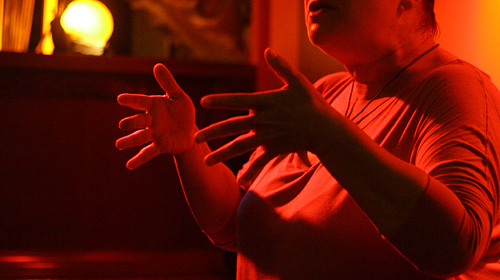
Retorque o rei: “Se és bravo, ó divo Aquiles,
Com dolo e subterfúgios, não me enganes:
Possuis tua cativa, eu perco a minha;
E impões que de perdê-la me contente?
Meu peito satisfaçam de igual prenda
Os liberais Aqueus; senão teu prêmio,
De Ulisses ou de íjax, trarei comigo:
Amargará quem for. Sobrestejamos
Nisto por ora. Ao Pélago deitemos
Negra nau bem remada, que transporte
A hecatombe e Criseida esbelta e linda.
Um dos cabos, íjax, o egrégio Ulisses,
Idomeneu comande-a, ou tu Pelides,
Tremendíssimo herói, para que Apolo
Nos tentes granjear com sacrifícios.”
“Ah! Como, o vulto fecha e estronda Aquiles,
Vulpina alma sem pejo, a teus acenos.
Há quem marche a conflitos e emboscadas?
Não vim bater os valorosos Teucros
Por queixa pessoal; corcéis nem reses
Me furtaram, nem agros destruíram
Da altriz guerreira Ftia; entre nós muita
Serra medeia opaca e o mar sonoro.
Viemos, cão protervo, para em Tróia
A Menelau e a ti lavar a nódoa.
Alardeias, ingrato, e nos desprezas;
Audaz cominas arrancar-me a escrava,
A dádiva de Aqueus por tantas lidas.
Caia ílion famosa: embora o peso
Da guerra em mim carregue, o mais opimo
Quinhão terás; com pouco eu volte a bordo
Sem boquejar, de choques fatigado.
A Ftia me recolho e os meus navios,
Já que aviltas a mão que de tesouros
A fome te fartava: eu te abandono.”

“Foge, Agamêmnon replicou-lhe, foge,
Se é teu prazer; que fiques não te imploro:
Honram-me outros, e em Júpiter confio.
Dos reis alunos dele és quem detesto;
Só respiras discórdias, rixas, pugnas.
Tens valor? Agradece-lho. Os navios
Recolhe e os teus; nos Mirmidões impera:
Não te demoro; esse rancor desdenho.
Priva-me de Criseida Febo Apolo:
Em nau minha esquipada vou mandá-la.
à tenda hei de ir-te mesmo, eu to previno,
Tomar-te a elegantíssima Briseida;
Sentirás em poder como te excedo,
E outrem se me antepor e ombrear trema.”
Chameja o herói, no hirsuto peito volve
Se de ante o fêmur, desbainhe o estoque
E por entre os Aqueus lho embeba todo,
Ou se o furor no coração reprima.
Já meia espada a cogitar sacava:
Eis da alva Juno, que os escuda e preza,
Por ordem Palas desce, e aos mais invisa,
Atrás o aferra pela flava coma.
Volta-se ele espantado e a reconhece
Pelo medonho olhar, e sem demora:
“A que vens, ó do Egífero progênie?
A assistir aos convícios de Agamêmnon?
Pois to declaro, e conto já fazê-lo,
Tem de acabar a vida esse orgulhoso.”
E a déia olhicerúlea: “Vim de acordo
Com Juno albinitente, amiga de ambos,
Comedir-te e amansar. Anda, em palavras
Tu desabafa, a lâmina embainha.
Por essa injúria, to predigo certo,
Inda haverás em triplo insignes prêmios.
Sê-nos pois dócil, a paixão modera.”
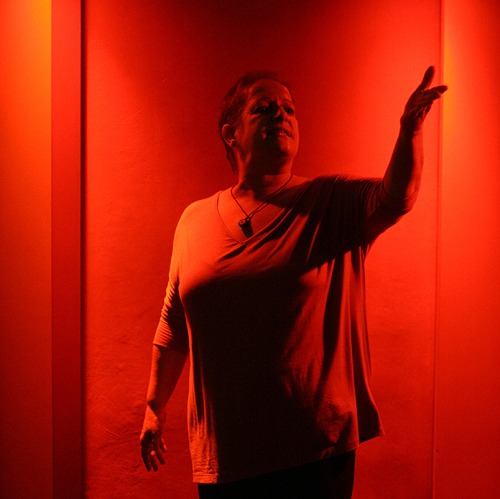
“Cumpre, o fogoso torna-lhe, é cordura
Mesmo irado curvar-me a tais preceitos:
Quem se submete, os deuses mais o escutam.”
Logo a pesada mão no argênteo punho
Conteve, encasa e esconde o gládio horrendo.
Ela a Júpiter se ala e í s mais deidades.
Não deposto o furor, contra Agamêmnon:
“Ébrio, acérrimo Aquiles vocifera,
Cara de perro e coração de cervo,
Nunca te armas e í liça te abalanças,
Nunca í s ciladas os homens acompanhas:
Isto te é morte. Em vasto acampamento,
Sim, mais vale esbulhar os que te arrostam:
Cobardes reges, vorador do povo;
Senão, tanta insolência aqui findara.
Por este cetro juro, que estroncado
Jamais rebentará, pois na montanha
Folhas e casca cerceou-lhe o gume;
Por este, que os Grajúgenas arvoram
Do justo guarda e das leis divinas,
Juro, Atrida, é solene o juramento,
Suspirarão sem falta por Aquiles;
Nem lhes serás de auxílio, quando em barda
Esse Heitor homicida os vá segando.
Então de raiva e nojo hás de comer-te,
Porque o maior dos Gregos rebaixaste.”

Nisto, arrojando o cetro auricravado
Sentou-se. O Atrida em cólera abafava.
Nestor Pílio intervém, de cuja língua
Doce eloqüência mais que o mel fluía.
Dos falantes que, nados na alma Pilos,
Criaram-se com ele, idade duas
Decorridas, reinava na terceira.
Discreto e afável o discurso tece:
“Numes eternos, oh! que luto í Grécia!
Oh, que júbilo a Príamo e a seus filhos!
Folgue ílio í nova que assim litigam
Os de mor pulso e tino. Obedecei-me,
Sou velho, ó moços. Tido em boa conta
Com melhor que vós me dava outrora.
Varões vi nunca, nem verei, qual Drias
Das gentes regedor, Ceneu e Exádio,
Um Pirítoo, um divo Polifemo,
Teseu Egides a imortais parelho.
Outros como esses não nutria a terra:
Feros pugnaram trucidando a feros
Montículas Centauros. Lá de Pilos,
Da ípia eu vinha rogado; conversava-os,
Quando era em mim nas lutas me exercia.
Ninguém dos vivos de hoje os contrastara;
Atendiam contudo aos meus conselhos:
Atendê-los vos praza. Ao mais estrênuo
Tu não tomes dos nossos a só paga;
Nem de ao rei contravir, Pelides, cures;
Dos eleitos que Júpiter estima,
Cetrígero nenhum se lhe equipara:
Mãe deusa te gerou, valor te sobra;
Tem ele mais poder, que impera em muitos.
Eu to suplico, Atrida, a fúria amaina,
Sê brando para quem nesta árdua empresa
É baluarte e escudo aos Gregos todos.”

“Vanglorioso Avidíssimo Atrida, que outra paga exiges dos magnânimos Aquivos?”
Imagens de um ConSerto

Orquestra Organismo
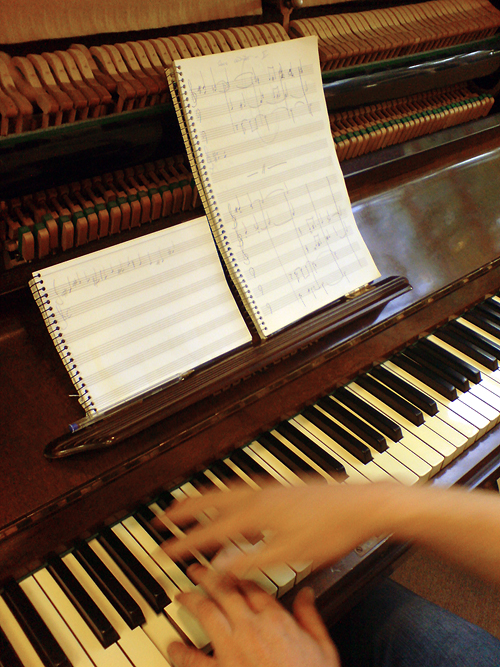
Fortepiano

En.carne.ceu

Jangal

A alavancagem

Recortes

O som dos fagotes
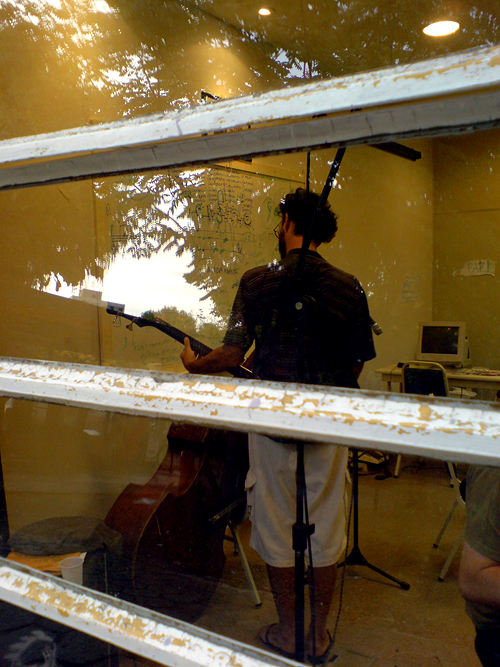
Esquadro
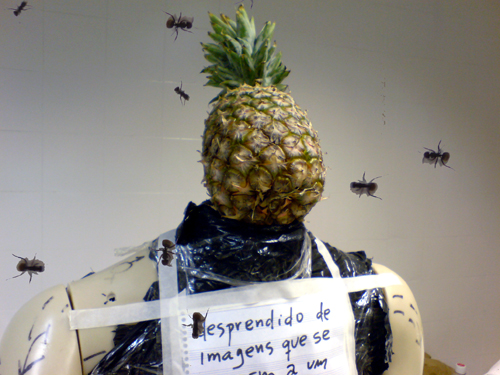
Entropia
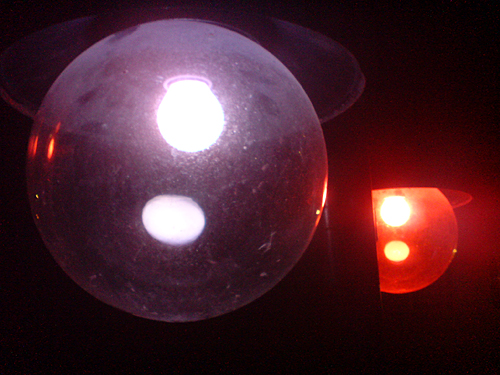
Gravitação Universal

A caminho

Lá fora

A Pulsão segundo C.H.
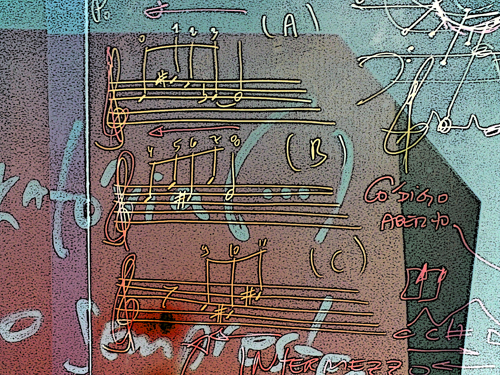
Lascaux
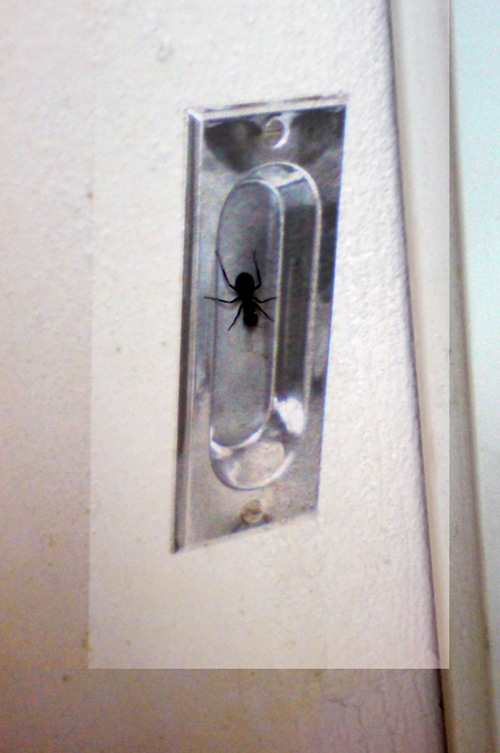
Divisão Racional do Trabalho

Rádio Pulso Maestro

Maí¯s ++
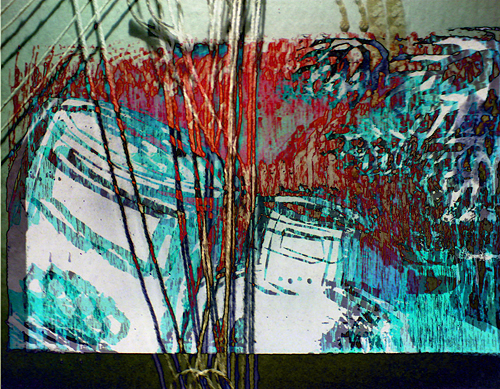
DDD

Abiogênese

Espinhos

Convalescência

Zeno
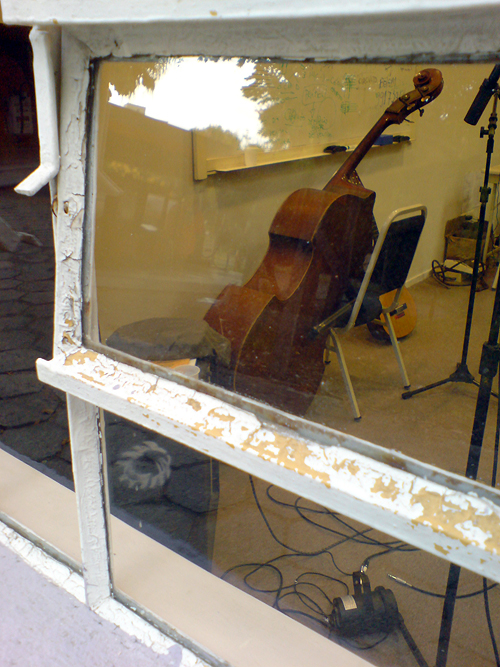
Contrebasse

Cemitério de Elefantes

Pátio dos milagres
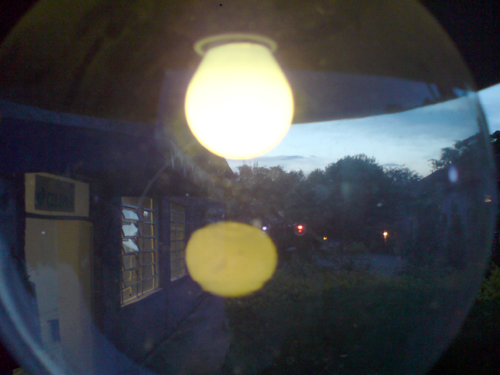
Holos
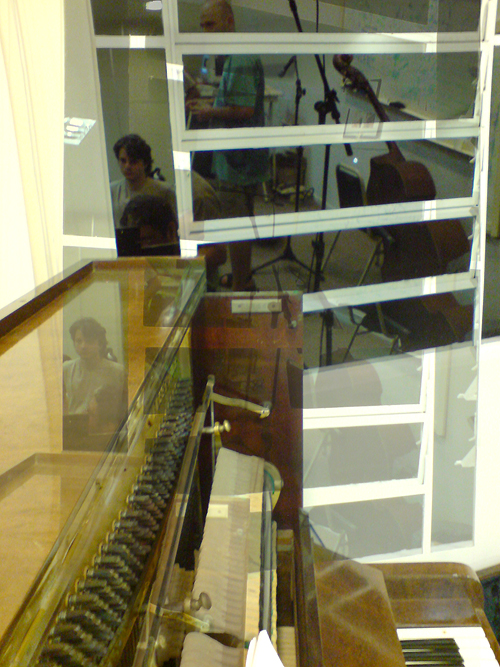
Entranhas

Cordas

Escadas
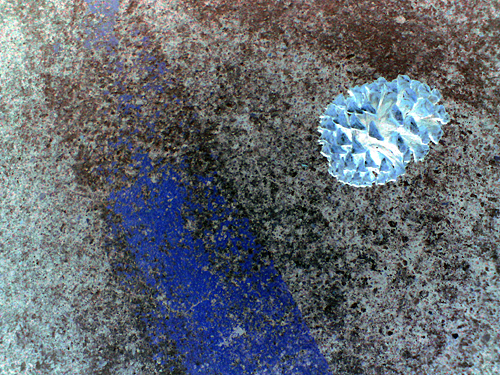
Pií±a colada

O Continente
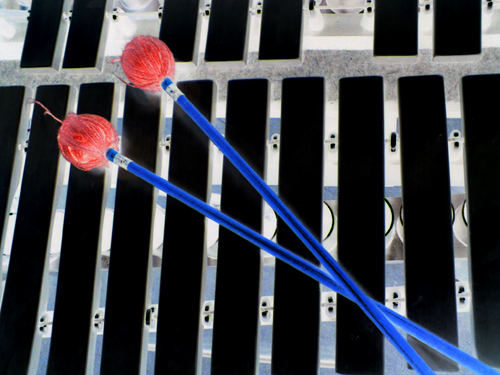
Vibes

Tocando o Bife [Tártaro]

Blossfeldt
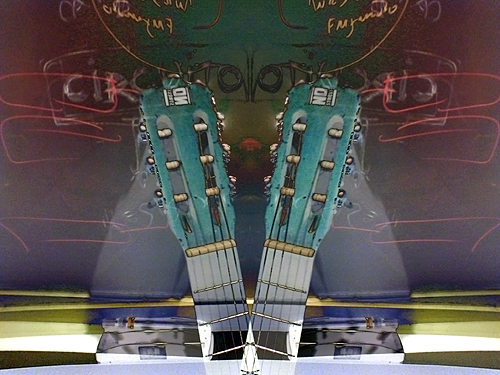
Dí¶ppelganger
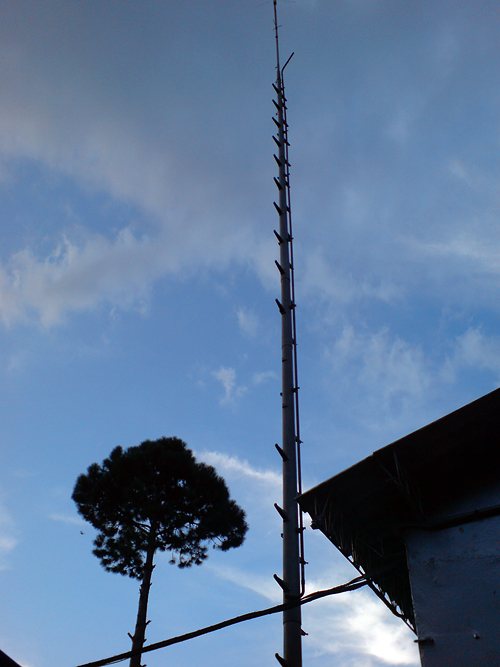
Antenas

Barreiras
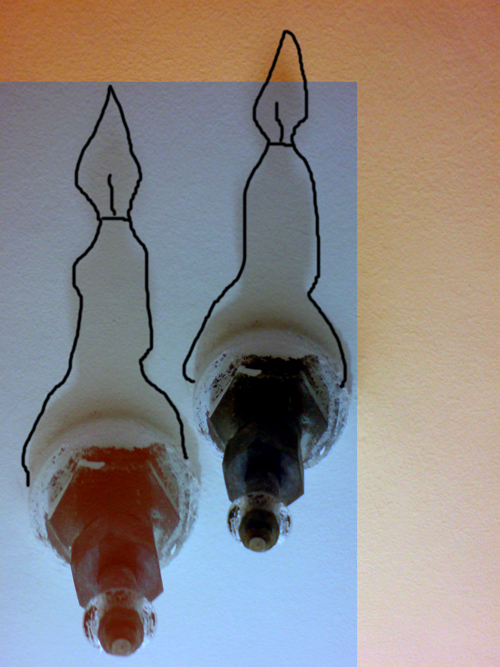
O Tempo e o Vento
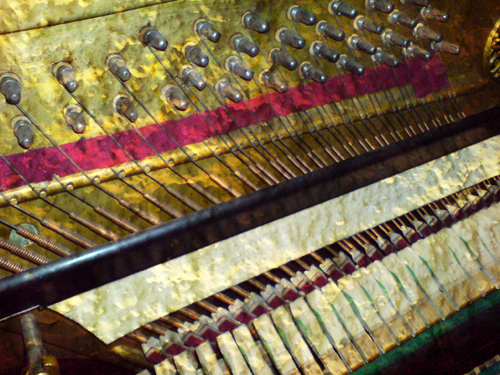
Tripas

C-Bomb
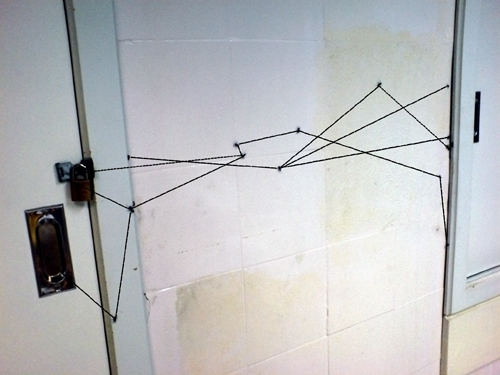
Patch de formigas

Ao ambiente
Tessitura
 Boi-do-patch-preto
Boi-do-patch-preto
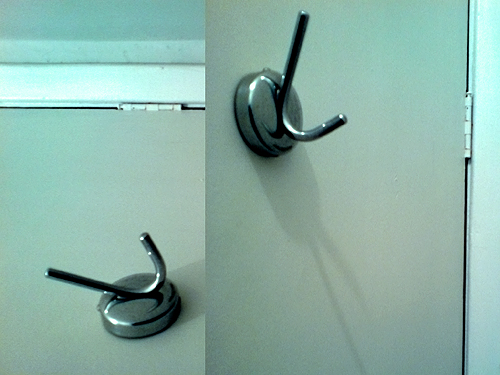
Accrochoir
 Sistema entérico
Sistema entérico
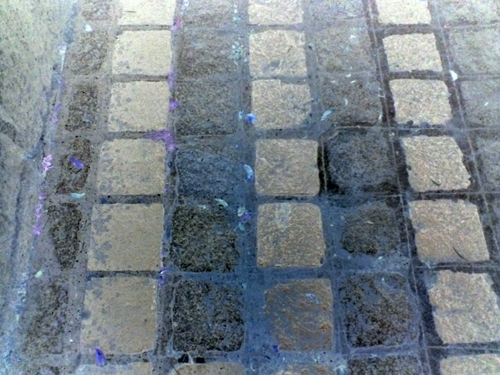
Volta do Pudim
 Encontro com Kurz
Encontro com Kurz

Entracte

Board of Trust

Ovo de Dodô
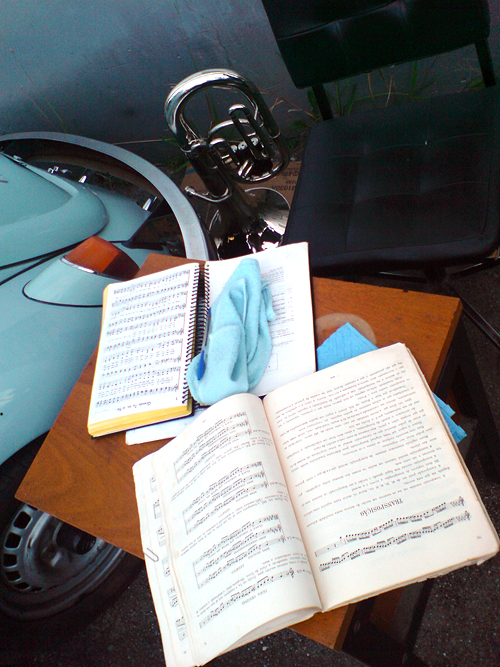
O Bombardino

Au revoir, les enfants

O último que sair, apague a luz
———————————————————————————-
 All photos by Mathieu Struck. Licensed under the
All photos by Mathieu Struck. Licensed under the
GNU-GPL.
quanta

“Quanta”, por Mathieu Struck
WINDOWS MEDIA PLAYER, WINAMP ou VLC? – Considerações sucintas sobre o background técnico, formal e legal da questão (e, mais do que isso, sobre os aspectos ontológicos da pergunta).
A mostra artístico-tecnológica ConSerto (19/03/2007 a 01/04/2007, Curitiba, Brasil), protagonizada pela Orquestra Organismo, está, no momento de redação deste ensaio, a todo vapor.
Ainda em seu início, a mostra já pode se considerar pródiga em ter demonstrado – experimental e empiricamente – o amplo espectro de possibilidades da produção audiovisual em ambientes operacionais complexos arquitetados em software livre e/ou open source.
Um dos experimentos mais eloqüentes do ConSerto é a Rádio Pulso Maestro, uma estação experimental de rádio, transmitida por streaming digital. Toda a cadeia de software necessária para a sua viabilização técnica – do sistema operacional propriamente dito aos programas mais específicos voltados para a transmissão – está construída em código aberto/livre, desmistificando conceitos ainda largamente vigentes a respeito da usabilidade de tais ferramentas.
Ao vivo, a rádio tem ofertado uma programação muito consistente, com transmissões musicais de artistas locais e dôoutras bandas, recitações poéticas e literárias (notadamente a leitura de trechos selecionados de O Tempo e o Vento, por Sálvio Nienkí¶tter), entrevistas, rodadas de debate, além do próprio fluxo de ambientação sonora e verbal da instalação. Todo esse conteúdo é disponibilizado ao público sob licenças de livre compartilhamento, das quais se destaca a GFDL.
Dado o caráter intencionalmente experimental da mostra ConSerto – e as questões palpitantes nela veiculadas – muitas dúvidas tem surgido na sua comunidade de experimentadores (artistas e público). A Rádio Pulso Maestro, como um dos mais emblemáticos exemplos de tal interação alquímica, não poderia ser a exceção.
O presente ensaio pretende abordar topicamente – e sob perspectivas diversas – algumas dificuldades conceituais sentidas pelos usuários da rádio em questão – e pelo próprio autor.
Primeiramente, deve-se observar que a recepção do sinal de streaming da Rádio Pulso Maestro, exatamente como em outras iniciativas de código aberto, depende de uma postura [cri]ativa do usuário. Longe de disponibilizar um cômodo player de áudio embutido em sua própria página (no qual o usuário apenas apertaria singelamente algumas teclas para receber passivamente o sinal transmitido), a rádio, com certa crudeza, oferta unicamente um espartano hiperlink para a recepção de seu sinal.
Conceitualmente, isso se justifica, pois de acordo com a proposta de ConSerto, cabe ao usuário livremente decidir a melhor forma – dentre diversas disponíveis – de acessar dita hiperligação e escutar a rádio. Apenas como uma sugestão descompromissada, a página da Rádio Pulso Maestro indica o programa de execução de áudio e vídeo VLC, desenvolvido pelo projeto Videolan.
Como intencionalmente se previa na concepção de ConSerto, diversos usuários da rádio mostraram-se perplexos e em dúvida. Muitos deles – alguns quase que a arrancar os cabelos – questionaram se não poderiam acessar a rádio mediante, por exemplo, o programa Windows Media Player (incluído no sistema operacional homônimo) ou mesmo mediante o relativamente popular player de áudio Winamp, de distribuição gratuita na rede (ao menos em sua versão mais básica).
Levados a experimentar o VLC, mesmo após alguns previsíveis périplos, tais usuários se surpreenderam com sua própria capacidade de rotear sponte proprio, o acesso í informação antes considerada inacessível por um hermetismo apenas aparente.
Tais questionamentos suscitaram, sob demanda, uma rodada interdisciplinar de discussões em ConSerto com o propósito de compartilhar subsídios técnicos, simbólicos, legais e filosóficos com o público da mostra. Há, nesse particular, uma dupla hélice argumentativa a considerar.
De um lado, ConSerto tem como objetivo demonstrar ritualisticamente, mediante processos em andamento em permanente e camaleônica transformação simbólica, a viabilidade de acesso e manipulação de conteúdos culturais e artísticos com ferramentas de software livre ou de código aberto. Por essa razão conceitual, sugeriu-se, na página da Rádio Pulso Maestro, o uso – meramente exemplificativo – do programa VLC, um software livre.
De outro lado, deve-se considerar que a execução de arquivos de áudio e vídeo em computadores pessoais é absolutamente massificada e é exponencialmente crescente. A principal suite proprietária do mercado (Microsoft Windows) disponibiliza um player de áudio e vídeo integrado simbioticamente ao seu sistema operacional. Há literatura técnica suficientemente disponível para listar uma série de limitações técnicas e de segurança de tal programa, mas este não é o propósito do presente ensaio.
O fato é que um percentual significativo dos usuários de computadores pessoais se mostra satisfeito com o que tal programa lhes oferece, sem maiores questionamentos ou mesmo presumindo a inexistência de outras opções. Outro contingente de usuários, ao se dar conta da efetiva existência de alternativas, passa a ter acesso a uma série de programas rivais ao Windows Media Player, dos quais se poderia citar, exemplificativamente, Winamp, Sonique, Musicmatch, BSPlayer, entre uma infinidade de outros exemplos disponíveis em rede. Todos esses programas podem ser obtidos gratuitamente na internet, seja em suas versões completas ou parciais, conforme o caso.
Embora gratuitos, esses programas não são exemplos de software livre ou mesmo de código aberto. Associar a gratuidade í liberdade de uso ou ao acesso í fonte, nesse particular, é um equívoco conceitual de conseqüências dramáticas.
Nestes exemplos de programas de obtenção gratuita na rede, ao usuário se permite obter, sem custos, um mero pacote executável do programa, não se fornecendo qualquer acesso í s entranhas propriamente ditas do programa (o código-fonte ou source do programa) e nem se conferindo ao usuário certos direitos de modificação e redistribuição. Do que se conclui que tais programas podem ser gratuitos, mas não são livres.
Além disso, não raro tais programas – ao manterem seu código na condição de mistério arcano – trazem em seu âmago dispositivos maliciosos não-autorizados pelo usuário (ou que este razoavelmente não autorizaria se soubesse de sua existência), tais como monitoradores de tráfego, hábitos ou conteúdo, geradores de estatísticas, cookies para observação de padrões de uso ou mesmo disseminação de spam por meio de anódinos (?) registros para recebimento de mailing.
É nesse ponto (e não apenas do ponto de vista estritamente funcionalista ou técnico) que se tornam intuitivas as vantagens de se estimular uma cultura de uso dos programas livres ou de código aberto, não apenas para executar arquivos de áudio e vídeo, mas para muitas outras necessidades do quotidiano computacional, especialmente no que se refere í necessidades relacionadas í geração e ao compartilhamento de dados.
No caso que veio a ilustrar o presente ensaio, o programa VLC é apenas uma dentre as diversas opções de software livre para a execução de arquivos de áudio e vídeo. Considerando que novas iniciativas nesse segmento surgem todos os dias, elaborar uma lista seria ilusório, mas poderiam ser citados, exemplificativamente, os programas Kaffeine, KPlayer, Ogle, Songbird, Audacious (disponibilizados sob a licença GPL), Banshee (licenciado sob MIT) e MusikCube (licenciado sob BSD) e o próprio VLC, que tem a vantagem de ser facilmente instalável na plataforma Windows.
Cada um desses exemplos tem um conjunto de funcionalidades e atrativos distinto, mas tem em comum com os demais o acesso irrestrito e total ao código fonte, aliado (em maior ou menor grau conforme a licença) í livre possibilidade de modificações, alterações ou melhorias por quem se sentir habilitado para tanto.
Mesmo para o usuário que não se interesse por códigos de programação, a simples garantia de que o acesso í fonte será possível já representa uma vantagem conceitual de vulto (inclusive do ponto de vista da privacidade, da individualidade e do anonimato legal, valores sob ameaça constante na contemporaneidade), já que passa a ser possível saber exatamente o que está sendo executado no ambiente operacional do usuário e, com isso, prevenir a execução de códigos ou ordens parasitárias, nocivas ou invasivas. Isso apenas no que se refere ao fato do código ser aberto, sem mencionar outras possibilidades e potencialidades geradas pelo licenciamento livre.
É oportuno ilustrar que a maioria dos programas mencionados conta com comunidades de usuários extremamente ativas e férteis que, de forma orgânica e colaborativa, encontram soluções e incrementos técnicos que garantem a evolução de sua usabilidade e, por conseguinte, da própria cultura de uso de tais ferramentas.
Dada a massificação espetacular do uso dos computadores pessoais para o acesso í cultura e ao entretenimento, players de áudio e vídeo livres são apenas o exemplo mais óbvio e imediatista do crescimento de um ambiente de produção e manipulação de informação voltado prioritariamente para a liberdade do usuário e a preservação de seus direitos fundamentais. Dentre os quais se destacam o acesso í cultura e ao conhecimento, a personalidade, a privacidade, a intimidade, a originalidade e a inventividade, a autonomia, a autodeterminação e, last but not least, o direito natural í customização (o consagrado do it yourself) e í fuga, por conseguinte, da massificação e da standartização. Massificação e stardartização estas que podem até ser coerentes e viáveis para a produção de Fords Modelo T ou latas de sopa, mas que destoam completamente da criação intelectual, artística, inventiva e cultural, mais afeitas ao cuidadoso, paciente e laborioso ofício de artesãos e alquimistas.
Colateralmente, tais ferramentas livres demonstram ter um potencial surpreendente de estimular seus usuários a agirem como manipuladores de códigos não apenas computacionais, matemáticos e/ou lingüísticos, mas a integrarem uma verdadeira comunidade de uso de tais utensílios, colaborando (em maior ou menor grau) de forma sígnica, reativa e comportamental com o florescimento de complexos arcabouços culturais, transcendendo o uso meramente utilitarista e instrumental de tais ferramentas e integrando tais usos e costumes no conjunto de valores permanentes da Civilização.
Na opinião particular do redator, tais comunidades, longe de se submeterem a reduções socializantes (como poderia parecer ou como chega a ocorrer em casos documentados de apropriação ideológica de tal discurso libertário), também podem ser analisados sob outras perspectivas simbólicas, por exemplo, do ponto de vista cívico (não na acepção da vulgata, mas no entendimento clássico do termo – a cives grega), conferindo valor meritocrático í iniciativas de seus membros que se revelem úteis para o código grupal.
A individualidade, conforme se observou, não se dissolve, antes é ludicamente cultuada sob a perspectiva de contribuições que se revelem profícuas para a sobrevivência e fertilidade do grupo. É uma cultura em construção ritual permanente, fundada no respeito mútuo, no compartilhamento e na abertura. Este também é o ConSerto.
Como conclusão, talvez se revele útil ao leitor uma rápida enumeração dos lineamentos conceituais formais que distinguem software proprietário, livre, semi-livre, open source, freeware e shareware.
- Software proprietário: programas que não são livres nem semi-livres. Seu uso, redistribuição ou modificação são proibidos, ou requerem permissão do titular, ou tal permissão, se concedida, não açambarca um uso propriamente livre de todas as funcionalidades do programa. O uso de cópias não-autorizadas de tais programas sujeita o usuário, na quase totalidade dos países, a sanções judiciais e pecuniárias. Praticamente todos os software proprietários não permitem acesso ao seu código fonte (source code) ou ainda que o permitam parcialmente, vedam o acesso a núcleos considerados vitais do programa.
- Freeware (software grátis): termo usualmente associado a programas que podem ser obtidos gratuitamente na internet e que, em alguns casos, podem ser redistribuídos a terceiros, mas que quase sempre não permitem modificações ou não disponibilizam o código fonte. Não se trata de software livre, mas software grátis, uma variante de software proprietário, na qual não há contrapartida econômica, mas se mantém o controle da fonte. Em muitos casos, tais programas seduzem seus usuários com a gratuidade, podendo, em contrapartida, serem a aplicação prática do brocardo “dar com uma mão para tirar com outra“ (especialmente no que se refere í execução de códigos nocivos í privacidade). Além disso, sua standartização gera comunidades de usuários famélicas em compartilhamento e melhoramentos, sendo tais ambientes mais voltados, por exemplo, para a mera troca de skins ou plugins, sem maiores reflexões com relação í avanços nas funcionalidades, ainda controladas por gestores proprietários do código.
- Shareware: Trata-se também de uma variante de software proprietário e um intermediário com relação ao freeware. A obtenção e redistribuição de cópias de demonstração são gratuitas, assim como o uso por um prazo limitado (ou uma limitação de certas funcionalidades). A continuidade do uso é vinculada í aquisição de uma licença paga. Ainda assim, não há acesso ao código fonte e não se permite a sua modificação e redistribuição, na absoluta maioria dos casos. Só há duas formas práticas de se usar tais programas: pagando por uma licença ou obtendo acesso ilegal e não-autorizado í s suas funcionalidades, normalmente mediante cracks ou geradores automáticos de senhas.
- Software semi-livre: Trata-se de programas que normalmente não são gratuitos, mas incluem uma permissão para indivíduos usarem, copiarem, distribuírem, modificarem e redistribuírem versões modificadas para uso doméstico ou sem fins lucrativos. Em contextos mais complexos, como a associação e conjugação de programas para fins múltiplos, os software semi-livres podem gerar problemas de compatibilidade com o software livre propriamente dito, maculando o conjunto.
- Software livre: Programas que são licenciados e disponibilizados ao público de modo a permitirem o livro acesso ao código-fonte, associado í liberdade de executar para qualquer fim, estudar, modificar, melhorar, copiar, distribuir (e redistribuir com modificações), inclusive comercialmente, em maior ou menor grau conforme o tipo de licença de uso que estiver associado ao programa. Há uma infinidade de licenças disponíveis, das quais se destacam a GPL, a BSD e a MIT, cada qual com um teor maior ou menor de permissões a elas associadas.
- Software Open Source (código aberto): Programas nos quais o código-fonte está livremente e publicamente disponível (permitindo a compreensão total das conseqüências de sua execução pelo usuário), ainda que o específico licenciamento de uso, redistribuição ou de modificações de tais programas possa variar conforme o caso.
- Software privado: Situação em que alguém contrata particularmente um desenvolvedor para a elaboração de um programa particular, para uso interno e sem divulgação ao público. A autonomia contratual e a autodeterminação privada das partes regula este tipo de programa, inclusive no que se refere ao acesso ao código fonte, que comumente nestes casos passa a ser de titularidade do contratante, assumindo o desenvolvedor o papel de prestador de serviços.
- Software comercial: Programas desenvolvidos por indivíduos ou empresas com o objetivo de gerar e multiplicar riquezas com a sua disseminação na sociedade. Ainda que esteja intuitivamente e historicamente associado ao software proprietário, o software livre também pode se revestir de uma conotação comercial (coisa, aliás, absolutamente natural e que não é necessariamente contraditória com os princípios de liberdade de uso inerentes ao software livre). Apenas para recordar, software grátis não é software livre e nem necessariamente o inverso. A liberdade de que se trata neste ensaio está associada a valores mais amplos do que aqueles estritamente econômicos.
Curitiba, 21 de março de 2007.
Mathieu Bertrand Struck
(Artigo licenciado sob Creative Commons 2.5 [BY])

—————————————————–
Rodadas de discussão de ConSerto relacionadas ao tema:
the hunger

Photo: Mathieu Struck

punctum
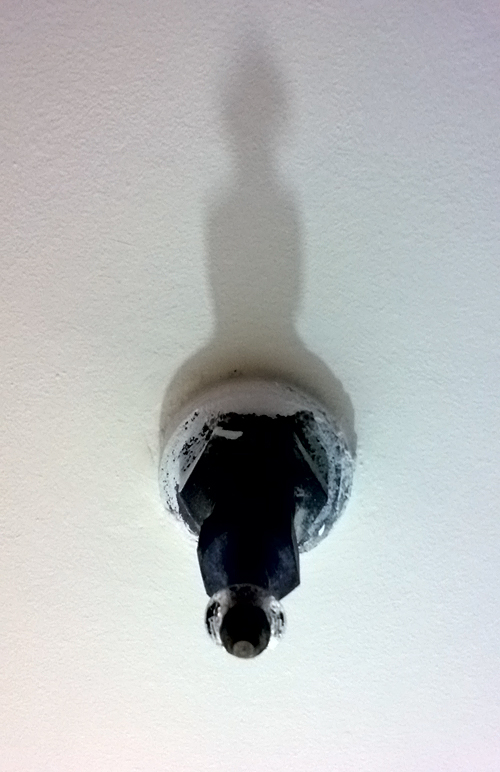 Banheiro da Sala Kernel, 2007.
Banheiro da Sala Kernel, 2007.
———————————————————————————
Photo: Mathieu Struck (Licensed under the GFDL)
(Licensed under the GFDL)
———————————————————————————
cambará number nine (onde os pombos bebem água)

Open source beer
Vores Ã?Ë?l (Our Beer) is the world’s first open source beer. Created by “Vores Ã?Ë?l Group”, a group of students at the IT-University in Copenhagen in collaboration with Superflex, the beer is an experiment in applying modern open source ideas and methods on a traditional real-world product.
The beer is based on classic ale brewing traditions but with added guarana for added energy-boost.
The recipe and the whole brand of Our Beer is published under a Creative Commons license, so anyone can use the recipe to brew the beer or to create a derivative of the recipe. You are free to earn money from Our Beer, but you have to publish the recipe under the same license and credit the original work.

The path of the Croats
Croatian Origins: The documented history of Croatia begins with Greek colonies established along the Dalmatian coast after 600 B.C. Migration of the Croats (Chrobati, Hrvati) is said to have occurred during the early the 6th century A.D. from white Croatia, a region which is now Ukraine between the Southern Bug and Dnieper rivers, to the lower Danube valley. They continued toward the Adriatic, where they conquered the Roman stronghold Salona in 614. After settling in the former Roman provinces of Pannonia and Dalmatia where they spent approximately 10 years, between 626 and 635, to completely defeat the Avars, pushing them to the north of the river Danube. After the defeat of the Avars, Emperor Heraclius enacted a law (Keleusis, iussio), giving the conquered lands to the Croats and under the sovereignty of the Byzantine Empire. The Croats then began to develop independently. The farming Croats continued their former way of life under their zupani or tribal chiefs, who performed administrative, judicial and military functions.
In the 7th century, when they were converted to Christianity. Shortly afterwards they received the privilege of using their national language in church services. Under pressure from the neighbouring Frankish and Byzantine empires, the tribal organization of the Croats gradually gave way to larger units, and there existed two Croatian duchies, one in Dalmatia along the Adriatic coast, the other in Pannonia. After the Frankish-Byzantine peace of 812, Pannonian Croatia became a part of the Frankish empire and the Dalmatian duchy recognized nominal Byzantine supremacy. In the middle of the 9th century the Pannonian Croats liberated themselves and joined the Dalmatian duchy, which also shook off foreign domination. By 880 Branislav (879-892) became the first independent dux Croatorum.
———————————————————————————
Photos in this post: Mathieu Struck (Licensed under the GFDL)
(Licensed under the GFDL)
———————————————————————————
the garden of kronos
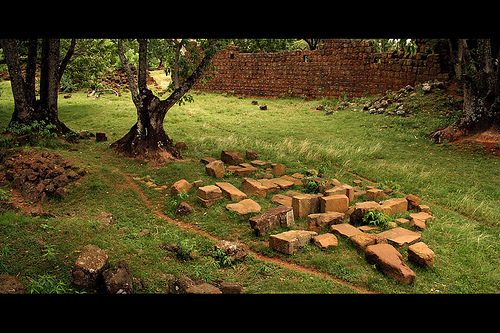
“The Garden of Kronos”
Archeological site of the indian-jesuit reduction of St. Lourenço Mártir. Located near the town of St. Luiz Gonzaga, southern Brasil ///Sítio arqueológico da redução guarani-jesuíta de São Lourenço Mártir. Localizada nas proximidades da cidade de São Luiz Gonzaga-RS.
______________________________________________________________________________
The Theogony of Hesiod
translated by Hugh G. Evelyn-White [1914]
(ll. 1-25) From the Heliconian Muses let us begin to sing, who hold the great and holy mount of Helicon, and dance on soft feet about the deep-blue spring and the altar of the almighty son of Cronos, and, when they have washed their tender bodies in Permessus or in the Horse’s Spring or Olmeius, make their fair, lovely dances upon highest Helicon and move with vigorous feet. Thence they arise and go abroad by night, veiled in thick mist, and utter their song with lovely voice, praising Zeus the aegis- holder and queenly Hera of Argos who walks on golden sandals and the daughter of Zeus the aegis-holder bright-eyed Athene, and Phoebus Apollo, and Artemis who delights in arrows, and Poseidon the earth-holder who shakes the earth, and reverend Themis and quick-glancing1 Aphrodite, and Hebe with the crown of gold, and fair Dione, Leto, Iapetus, and Cronos the crafty counsellor, Eos and great Helius and bright Selene, Earth too, and great Oceanus, and dark Night, and the holy race of all the other deathless ones that are for ever. And one day they taught Hesiod glorious song while he was shepherding his lambs under holy Helicon, and this word first the goddesses said to me — the Muses of Olympus, daughters of Zeus who holds the aegis:
(ll. 26-28) `Shepherds of the wilderness, wretched things of shame, mere bellies, we know how to speak many false things as though they were true; but we know, when we will, to utter true things.’
(ll. 29-35) So said the ready-voiced daughters of great Zeus, and they plucked and gave me a rod, a shoot of sturdy laurel, a marvellous thing, and breathed into me a divine voice to celebrate things that shall be and things there were aforetime; and they bade me sing of the race of the blessed gods that are eternally, but ever to sing of themselves both first and last. But why all this about oak or stone?2
(ll. 36-52) Come thou, let us begin with the Muses who gladden the great spirit of their father Zeus in Olympus with their songs, telling of things that are and that shall be and that were aforetime with consenting voice. Unwearying flows the sweet sound from their lips, and the house of their father Zeus the loud-thunderer is glad at the lily-like voice of the goddesses as it spread abroad, and the peaks of snowy Olympus resound, and the homes of the immortals. And they uttering their immortal voice, celebrate in song first of all the reverend race of the gods from the beginning, those whom Earth and wide Heaven begot, and the gods sprung of these, givers of good things. Then, next, the goddesses sing of Zeus, the father of gods and men, as they begin and end their strain, how much he is the most excellent among the gods and supreme in power. And again, they chant the race of men and strong giants, and gladden the heart of Zeus within Olympus, — the Olympian Muses, daughters of Zeus the aegis-holder.
(ll. 53-74) Them in Pieria did Mnemosyne (Memory), who reigns over the hills of Eleuther, bear of union with the father, the son of Cronos, a forgetting of ills and a rest from sorrow. For nine nights did wise Zeus lie with her, entering her holy bed remote from the immortals. And when a year was passed and the seasons came round as the months waned, and many days were accomplished, she bare nine daughters, all of one mind, whose hearts are set upon song and their spirit free from care, a little way from the topmost peak of snowy Olympus. There are their bright dancing-places and beautiful homes, and beside them the Graces and Himerus (Desire) live in delight. And they, uttering through their lips a lovely voice, sing the laws of all and the goodly ways of the immortals, uttering their lovely voice. Then went they to Olympus, delighting in their sweet voice, with heavenly song, and the dark earth resounded about them as they chanted, and a lovely sound rose up beneath their feet as they went to their father. And he was reigning in heaven, himself holding the lightning and glowing thunderbolt, when he had overcome by might his father Cronos; and he distributed fairly to the immortals their portions and declared their privileges.
(ll. 75-103) These things, then, the Muses sang who dwell on Olympus, nine daughters begotten by great Zeus, Cleio and Euterpe, Thaleia, Melpomene and Terpsichore, and Erato and Polyhymnia and Urania and Calliope3, who is the chiefest of them all, for she attends on worshipful princes: whomsoever of heaven-nourished princes the daughters of great Zeus honour, and behold him at his birth, they pour sweet dew upon his tongue, and from his lips flow gracious words. All the people look towards him while he settles causes with true judgements: and he, speaking surely, would soon make wise end even of a great quarrel; for therefore are there princes wise in heart, because when the people are being misguided in their assembly, they set right the matter again with ease, persuading them with gentle words. And when he passes through a gathering, they greet him as a god with gentle reverence, and he is conspicuous amongst the assembled: such is the holy gift of the Muses to men. For it is through the Muses and far-shooting Apollo that there are singers and harpers upon the earth; but princes are of Zeus, and happy is he whom the Muses love: sweet flows speech from his mouth. For though a man have sorrow and grief in his newly-troubled soul and live in dread because his heart is distressed, yet, when a singer, the servant of the Muses, chants the glorious deeds of men of old and the blessed gods who inhabit Olympus, at once he forgets his heaviness and remembers not his sorrows at all; but the gifts of the goddesses soon turn him away from these.
(ll. 104-115) Hail, children of Zeus! Grant lovely song and celebrate the holy race of the deathless gods who are for ever, those that were born of Earth and starry Heaven and gloomy Night and them that briny Sea did rear. Tell how at the first gods and earth came to be, and rivers, and the boundless sea with its raging swell, and the gleaming stars, and the wide heaven above, and the gods who were born of them, givers of good things, and how they divided their wealth, and how they shared their honours amongst them, and also how at the first they took many-folded Olympus. These things declare to me from the beginning, ye Muses who dwell in the house of Olympus, and tell me which of them first came to be.
(ll. 116-138) Verily at the first Chaos came to be, but next wide-bosomed Earth, the ever-sure foundations of all4 the deathless ones who hold the peaks of snowy Olympus, and dim Tartarus in the depth of the wide-pathed Earth, and Eros (Love), fairest among the deathless gods, who unnerves the limbs and overcomes the mind and wise counsels of all gods and all men within them. From Chaos came forth Erebus and black Night; but of Night were born Aether5 and Day, whom she conceived and bare from union in love with Erebus. And Earth first bare starry Heaven, equal to herself, to cover her on every side, and to be an ever-sure abiding-place for the blessed gods. And she brought forth long Hills, graceful haunts of the goddess-Nymphs who dwell amongst the glens of the hills. She bare also the fruitless deep with his raging swell, Pontus, without sweet union of love. But afterwards she lay with Heaven and bare deep-swirling Oceanus, Coeus and Crius and Hyperion and Iapetus, Theia and Rhea, Themis and Mnemosyne and gold-crowned Phoebe and lovely Tethys. After them was born Cronos the wily, youngest and most terrible of her children, and he hated his lusty sire.
(ll. 139-146) And again, she bare the Cyclopes, overbearing in spirit, Brontes, and Steropes and stubborn-hearted Arges6, who gave Zeus the thunder and made the thunderbolt: in all else they were like the gods, but one eye only was set in the midst of their fore-heads. And they were surnamed Cyclopes (Orb-eyed) because one orbed eye was set in their foreheads. Strength and might and craft were in their works.
(ll. 147-163) And again, three other sons were born of Earth and Heaven, great and doughty beyond telling, Cottus and Briareos and Gyes, presumptuous children. From their shoulders sprang an hundred arms, not to be approached, and each had fifty heads upon his shoulders on their strong limbs, and irresistible was the stubborn strength that was in their great forms. For of all the children that were born of Earth and Heaven, these were the most terrible, and they were hated by their own father from the first.
And he used to hide them all away in a secret place of Earth so soon as each was born, and would not suffer them to come up into the light: and Heaven rejoiced in his evil doing. But vast Earth groaned within, being straitened, and she made the element of grey flint and shaped a great sickle, and told her plan to her dear sons. And she spoke, cheering them, while she was vexed in her dear heart:
(ll. 164-166) `My children, gotten of a sinful father, if you will obey me, we should punish the vile outrage of your father; for he first thought of doing shameful things.’
(ll. 167-169) So she said; but fear seized them all, and none of them uttered a word. But great Cronos the wily took courage and answered his dear mother:
(ll. 170-172) `Mother, I will undertake to do this deed, for I reverence not our father of evil name, for he first thought of doing shameful things.’
(ll. 173-175) So he said: and vast Earth rejoiced greatly in spirit, and set and hid him in an ambush, and put in his hands a jagged sickle, and revealed to him the whole plot.
(ll. 176-206) And Heaven came, bringing on night and longing for love, and he lay about Earth spreading himself full upon her.
_________________________________________________________________________________

“Vaen”
Archeological site of the indian-jesuit reduction of St. Miguel Arcanjo, declared World Heritage Site by Unesco in 1983 (vaen = arrival, in the guarani language)///Sítio arqueológico da redução jesuíta de São Miguel Arcanjo, declarado Patrimônio Mundial da Humanidade em 1983 pela UNESCO (vaen = chegada, em guarani).
_________________________________________________________________________________
Then the son from his ambush stretched forth his left hand and in his right took the great long sickle with jagged teeth, and swiftly lopped off his own father’s members and cast them away to fall behind him. And not vainly did they fall from his hand; for all the bloody drops that gushed forth Earth received, and as the seasons moved round she bare the strong Erinyes and the great Giants with gleaming armour, holding long spears in their hands and the Nymphs whom they call Meliae8 all over the boundless earth. And so soon as he had cut off the members with flint and cast them from the land into the surging sea, they were swept away over the main a long time: and a white foam spread around them from the immortal flesh, and in it there grew a maiden. First she drew near holy Cythera, and from there, afterwards, she came to sea-girt Cyprus, and came forth an awful and lovely goddess, and grass grew up about her beneath her shapely feet. Her gods and men call Aphrodite, and the foam-born goddess and rich-crowned Cytherea, because she grew amid the foam, and Cytherea because she reached Cythera, and Cyprogenes because she was born in billowy Cyprus, and Philommedes9 because sprang from the members. And with her went Eros, and comely Desire followed her at her birth at the first and as she went into the assembly of the gods. This honour she has from the beginning, and this is the portion allotted to her amongst men and undying gods, — the whisperings of maidens and smiles and deceits with sweet delight and love and graciousness.
(ll. 207-210) But these sons whom be begot himself great Heaven used to call Titans (Strainers) in reproach, for he said that they strained and did presumptuously a fearful deed, and that vengeance for it would come afterwards.
(ll. 211-225) And Night bare hateful Doom and black Fate and Death, and she bare Sleep and the tribe of Dreams. And again the goddess murky Night, though she lay with none, bare Blame and painful Woe, and the Hesperides who guard the rich, golden apples and the trees bearing fruit beyond glorious Ocean. Also she bare the Destinies and ruthless avenging Fates, Clotho and Lachesis and Atropos10, who give men at their birth both evil and good to have, and they pursue the transgressions of men and of gods: and these goddesses never cease from their dread anger until they punish the sinner with a sore penalty. Also deadly Night bare Nemesis (Indignation) to afflict mortal men, and after her, Deceit and Friendship and hateful Age and hard-hearted Strife.
(ll. 226-232) But abhorred Strife bare painful Toil and Forgetfulness and Famine and tearful Sorrows, Fightings also, Battles, Murders, Manslaughters, Quarrels, Lying Words, Disputes, Lawlessness and Ruin, all of one nature, and Oath who most troubles men upon earth when anyone wilfully swears a false oath.
(ll. 233-239) And Sea begat Nereus, the eldest of his children, who is true and lies not: and men call him the Old Man because he is trusty and gentle and does not forget the laws of righteousness, but thinks just and kindly thoughts. And yet again he got great Thaumas and proud Phoreys, being mated with Earth, and fair-cheeked Ceto and Eurybia who has a heart of flint within her.
(ll. 240-264) And of Nereus and rich-haired Doris, daughter of Ocean the perfect river, were born children11, passing lovely amongst goddesses, Ploto, Eucrante, Sao, and Amphitrite, and Eudora, and Thetis, Galene and Glauce, Cymothoe, Speo, Thoe and lovely Halie, and Pasithea, and Erato, and rosy-armed Eunice, and gracious Melite, and Eulimene, and Agaue, Doto, Proto, Pherusa, and Dynamene, and Nisaea, and Actaea, and Protomedea, Doris, Panopea, and comely Galatea, and lovely Hippothoe, and rosy-armed Hipponoe, and Cymodoce who with Cymatolege12 and Amphitrite easily calms the waves upon the misty sea and the blasts of raging winds, and Cymo, and Eione, and rich-crowned Alimede, and Glauconome, fond of laughter, and Pontoporea, Leagore, Euagore, and Laomedea, and Polynoe, and Autonoe, and Lysianassa, and Euarne, lovely of shape and without blemish of form, and Psamathe of charming figure and divine Menippe, Neso, Eupompe, Themisto, Pronoe, and Nemertes13 who has the nature of her deathless father. These fifty daughters sprang from blameless Nereus, skilled in excellent crafts.
(ll. 265-269) And Thaumas wedded Electra the daughter of deep- flowing Ocean, and she bare him swift Iris and the long-haired Harpies, Aello (Storm-swift) and Ocypetes (Swift-flier) who on their swift wings keep pace with the blasts of the winds and the birds; for quick as time they dart along.
(ll 270-294) And again, Ceto bare to Phoreys the fair-cheeked Graiae, sisters grey from their birth: and both deathless gods and men who walk on earth call them Graiae, Pemphredo well-clad, and saffron-robed Enyo, and the Gorgons who dwell beyond glorious Ocean in the frontier land towards Night where are the clear- voiced Hesperides, Sthenno, and Euryale, and Medusa who suffered a woeful fate: she was mortal, but the two were undying and grew not old. With her lay the Dark-haired One14 in a soft meadow amid spring flowers. And when Perseus cut off her head, there sprang forth great Chrysaor and the horse Pegasus who is so called because he was born near the springs (pegae) of Ocean; and that other, because he held a golden blade (aor) in his hands. Now Pegasus flew away and left the earth, the mother of flocks, and came to the deathless gods: and he dwells in the house of Zeus and brings to wise Zeus the thunder and lightning. But Chrysaor was joined in love to Callirrhoe, the daughter of glorious Ocean, and begot three-headed Geryones. Him mighty Heracles slew in sea-girt Erythea by his shambling oxen on that day when he drove the wide-browed oxen to holy Tiryns, and had crossed the ford of Ocean and killed Orthus and Eurytion the herdsman in the dim stead out beyond glorious Ocean.
(ll. 295-305) And in a hollow cave she bare another monster, irresistible, in no wise like either to mortal men or to the undying gods, even the goddess fierce Echidna who is half a nymph with glancing eyes and fair cheeks, and half again a huge snake, great and awful, with speckled skin, eating raw flesh beneath the secret parts of the holy earth. And there she has a cave deep down under a hollow rock far from the deathless gods and mortal men. There, then, did the gods appoint her a glorious house to dwell in: and she keeps guard in Arima beneath the earth, grim Echidna, a nymph who dies not nor grows old all her days.
(ll. 306-332) Men say that Typhaon the terrible, outrageous and lawless, was joined in love to her, the maid with glancing eyes. So she conceived and brought forth fierce offspring; first she bare Orthus the hound of Geryones, and then again she bare a second, a monster not to be overcome and that may not be described, Cerberus who eats raw flesh, the brazen-voiced hound of Hades, fifty-headed, relentless and strong. And again she bore a third, the evil-minded Hydra of Lerna, whom the goddess, white-armed Hera nourished, being angry beyond measure with the mighty Heracles. And her Heracles, the son of Zeus, of the house of Amphitryon, together with warlike Iolaus, destroyed with the unpitying sword through the plans of Athene the spoil-driver. She was the mother of Chimaera who breathed raging fire, a creature fearful, great, swift-footed and strong, who had three heads, one of a grim-eyed lion; in her hinderpart, a dragon; and in her middle, a goat, breathing forth a fearful blast of blazing fire. Her did Pegasus and noble Bellerophon slay; but Echidna was subject in love to Orthus and brought forth the deadly Sphinx which destroyed the Cadmeans, and the Nemean lion, which Hera, the good wife of Zeus, brought up and made to haunt the hills of Nemea, a plague to men. There he preyed upon the tribes of her own people and had power over Tretus of Nemea and Apesas: yet the strength of stout Heracles overcame him.
(ll. 333-336) And Ceto was joined in love to Phorcys and bare her youngest, the awful snake who guards the apples all of gold in the secret places of the dark earth at its great bounds. This is the offspring of Ceto and Phoreys.
(ll. 334-345) And Tethys bare to Ocean eddying rivers, Nilus, and Alpheus, and deep-swirling Eridanus, Strymon, and Meander, and the fair stream of Ister, and Phasis, and Rhesus, and the silver eddies of Achelous, Nessus, and Rhodius, Haliacmon, and Heptaporus, Granicus, and Aesepus, and holy Simois, and Peneus, and Hermus, and Caicus fair stream, and great Sangarius, Ladon, Parthenius, Euenus, Ardescus, and divine Scamander.
(ll. 346-370) Also she brought forth a holy company of daughters15 who with the lord Apollo and the Rivers have youths in their keeping — to this charge Zeus appointed them — Peitho, and Admete, and Ianthe, and Electra, and Doris, and Prymno, and Urania divine in form, Hippo, Clymene, Rhodea, and Callirrhoe, Zeuxo and Clytie, and Idyia, and Pasithoe, Plexaura, and Galaxaura, and lovely Dione, Melobosis and Thoe and handsome Polydora, Cerceis lovely of form, and soft eyed Pluto, Perseis, Ianeira, Acaste, Xanthe, Petraea the fair, Menestho, and Europa, Metis, and Eurynome, and Telesto saffron-clad, Chryseis and Asia and charming Calypso, Eudora, and Tyche, Amphirho, and Ocyrrhoe, and Styx who is the chiefest of them all. These are the eldest daughters that sprang from Ocean and Tethys; but there are many besides. For there are three thousand neat-ankled daughters of Ocean who are dispersed far and wide, and in every place alike serve the earth and the deep waters, children who are glorious among goddesses. And as many other rivers are there, babbling as they flow, sons of Ocean, whom queenly Tethys bare, but their names it is hard for a mortal man to tell, but people know those by which they severally dwell.
(ll. 371-374) And Theia was subject in love to Hyperion and bare great Helius (Sun) and clear Selene (Moon) and Eos (Dawn) who shines upon all that are on earth and upon the deathless Gods who live in the wide heaven.
(ll. 375-377) And Eurybia, bright goddess, was joined in love to Crius and bare great Astraeus, and Pallas, and Perses who also was eminent among all men in wisdom.
(ll. 378-382) And Eos bare to Astraeus the strong-hearted winds, brightening Zephyrus, and Boreas, headlong in his course, and Notus, — a goddess mating in love with a god. And after these Erigenia16 bare the star Eosphorus (Dawn-bringer), and the gleaming stars with which heaven is crowned.
(ll. 383-403) And Styx the daughter of Ocean was joined to Pallas and bare Zelus (Emulation) and trim-ankled Nike (Victory) in the house. Also she brought forth Cratos (Strength) and Bia (Force), wonderful children. These have no house apart from Zeus, nor any dwelling nor path except that wherein God leads them, but they dwell always with Zeus the loud-thunderer. For so did Styx the deathless daughter of Ocean plan on that day when the Olympian Lightener called all the deathless gods to great Olympus, and said that whosoever of the gods would fight with him against the Titans, he would not cast him out from his rights, but each should have the office which he had before amongst the deathless gods. And he declared that he who was without office and rights as is just. So deathless Styx came first to Olympus with her children through the wit of her dear father. And Zeus honoured her, and gave her very great gifts, for her he appointed to be the great oath of the gods, and her children to live with him always. And as he promised, so he performed fully unto them all.
But he himself mightily reigns and rules.
(ll. 404-452) Again, Phoebe came to the desired embrace of Coeus.
Then the goddess through the love of the god conceived and brought forth dark-gowned Leto, always mild, kind to men and to the deathless gods, mild from the beginning, gentlest in all Olympus. Also she bare Asteria of happy name, whom Perses once led to his great house to be called his dear wife. And she conceived and bare Hecate whom Zeus the son of Cronos honoured above all. He gave her splendid gifts, to have a share of the earth and the unfruitful sea. She received honour also in starry heaven, and is honoured exceedingly by the deathless gods. For to this day, whenever any one of men on earth offers rich sacrifices and prays for favour according to custom, he calls upon Hecate. Great honour comes full easily to him whose prayers the goddess receives favourably, and she bestows wealth upon him; for the power surely is with her. For as many as were born of Earth and Ocean amongst all these she has her due portion. The son of Cronos did her no wrong nor took anything away of all that was her portion among the former Titan gods: but she holds, as the division was at the first from the beginning, privilege both in earth, and in heaven, and in sea. Also, because she is an only child, the goddess receives not less honour, but much more still, for Zeus honours her. Whom she will she greatly aids and advances: she sits by worshipful kings in judgement, and in the assembly whom she will is distinguished among the people. And when men arm themselves for the battle that destroys men, then the goddess is at hand to give victory and grant glory readily to whom she will. Good is she also when men contend at the games, for there too the goddess is with them and profits them: and he who by might and strength gets the victory wins the rich prize easily with joy, and brings glory to his parents. And she is good to stand by horsemen, whom she will: and to those whose business is in the grey discomfortable sea, and who pray to Hecate and the loud-crashing Earth-Shaker, easily the glorious goddess gives great catch, and easily she takes it away as soon as seen, if so she will. She is good in the byre with Hermes to increase the stock. The droves of kine and wide herds of goats and flocks of fleecy sheep, if she will, she increases from a few, or makes many to be less. So, then. albeit her mother’s only child17, she is honoured amongst all the deathless gods. And the son of Cronos made her a nurse of the young who after that day saw with their eyes the light of all-seeing Dawn. So from the beginning she is a nurse of the young, and these are her honours.
______________________________________________________________________________

“The Path of the Guarani”
This shot was taken while leaving the ruins of the reduction of St. Joao Batista. Our goal – 20 km ahead of us – was the archeological site of the reduction of St. Miguel Arcanjo. This dust road follows the tracing of the jesuit and guarani indians ancient roads, that provided transport and communication between the so-called ‘Seven People of the Missions’ (the seven indian-jesuit villages located, nowadays, in modern Brasil)///Saída de São João Batista, em direção ao sítio arqueológico da Redução de São Miguel Arcanjo (na cidade de São Miguel das Missões-RS). Esta estrada de chão – cerca de 20 km – segue o traçado dos antigos caminhos jesuítas e indígenas de transporte e comunicação entre os Sete Povos das Missões.
______________________________________________________________________________
(ll. 453-491) But Rhea was subject in love to Cronos and bare splendid children, Hestia18, Demeter, and gold-shod Hera and strong Hades, pitiless in heart, who dwells under the earth, and the loud-crashing Earth-Shaker, and wise Zeus, father of gods and men, by whose thunder the wide earth is shaken. These great Cronos swallowed as each came forth from the womb to his mother’s knees with this intent, that no other of the proud sons of Heaven should hold the kingly office amongst the deathless gods. For he learned from Earth and starry Heaven that he was destined to be overcome by his own son, strong though he was, through the contriving of great Zeus19. Therefore he kept no blind outlook, but watched and swallowed down his children: and unceasing grief seized Rhea. But when she was about to bear Zeus, the father of gods and men, then she besought her own dear parents, Earth and starry Heaven, to devise some plan with her that the birth of her dear child might be concealed, and that retribution might overtake great, crafty Cronos for his own father and also for the children whom he had swallowed down. And they readily heard and obeyed their dear daughter, and told her all that was destined to happen touching Cronos the king and his stout-hearted son. So they sent her to Lyetus, to the rich land of Crete, when she was ready to bear great Zeus, the youngest of her children. Him did vast Earth receive from Rhea in wide Crete to nourish and to bring up. Thither came Earth carrying him swiftly through the black night to Lyctus first, and took him in her arms and hid him in a remote cave beneath the secret places of the holy earth on thick-wooded Mount Aegeum; but to the mightily ruling son of Heaven, the earlier king of the gods, she gave a great stone wrapped in swaddling clothes. Then he took it in his hands and thrust it down into his belly: wretch! he knew not in his heart that in place of the stone his son was left behind, unconquered and untroubled, and that he was soon to overcome him by force and might and drive him from his honours, himself to reign over the deathless gods.
(ll. 492-506) After that, the strength and glorious limbs of the prince increased quickly, and as the years rolled on, great Cronos the wily was beguiled by the deep suggestions of Earth, and brought up again his offspring, vanquished by the arts and might of his own son, and he vomited up first the stone which he had swallowed last. And Zeus set it fast in the wide-pathed earth at goodly Pytho under the glens of Parnassus, to be a sign thenceforth and a marvel to mortal men20. And he set free from their deadly bonds the brothers of his father, sons of Heaven whom his father in his foolishness had bound. And they remembered to be grateful to him for his kindness, and gave him thunder and the glowing thunderbolt and lightening: for before that, huge Earth had hidden these. In them he trusts and rules over mortals and immortals.
(ll. 507-543) Now Iapetus took to wife the neat-ankled mad Clymene, daughter of Ocean, and went up with her into one bed. And she bare him a stout-hearted son, Atlas: also she bare very glorious Menoetius and clever Prometheus, full of various wiles, and scatter-brained Epimetheus who from the first was a mischief to men who eat bread; for it was he who first took of Zeus the woman, the maiden whom he had formed. But Menoetius was outrageous, and far-seeing Zeus struck him with a lurid thunderbolt and sent him down to Erebus because of his mad presumption and exceeding pride. And Atlas through hard constraint upholds the wide heaven with unwearying head and arms, standing at the borders of the earth before the clear-voiced Hesperides; for this lot wise Zeus assigned to him. And ready- witted Prometheus he bound with inextricable bonds, cruel chains, and drove a shaft through his middle, and set on him a long- winged eagle, which used to eat his immortal liver; but by night the liver grew as much again everyway as the long-winged bird devoured in the whole day. That bird Heracles, the valiant son of shapely-ankled Alcmene, slew; and delivered the son of Iapetus from the cruel plague, and released him from his affliction — not without the will of Olympian Zeus who reigns on high, that the glory of Heracles the Theban-born might be yet greater than it was before over the plenteous earth. This, then, he regarded, and honoured his famous son; though he was angry, he ceased from the wrath which he had before because Prometheus matched himself in wit with the almighty son of Cronos. For when the gods and mortal men had a dispute at Mecone, even then Prometheus was forward to cut up a great ox and set portions before them, trying to befool the mind of Zeus. Before the rest he set flesh and inner parts thick with fat upon the hide, covering them with an ox paunch; but for Zeus he put the white bones dressed up with cunning art and covered with shining fat. Then the father of men and of gods said to him:
(ll. 543-544) `Son of Iapetus, most glorious of all lords, good sir, how unfairly you have divided the portions!’
(ll. 545-547) So said Zeus whose wisdom is everlasting, rebuking him. But wily Prometheus answered him, smiling softly and not forgetting his cunning trick:
(ll. 548-558) `Zeus, most glorious and greatest of the eternal gods, take which ever of these portions your heart within you bids.’ So he said, thinking trickery. But Zeus, whose wisdom is everlasting, saw and failed not to perceive the trick, and in his heart he thought mischief against mortal men which also was to be fulfilled. With both hands he took up the white fat and was angry at heart, and wrath came to his spirit when he saw the white ox-bones craftily tricked out: and because of this the tribes of men upon earth burn white bones to the deathless gods upon fragrant altars. But Zeus who drives the clouds was greatly vexed and said to him:
(ll. 559-560) `Son of Iapetus, clever above all! So, sir, you have not yet forgotten your cunning arts!’
(ll. 561-584) So spake Zeus in anger, whose wisdom is everlasting; and from that time he was always mindful of the trick, and would not give the power of unwearying fire to the Melian21 race of mortal men who live on the earth. But the noble son of Iapetus outwitted him and stole the far-seen gleam of unwearying fire in a hollow fennel stalk. And Zeus who thunders on high was stung in spirit, and his dear heart was angered when he saw amongst men the far-seen ray of fire. Forthwith he made an evil thing for men as the price of fire; for the very famous Limping God formed of earth the likeness of a shy maiden as the son of Cronos willed. And the goddess bright-eyed Athene girded and clothed her with silvery raiment, and down from her head she spread with her hands a broidered veil, a wonder to see; and she, Pallas Athene, put about her head lovely garlands, flowers of new-grown herbs. Also she put upon her head a crown of gold which the very famous Limping God made himself and worked with his own hands as a favour to Zeus his father. On it was much curious work, wonderful to see; for of the many creatures which the land and sea rear up, he put most upon it, wonderful things, like living beings with voices: and great beauty shone out from it.
(ll. 585-589) But when he had made the beautiful evil to be the price for the blessing, he brought her out, delighting in the finery which the bright-eyed daughter of a mighty father had given her, to the place where the other gods and men were. And wonder took hold of the deathless gods and mortal men when they saw that which was sheer guile, not to be withstood by men.
(ll. 590-612) For from her is the race of women and female kind: of her is the deadly race and tribe of women who live amongst mortal men to their great trouble, no helpmeets in hateful poverty, but only in wealth. And as in thatched hives bees feed the drones whose nature is to do mischief — by day and throughout the day until the sun goes down the bees are busy and lay the white combs, while the drones stay at home in the covered skeps and reap the toil of others into their own bellies — even so Zeus who thunders on high made women to be an evil to mortal men, with a nature to do evil. And he gave them a second evil to be the price for the good they had: whoever avoids marriage and the sorrows that women cause, and will not wed, reaches deadly old age without anyone to tend his years, and though he at least has no lack of livelihood while he lives, yet, when he is dead, his kinsfolk divide his possessions amongst them. And as for the man who chooses the lot of marriage and takes a good wife suited to his mind, evil continually contends with good; for whoever happens to have mischievous children, lives always with unceasing grief in his spirit and heart within him; and this evil cannot be healed.
(ll. 613-616) So it is not possible to deceive or go beyond the will of Zeus; for not even the son of Iapetus, kindly Prometheus, escaped his heavy anger, but of necessity strong bands confined him, although he knew many a wile.
(ll. 617-643) But when first their father was vexed in his heart with Obriareus and Cottus and Gyes, he bound them in cruel bonds, because he was jealous of their exceeding manhood and comeliness and great size: and he made them live beneath the wide-pathed earth, where they were afflicted, being set to dwell under the ground, at the end of the earth, at its great borders, in bitter anguish for a long time and with great grief at heart. But the son of Cronos and the other deathless gods whom rich-haired Rhea bare from union with Cronos, brought them up again to the light at Earth’s advising. For she herself recounted all things to the gods fully, how that with these they would gain victory and a glorious cause to vaunt themselves. For the Titan gods and as many as sprang from Cronos had long been fighting together in stubborn war with heart-grieving toil, the lordly Titans from high Othyrs, but the gods, givers of good, whom rich-haired Rhea bare in union with Cronos, from Olympus. So they, with bitter wrath, were fighting continually with one another at that time for ten full years, and the hard strife had no close or end for either side, and the issue of the war hung evenly balanced. But when he had provided those three with all things fitting, nectar and ambrosia which the gods themselves eat, and when their proud spirit revived within them all after they had fed on nectar and delicious ambrosia, then it was that the father of men and gods spoke amongst them:
(ll. 644-653) `Hear me, bright children of Earth and Heaven, that I may say what my heart within me bids. A long while now have we, who are sprung from Cronos and the Titan gods, fought with each other every day to get victory and to prevail. But do you show your great might and unconquerable strength, and face the Titans in bitter strife; for remember our friendly kindness, and from what sufferings you are come back to the light from your cruel bondage under misty gloom through our counsels.’
(ll. 654-663) So he said. And blameless Cottus answered him again: `Divine one, you speak that which we know well: nay, even of ourselves we know that your wisdom and understanding is exceeding, and that you became a defender of the deathless ones from chill doom. And through your devising we are come back again from the murky gloom and from our merciless bonds, enjoying what we looked not for, O lord, son of Cronos. And so now with fixed purpose and deliberate counsel we will aid your power in dreadful strife and will fight against the Titans in hard battle.’
(ll. 664-686) So he said: and the gods, givers of good things, applauded when they heard his word, and their spirit longed for war even more than before, and they all, both male and female, stirred up hated battle that day, the Titan gods, and all that were born of Cronos together with those dread, mighty ones of overwhelming strength whom Zeus brought up to the light from Erebus beneath the earth. An hundred arms sprang from the shoulders of all alike, and each had fifty heads growing upon his shoulders upon stout limbs. These, then, stood against the Titans in grim strife, holding huge rocks in their strong hands. And on the other part the Titans eagerly strengthened their ranks, and both sides at one time showed the work of their hands and their might. The boundless sea rang terribly around, and the earth crashed loudly: wide Heaven was shaken and groaned, and high Olympus reeled from its foundation under the charge of the undying gods, and a heavy quaking reached dim Tartarus and the deep sound of their feet in the fearful onset and of their hard missiles. So, then, they launched their grievous shafts upon one another, and the cry of both armies as they shouted reached to starry heaven; and they met together with a great battle-cry.
_________________________________________________________________________________

“Onirique”
Archeological site of the indian-jesuit reduction of St. Lourenço Mártir. Located near the town of St. Luiz Gonzaga, southern Brasil///Sítio arqueológico da redução guarani-jesuíta de São Lourenço Mártir. Localizada nas proximidades da cidade de São Luiz Gonzaga-RS.
_________________________________________________________________________________
(ll. 687-712) Then Zeus no longer held back his might; but straight his heart was filled with fury and he showed forth all his strength. From Heaven and from Olympus he came forthwith, hurling his lightning: the bold flew thick and fast from his strong hand together with thunder and lightning, whirling an awesome flame. The life-giving earth crashed around in burning, and the vast wood crackled loud with fire all about. All the land seethed, and Ocean’s streams and the unfruitful sea. The hot vapour lapped round the earthborn Titans: flame unspeakable rose to the bright upper air: the flashing glare of the thunder- stone and lightning blinded their eyes for all that there were strong. Astounding heat seized Chaos: and to see with eyes and to hear the sound with ears it seemed even as if Earth and wide Heaven above came together; for such a mighty crash would have arisen if Earth were being hurled to ruin, and Heaven from on high were hurling her down; so great a crash was there while the gods were meeting together in strife. Also the winds brought rumbling earthquake and duststorm, thunder and lightning and the lurid thunderbolt, which are the shafts of great Zeus, and carried the clangour and the warcry into the midst of the two hosts. An horrible uproar of terrible strife arose: mighty deeds were shown and the battle inclined. But until then, they kept at one another and fought continually in cruel war.
(ll. 713-735) And amongst the foremost Cottus and Briareos and Gyes insatiate for war raised fierce fighting: three hundred rocks, one upon another, they launched from their strong hands and overshadowed the Titans with their missiles, and buried them beneath the wide-pathed earth, and bound them in bitter chains when they had conquered them by their strength for all their great spirit, as far beneath the earth to Tartarus. For a brazen anvil falling down from heaven nine nights and days would reach the earth upon the tenth: and again, a brazen anvil falling from earth nine nights and days would reach Tartarus upon the tenth. Round it runs a fence of bronze, and night spreads in triple line all about it like a neck-circlet, while above grow the roots of the earth and unfruitful sea. There by the counsel of Zeus who drives the clouds the Titan gods are hidden under misty gloom, in a dank place where are the ends of the huge earth. And they may not go out; for Poseidon fixed gates of bronze upon it, and a wall runs all round it on every side. There Gyes and Cottus and great-souled Obriareus live, trusty warders of Zeus who holds the aegis.
(ll. 736-744) And there, all in their order, are the sources and ends of gloomy earth and misty Tartarus and the unfruitful sea and starry heaven, loathsome and dank, which even the gods abhor.
It is a great gulf, and if once a man were within the gates, he would not reach the floor until a whole year had reached its end, but cruel blast upon blast would carry him this way and that. And this marvel is awful even to the deathless gods.
(ll. 744-757) There stands the awful home of murky Night wrapped in dark clouds. In front of it the son of Iapetus22 stands immovably upholding the wide heaven upon his head and unwearying hands, where Night and Day draw near and greet one another as they pass the great threshold of bronze: and while the one is about to go down into the house, the other comes out at the door.
And the house never holds them both within; but always one is without the house passing over the earth, while the other stays at home and waits until the time for her journeying come; and the one holds all-seeing light for them on earth, but the other holds in her arms Sleep the brother of Death, even evil Night, wrapped in a vaporous cloud.
(ll. 758-766) And there the children of dark Night have their dwellings, Sleep and Death, awful gods. The glowing Sun never looks upon them with his beams, neither as he goes up into heaven, nor as he comes down from heaven. And the former of them roams peacefully over the earth and the sea’s broad back and is kindly to men; but the other has a heart of iron, and his spirit within him is pitiless as bronze: whomsoever of men he has once seized he holds fast: and he is hateful even to the deathless gods.
(ll. 767-774) There, in front, stand the echoing halls of the god of the lower-world, strong Hades, and of awful Persephone. A fearful hound guards the house in front, pitiless, and he has a cruel trick. On those who go in he fawns with his tail and both is ears, but suffers them not to go out back again, but keeps watch and devours whomsoever he catches going out of the gates of strong Hades and awful Persephone.
(ll. 775-806) And there dwells the goddess loathed by the deathless gods, terrible Styx, eldest daughter of back-flowing23 Ocean. She lives apart from the gods in her glorious house vaulted over with great rocks and propped up to heaven all round with silver pillars. Rarely does the daughter of Thaumas, swift- footed Iris, come to her with a message over the sea’s wide back.
But when strife and quarrel arise among the deathless gods, and when any of them who live in the house of Olympus lies, then Zeus sends Iris to bring in a golden jug the great oath of the gods from far away, the famous cold water which trickles down from a high and beetling rock. Far under the wide-pathed earth a branch of Oceanus flows through the dark night out of the holy stream, and a tenth part of his water is allotted to her. With nine silver-swirling streams he winds about the earth and the sea’s wide back, and then falls into the main24; but the tenth flows out from a rock, a sore trouble to the gods. For whoever of the deathless gods that hold the peaks of snowy Olympus pours a libation of her water is forsworn, lies breathless until a full year is completed, and never comes near to taste ambrosia and nectar, but lies spiritless and voiceless on a strewn bed: and a heavy trance overshadows him. But when he has spent a long year in his sickness, another penance and an harder follows after the first. For nine years he is cut off from the eternal gods and never joins their councils of their feasts, nine full years. But in the tenth year he comes again to join the assemblies of the deathless gods who live in the house of Olympus. Such an oath, then, did the gods appoint the eternal and primaeval water of Styx to be: and it spouts through a rugged place.
(ll. 807-819) And there, all in their order, are the sources and ends of the dark earth and misty Tartarus and the unfruitful sea and starry heaven, loathsome and dank, which even the gods abhor.
And there are shining gates and an immoveable threshold of bronze having unending roots and it is grown of itself25. And beyond, away from all the gods, live the Titans, beyond gloomy Chaos. But the glorious allies of loud-crashing Zeus have their dwelling upon Ocean’s foundations, even Cottus and Gyes; but Briareos, being goodly, the deep-roaring Earth-Shaker made his son-in-law, giving him Cymopolea his daughter to wed.
(ll. 820-868) But when Zeus had driven the Titans from heaven, huge Earth bare her youngest child Typhoeus of the love of Tartarus, by the aid of golden Aphrodite. Strength was with his hands in all that he did and the feet of the strong god were untiring. From his shoulders grew an hundred heads of a snake, a fearful dragon, with dark, flickering tongues, and from under the brows of his eyes in his marvellous heads flashed fire, and fire burned from his heads as he glared. And there were voices in all his dreadful heads which uttered every kind of sound unspeakable; for at one time they made sounds such that the gods understood, but at another, the noise of a bull bellowing aloud in proud ungovernable fury; and at another, the sound of a lion, relentless of heart; and at anothers, sounds like whelps, wonderful to hear; and again, at another, he would hiss, so that the high mountains re-echoed. And truly a thing past help would have happened on that day, and he would have come to reign over mortals and immortals, had not the father of men and gods been quick to perceive it. But he thundered hard and mightily: and the earth around resounded terribly and the wide heaven above, and the sea and Ocean’s streams and the nether parts of the earth. Great Olympus reeled beneath the divine feet of the king as he arose and earth groaned thereat. And through the two of them heat took hold on the dark-blue sea, through the thunder and lightning, and through the fire from the monster, and the scorching winds and blazing thunderbolt. The whole earth seethed, and sky and sea: and the long waves raged along the beaches round and about, at the rush of the deathless gods: and there arose an endless shaking. Hades trembled where he rules over the dead below, and the Titans under Tartarus who live with Cronos, because of the unending clamour and the fearful strife. So when Zeus had raised up his might and seized his arms, thunder and lightning and lurid thunderbolt, he leaped form Olympus and struck him, and burned all the marvellous heads of the monster about him. But when Zeus had conquered him and lashed him with strokes, Typhoeus was hurled down, a maimed wreck, so that the huge earth groaned. And flame shot forth from the thunder- stricken lord in the dim rugged glens of the mount26, when he was smitten. A great part of huge earth was scorched by the terrible vapour and melted as tin melts when heated by men’s art in channelled27 crucibles; or as iron, which is hardest of all things, is softened by glowing fire in mountain glens and melts in the divine earth through the strength of Hephaestus28. Even so, then, the earth melted in the glow of the blazing fire. And in the bitterness of his anger Zeus cast him into wide Tartarus.
(ll. 869-880) And from Typhoeus come boisterous winds which blow damply, except Notus and Boreas and clear Zephyr. These are a god-sent kind, and a great blessing to men; but the others blow fitfully upon the seas. Some rush upon the misty sea and work great havoc among men with their evil, raging blasts; for varying with the season they blow, scattering ships and destroying sailors. And men who meet these upon the sea have no help against the mischief. Others again over the boundless, flowering earth spoil the fair fields of men who dwell below, filling them with dust and cruel uproar.
(ll. 881-885) But when the blessed gods had finished their toil, and settled by force their struggle for honours with the Titans, they pressed far-seeing Olympian Zeus to reign and to rule over them, by Earth’s prompting. So he divided their dignities amongst them.
(ll. 886-900) Now Zeus, king of the gods, made Metis his wife first, and she was wisest among gods and mortal men. But when she was about to bring forth the goddess bright-eyed Athene, Zeus craftily deceived her with cunning words and put her in his own belly, as Earth and starry Heaven advised. For they advised him so, to the end that no other should hold royal sway over the eternal gods in place of Zeus; for very wise children were destined to be born of her, first the maiden bright-eyed Tritogeneia, equal to her father in strength and in wise understanding; but afterwards she was to bear a son of overbearing spirit, king of gods and men. But Zeus put her into his own belly first, that the goddess might devise for him both good and evil.
(ll. 901-906) Next he married bright Themis who bare the Horae (Hours), and Eunomia (Order), Dike (Justice), and blooming Eirene (Peace), who mind the works of mortal men, and the Moerae (Fates) to whom wise Zeus gave the greatest honour, Clotho, and Lachesis, and Atropos who give mortal men evil and good to have.
(ll. 907-911) And Eurynome, the daughter of Ocean, beautiful in form, bare him three fair-cheeked Charites (Graces), Aglaea, and Euphrosyne, and lovely Thaleia, from whose eyes as they glanced flowed love that unnerves the limbs: and beautiful is their glance beneath their brows.
(ll. 912-914) Also he came to the bed of all-nourishing Demeter, and she bare white-armed Persephone whom Aidoneus carried off from her mother; but wise Zeus gave her to him.
(ll. 915-917) And again, he loved Mnemosyne with the beautiful hair: and of her the nine gold-crowned Muses were born who delight in feasts and the pleasures of song.
(ll. 918-920) And Leto was joined in love with Zeus who holds the aegis, and bare Apollo and Artemis delighting in arrows, children lovely above all the sons of Heaven.
(ll. 921-923) Lastly, he made Hera his blooming wife: and she was joined in love with the king of gods and men, and brought forth Hebe and Ares and Eileithyia.
(ll. 924-929) But Zeus himself gave birth from his own head to bright-eyed Tritogeneia29, the awful, the strife-stirring, the host-leader, the unwearying, the queen, who delights in tumults and wars and battles. But Hera without union with Zeus — for she was very angry and quarrelled with her mate — bare famous Hephaestus, who is skilled in crafts more than all the sons of Heaven.
(ll. 929a-929t)30 But Hera was very angry and quarrelled with her mate. And because of this strife she bare without union with Zeus who holds the aegis a glorious son, Hephaestus, who excelled all the sons of Heaven in crafts. But Zeus lay with the fair- cheeked daughter of Ocean and Tethys apart from Hera…. ((LACUNA)) ….deceiving Metis (Thought) although she was full wise. But he seized her with his hands and put her in his belly, for fear that she might bring forth something stronger than his thunderbolt: therefore did Zeus, who sits on high and dwells in the aether, swallow her down suddenly. But she straightway conceived Pallas Athene: and the father of men and gods gave her birth by way of his head on the banks of the river Trito. And she remained hidden beneath the inward parts of Zeus, even Metis, Athena’s mother, worker of righteousness, who was wiser than gods and mortal men. There the goddess (Athena) received that31 whereby she excelled in strength all the deathless ones who dwell in Olympus, she who made the host-scaring weapon of Athena. And with it (Zeus) gave her birth, arrayed in arms of war.
(ll. 930-933) And of Amphitrite and the loud-roaring Earth-Shaker was born great, wide-ruling Triton, and he owns the depths of the sea, living with his dear mother and the lord his father in their golden house, an awful god.
(ll. 933-937) Also Cytherea bare to Ares the shield-piercer Panic and Fear, terrible gods who drive in disorder the close ranks of men in numbing war, with the help of Ares, sacker of towns: and Harmonia whom high-spirited Cadmus made his wife.
(ll. 938-939) And Maia, the daughter of Atlas, bare to Zeus glorious Hermes, the herald of the deathless gods, for she went up into his holy bed.
(ll. 940-942) And Semele, daughter of Cadmus was joined with him in love and bare him a splendid son, joyous Dionysus, — a mortal woman an immortal son. And now they both are gods.
(ll. 943-944) And Alemena was joined in love with Zeus who drives the clouds and bare mighty Heracles.
(ll. 945-946) And Hephaestus, the famous Lame One, made Aglaea, youngest of the Graces, his buxom wife.
(ll. 947-949) And golden-haired Dionysus made brown-haired Ariadne, the daughter of Minos, his buxom wife: and the son of Cronos made her deathless and unageing for him.
(ll. 950-955) And mighty Heracles, the valiant son of neat-ankled Alemena, when he had finished his grievous toils, made Hebe the child of great Zeus and gold-shod Hera his shy wife in snowy Olympus. Happy he! For he has finished his great works and lives amongst the dying gods, untroubled and unaging all his days.
(ll. 956-962) And Perseis, the daughter of Ocean, bare to unwearying Helios Circe and Aeetes the king. And Aeetes, the son of Helios who shows light to men, took to wife fair-cheeked Idyia, daughter of Ocean the perfect stream, by the will of the gods: and she was subject to him in love through golden Aphrodite and bare him neat-ankled Medea.
(ll. 963-968) And now farewell, you dwellers on Olympus and you islands and continents and thou briny sea within. Now sing the company of goddesses, sweet-voiced Muses of Olympus, daughter of Zeus who holds the aegis, — even those deathless one who lay with mortal men and bare children like unto gods.
(ll. 969-974) Demeter, bright goddess, was joined in sweet love with the hero Iasion in a thrice-ploughed fallow in the rich land of Crete, and bare Plutus, a kindly god who goes everywhere over land and the sea’s wide back, and him who finds him and into whose hands he comes he makes rich, bestowing great wealth upon him.
(ll. 975-978) And Harmonia, the daughter of golden Aphrodite, bare to Cadmus Ino and Semele and fair-cheeked Agave and Autonoe whom long haired Aristaeus wedded, and Polydorus also in rich- crowned Thebe.
(ll. 979-983) And the daughter of Ocean, Callirrhoe was joined in the love of rich Aphrodite with stout hearted Chrysaor and bare a son who was the strongest of all men, Geryones, whom mighty Heracles killed in sea-girt Erythea for the sake of his shambling oxen.
(ll. 984-991) And Eos bare to Tithonus brazen-crested Memnon, king of the Ethiopians, and the Lord Emathion. And to Cephalus she bare a splendid son, strong Phaethon, a man like the gods, whom, when he was a young boy in the tender flower of glorious youth with childish thoughts, laughter-loving Aphrodite seized and caught up and made a keeper of her shrine by night, a divine spirit.
(ll. 993-1002) And the son of Aeson by the will of the gods led away from Aeetes the daughter of Aeetes the heaven-nurtured king, when he had finished the many grievous labours which the great king, over bearing Pelias, that outrageous and presumptuous doer of violence, put upon him. But when the son of Aeson had finished them, he came to Iolcus after long toil bringing the coy-eyed girl with him on his swift ship, and made her his buxom wife. And she was subject to Iason, shepherd of the people, and bare a son Medeus whom Cheiron the son of Philyra brought up in the mountains. And the will of great Zeus was fulfilled.
(ll. 1003-1007) But of the daughters of Nereus, the Old man of the Sea, Psamathe the fair goddess, was loved by Aeacus through golden Aphrodite and bare Phocus. And the silver-shod goddess Thetis was subject to Peleus and brought forth lion-hearted Achilles, the destroyer of men.
(ll. 1008-1010) And Cytherea with the beautiful crown was joined in sweet love with the hero Anchises and bare Aeneas on the peaks of Ida with its many wooded glens.
(ll. 1011-1016) And Circe the daughter of Helius, Hyperion’s son, loved steadfast Odysseus and bare Agrius and Latinus who was faultless and strong: also she brought forth Telegonus by the will of golden Aphrodite. And they ruled over the famous Tyrenians, very far off in a recess of the holy islands.
(ll. 1017-1018) And the bright goddess Calypso was joined to Odysseus in sweet love, and bare him Nausithous and Nausinous.
(ll. 1019-1020) These are the immortal goddesses who lay with mortal men and bare them children like unto gods.
(ll. 1021-1022) But now, sweet-voiced Muses of Olympus, daughters of Zeus who holds the aegis, sing of the company of women.
[original version in greek – versão original em grego]
______________________________________________________________________________

“The Summer of Doriath”
Shot taken in the archeological site of the indian-jesuit reduction of St. Joao Batista. Read more about it here. The lower part of the grass is where the ancient blacksmith and carpenterôs workshop courtyard were. The terrain elevation behind the trees is the ruin of a sandstone wall, separating this courtyard from the rest of the village///Sítio arqueológico da redução jesuítica de São João Batista. Leia mais a respeito aqui. A parte baixa da grama é o antigo pátio das oficinas metalúrgicas e de marcenaria da redução. A elevação atrás das árvores é um antigo muro de pedras que separava essa porção do restante do povoado.
Photos: Mathieu Bertrand Struck

Sala Kernel (17th century version)

Vista interna da nave principal da Igreja da redução guarani-jesuíta de São Miguel Arcanjo. (Patrimônio Mundial da Humanidade em 1983 pela UNESCO).
Photo: Mathieu Struck

sobre a arte de construir pontes

. Spring Story – The Vernal Aeration ., by 3amfromkyoto
Lesson II: Forces at Work
In our study of bridges, we use the example of the suspension bridge to identify load, where load comes from, and distinguish between “dead” and “live” loads. Groups of students form a “human suspension bridge” to feel how loads are distributed in the bridge, and to identify the parts of the bridge that experience tension or compression in response to the applied loads.

. Of Food, Appetites And The Human Condition ., by 3amfromkyoto.
Lesson III: Stress Test
Stress isn�t just that feeling you get when you have a million things to do and only five minutes in which to do them! Engineers calculate stresses in buildings and bridges in order to ensure that the materials aren�t experiencing more stress than they can take, which could result in collapse. In this lesson, students learn what stress means to engineers and, through experimentation, determine failure stresses for a variety of household materials, as the next step in the quest to build a structurally sound model bridge.
Source: The art of bridge construction.
Fault tolerance
El Golem
Si (como afirma el griego en el Cratilo)
el nombre es arquetipo de la cosa
en las letras de ‘rosa’ está la rosa
y todo el Nilo en la palabra ‘Nilo’.
Y, hecho de consonantes y vocales,
habrá un terrible Nombre, que la esencia
cifre de Dios y que la Omnipotencia
guarde en letras y sílabas cabales.
Adán y las estrellas lo supieron
en el Jardín. La herrumbre del pecado
(dicen los cabalistas) lo ha borrado
y las generaciones lo perdieron.
Los artificios y el candor del hombre
no tienen fin. Sabemos que hubo un día
en que el pueblo de Dios buscaba el Nombre
en las vigilias de la judería.
No a la manera de otras que una vaga
sombra insinúan en la vaga historia,
aún está verde y viva la memoria
de Judá León, que era rabino en Praga.
Sediento de saber lo que Dios sabe,
Judá León se dió a permutaciones
de letras y a complejas variaciones
y al fin pronunció el Nombre que es la Clave,
la Puerta, el Eco, el Huésped y el Palacio,
sobre un muí±eco que con torpes manos
labró, para enseí±arle los arcanos
de las Letras, del Tiempo y del Espacio.
El simulacro alzó los soí±olientos
párpados y vio formas y colores
que no entendió, perdidos en rumores
y ensayó temerosos movimientos.
Gradualmente se vio (como nosotros)
aprisionado en esta red sonora
de Antes, Después, Ayer, Mientras, Ahora,
Derecha, Izquierda, Yo, Tú, Aquellos, Otros.
(El cabalista que ofició de numen
a la vasta criatura apodó Golem;
estas verdades las refiere Scholem
en un docto lugar de su volumen.)
El rabí le explicaba el universo
“esto es mi pie; esto el tuyo, esto la soga.”
y logró, al cabo de aí±os, que el perverso
barriera bien o mal la sinagoga.
Tal vez hubo un error en la grafía
o en la articulación del Sacro Nombre;
a pesar de tan alta hechicería,
no aprendió a hablar el aprendiz de hombre.
Sus ojos, menos de hombre que de perro
y harto menos de perro que de cosa,
seguían al rabí por la dudosa
penumbra de las piezas del encierro.
Algo anormal y tosco hubo en el Golem,
ya que a su paso el gato del rabino
se escondía. (Ese gato no está en Scholem
pero, a través del tiempo, lo adivino.)
Elevando a su Dios manos filiales,
las devociones de su Dios copiaba
o, estúpido y sonriente, se ahuecaba
en cóncavas zalemas orientales.
El rabí lo miraba con ternura
y con algún horror. ‘í¿Cómo’ (se dijo)
‘pude engendrar este penoso hijo
y la inacción dejé, que es la cordura?’
‘í¿Por qué di en agregar a la infinita
serie un símbolo más? í¿Por qué a la vana
madeja que en lo eterno se devana,
di otra causa, otro efecto y otra cuita?’
En la hora de angustia y de luz vaga,
en su Golem los ojos detenía.
í¿Quién nos dirá las cosas que sentía
Dios, al mirar a su rabino en Praga?
(Jorge Luis Borges, 1958)
In Jewish tradition, the golem is most widely known as an artificial creature created by magic, often to serve its creator. The word “golem” appears only once in the Bible (Psalms139:16). In Hebrew, “golem” stands for “shapeless mass.” The Talmud uses the word as “unformed” or “imperfect” and according to Talmudic legend, Adam is called “golem,” meaning “body without a soul” (Sanhedrin 38b) for the first 12 hours of his existence. The golem appears in other places in the Talmud as well. One legend says the prophet Jeremiah made a golem However, some mystics believe the creation of a golem has symbolic meaning only, like a spiritual experience following a religious rite.
The Sefer Yezirah (“Book of Creation”), often referred to as a guide to magical usage by some Western European Jews in the Middle Ages, contains instructions on how to make a golem. Several rabbis, in their commentaries on Sefer Yezirah have come up with different understandings of the directions on how to make a golem. Most versions include shaping the golem into a figure resembling a human being and using God’s name to bring him to life, since God is the ultimate creator of life..
According to one story, to make a golem come alive, one would shape it out of soil, and then walk or dance around it saying combination of letters from the alphabet and the secret name of God. To “kill” the golem, its creators would walk in the opposite direction saying and making the order of the words backwards.
Other sources say once the golem had been physically made one needed to write the letters aleph, mem, tav, which is emet and means “truth,” on the golem’s forehead and the golem would come alive. Erase the aleph and you are left with mem and tav, which is met, meaning “death.”
Another way to bring a golem to life was to write God’s name on parchment and stick it on the golem’s arm or in his mouth. One would remove it to stop the golem.
Often in Ashkenazi Hasidic lore, the golem would come to life and serve his creators by doing tasks assigned to him. The most well-known story of the golem is connected to Rabbi Judah Loew ben Bezalel, the Maharal of Prague (1513-1609). It was said that he created a golem out of clay to protect the Jewish community from Blood Libel and to help out doing physical labor, since golems are very strong. Another version says it was close to Easter, in the spring of 1580 and a Jew-hating priest was trying to incite the Christians against the Jews. So the golem protected the community during the Easter season. Both versions recall the golem running amok and threatening innocent lives, so Rabbi Loew removed the Divine Name, rendering the golem lifeless. A separate account has the golem going mad and running away. Several sources attribute the story to Rabbi Elijah of Chelm, saying Rabbi Loew, one of the most outstanding Jewish scholars of the sixteenth century who wrote numerous books on Jewish law, philosophy, and morality, would have actually opposed the creation of a golem. (Source)
Kernel
Etymology: From Old English cyrnel, dimunitive of corn, seed
Pronunciation: * IPA: /Ã?Ë?kÃ?Å?ínÃ?â?¢l/ (UK) or /Ã?Ë?kínÃ?â?¢l/ (US)
1. The smallest, most basic piece of an object.
2. The very core, or center, of a larger system, upon which everything else is built.
3. (computing) The central part of many computer operating systems which manages the system’s resources and the communication between hardware and software components
4. A single seed, usually of corn.
5. The stone of certain fruits.
6. (mathematics) those elements, in the domain of a function, which the function maps to zero
08/03 – Dia Internacional da Mulher
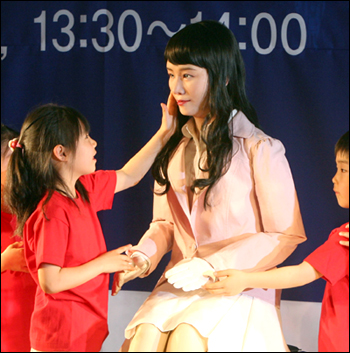
Korean Scientists Develop Female Android
Gynoid (from Greek óÃâ?¦í½í·, gyn – woman) is a term used to describe a robot designed to look like a human female, as compared to an android modeled after a male. The term is not common, however, with android often being used to refer to both “genders” of robot. The portmanteaus fembot (female robot) and feminoid (female android) have also been used; the latter sparingly. The term “Gynoids” was created by the female British SF writer, Gwyneth Jones, and developed by another British SF writer, Richard Calder who lives in Thailand. The word is derived from “Android” which denotes a robot with male attributes. Source: Wikipedia
axis mundi

Photo: Mathieu Struck

The Human Abstract
(William Blake)
Pity would be no more
If we did not make somebody poor,
And Mercy no more could be
If all were as happy as we.
And mutual fear brings Peace,
Till the selfish loves increase;
Then Cruelty knits a snare,
And spreads his baits with care.
He sits down with holy fears,
And waters the ground with tears;
Then Humility takes its root
Underneath his foot.
Soon spreads the dismal shade
Of Mystery over his head,
And the caterpillar and fly
Feed on the Mystery.
And it bears the fruit of Deceit,
Ruddy and sweet to eat,
And the raven his nest has made
In its thickest shade.
The gods of the earth and sea
Sought through nature to find this tree,
But their search was all in vain:
There grows one in the human Brain.
(Proximidades de São Luiz Gonzaga-RS, janeiro-2007)
Geografia do Imaginário – ou O Globo nas costas de Charles Atlas

Compass Rose
by Jake Sutton

Geografia Imperfetta di Corto Maltese
di Umberto Eco
(resenha de “A Balada do Mar Salgado“)
Sarí . Nella sua breve nota introduttiva Hugo Pratt dice che il suo interesse per i mari del sud nasce da La laguna blu di de Vere Stackpoole – e la memoria corre al film omonimo, che si svolge sí¬ nelle Figi, ma che proprio non farebbe pensare a Corto Maltese. Comunque puí² darsi, e Thomas Merton diceva di esser divenuto cattolico leggendo la teoria dell’apostasia di Joyce in A Portrait of the Artist as a Young Man. Ma io non mi fido degli autori, che sovente mentono. Mi fido solo dei testi. Ora, i personaggi della Ballata leggono altri libri.
A un certo punto Pandora appare dolcemente appoggiata all’opera omnia di Melville, e Cain legge Coleridge, autore di un’altra ballata, quella del vecchio marinaio. Tra l’altro la legge in traduzione italiana e la trova, con Melville, a bordo di un sottomarino tedesco (fa parte della biblioteca di Slütter, che lascerí ad Escondida, dopo la sua morte, anche un Rilke e uno Shelley; Cain peraltro in chiusura citerí Euripide). Se si calcola che Cranio ha fatto pratica legale presso un avvocato indiano di Viti Levu e discute di mitologia maori e sociopolitica melanesiana con la sicurezza di una Margaret Mead, occorre dire che i personaggi di Pratt sono molto pií¹ colti di lui. Quanto sono casuali o di maniera questi regesti delle letture dei nostri eroi? Passi per Cranio, che era un ragazzo volonteroso, ma qui legge anche un avanzo di galera come Rasputin, e in francese. Proprio all’inizio (settima inquadratura) lo troviamo a consultare Bougainville, Voyage autour du monde par la frégate du roi La Boudeuse et la flí»te l’Etoile. Posso assicurare che non si tratta della prima edizione del 1771, che a differenza della copia di Rasputin í¨ anonima e quindi non potrebbe portare il nome dell’autore in copertina; visto che si tratta ugualmente di un volume in quarto, potrebbe essere un originale rilegato posteriormente, ma sarebbe un peccato rovinare con l’umidití e il salmastro un pezzo d’antiquariato del genere; in effetti nella sesta inquadratura la pagina appare composta a tre colonne, e quindi potrebbe trattarsi di una edizione popolare ottocentesca.
Il libro í¨ aperto circa alla metí e a quel punto, comunque sia la composizione tipografica, si apre il capitolo V, “Navigation depuis les Grandes Cyclades; découverte du Golfe de la Louisiade”¦ Relâche í la Nouvelle Bretagne”. Rasputin non si concede divagazioni letterarie, consulta, assume informazioni sul punto in cui prevede di essere, visto che veleggia verso una base tedesca della Nuova Pomerania- che í¨ appunto la Nouvelle Bretagne di Bougainville. Perí², a parte che in quel capitolo Bougainville incontra piroghe e selvaggi che sembrano usciti dalle pagine della Ballata (ma forse sarebbe prudente invertire la prospettiva), se andiamo a vedere la bella ed ampia carta che precede il “Discours préliminaire” sorgono alcuni interrogativi inquietanti.
La carta di Bougainville non coincide affatto con la carta che Pratt disegna proprio nella pagina a fronte. In questo caso Pratt ne sa pií¹ del suo personaggio, ma il personaggio non legge la Ballata, legge Bougainville. Se Rasputin si riferisce alla carta di Bougainville e presume di essere vicino alla Nuova Pomerania, allora non puí² pensare di essere nel mare delle Salomone, perché Bougainville poneva le Salomone molto pií¹ a est (pií¹ o meno al posto delle Figi, prendendo un abbaglio di circa venti gradi di longitudine e dieci di latitudine). In altri termini se Rasputin, a naso, o con qualche strumento che nel 1913 non poteva mancare a uno scorridore dei mari, sa quello che Pratt sa e ci dice, e cioí¨ che egli aveva raccolto Cain e Pandora tra il 155í° meridiano (est, direi) e il 6í° parallelo sud, controllando su Bougainville dovrebbe essere sicuro di trovarsi vicino alla baia di Choiseul a poca distanza dalle Luisiadi di cui sta leggendo, ma lontanissimo dalle Salomone (dove tuttavia c’í¨ senza saperlo). Mi direte che la cosa í¨ irrilevante dal punto di vista narrativo, ma non í¨ cosí¬: quando poco dopo il mercantile olandese incontra il catamarano di Rasputin, la prima cosa che sia gli ufficiali che il marinaio figiano osservano í¨ che, per essere figiana, quell’imbarcazione appare assai fuori mano perché i figiani di solito vanno verso est e al sud. E, come vedremo dopo, í¨ questo che avrebbero dovuto fare, perché í¨ a sud-est (molto, molto pií¹ a sud est) che si trova l’isola del Monaco. Si dirí che Rasputin non í¨ lí che vuole andare, bensí¬ alla Kaiserine dei tedeschi, ma í¨ certo che vi arriva senza capire bene dove si trovi – o, se prima lo sapeva, ora ha tutto il diritto di perdere la testa, vista anche la sua conclamata instabilití emotiva. Si noti che lo stesso Bougainville, nel porre le Salomone nel posto sbagliato, manifestava molte esitazioni: infatti sulla carta scriveva “Isles Salomon dont l’existence et la position sont douteuses”.
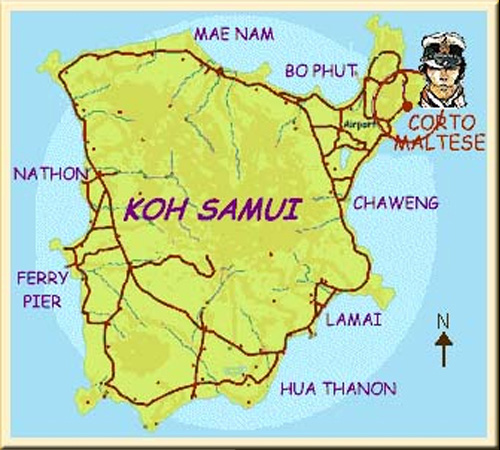
Ma Bougainville aveva ogni giustificazione. Delle leggendarie Isole di Salomone, dove si sperava di trovare l’oro del re omonimo, era gií andato alla ricerca nel 1528 Alvaro da Saavedra, muovendosi invece tra le Marshall e le Isole dell’Ammiragliato; ci arriva nel 1568 Mendana, le battezza, e dopo di lui nessuno riesce pií¹ a ritrovarle, neppure lui stesso, quando riparte alla loro riscoperta con Queiros, quasi trent’anni dopo, e le manca per un pelo, approdando a sud est, all’Isola di Santa Cruz. Da quel momento la storia dell’esplorazione del Pacifico í¨ la storia di gente che scopre sempre la terra che non andava cercando, un girare da dissennati tra isolotti, barriere coralline e continenti, sbagliando sempre la longitudine (almeno sino all’invenzione del cronometro marino di Harrison), e l’epicentro invisibile e introvabile di queste scorribande sono sempre le isole del Re Salomone, che si sono dissolte nell’aria. Si veda Tasman, che nel 1643 cerca le Salomone, arriva prima in Tasmania (il che non í¨ scarto da poco), avvista la Nuova Zelanda, passa per le Tonga, tocca senza sbarcarvi le Figi, di cui vede solo poche isolette e perviene sulle coste della Nuova Guinea. Com’í¨ come non í¨, Rasputin, che pure poteva disporre delle buone carte tedesche coeve che vedete a corredo di questa edizione, si ostina a documentarsi su Bougainville, dove le Isole Salomone sono ancora un sogno. Ma questo suo fallo onirico incide anche sul comportamento degli altri. Ditemi voi perché Corto deve trovare il sottomarino di Slütter (che ha in mano l’ottima carta disegnata dal Capitano Galland) sotto la punta occidentale della Nuova Pomerania, quindi mentre naviga verso ovest, se í¨ partito da Kaiserine, mentre la meta del sottomarino í¨ l’Escondida.
Dov’í¨ l’Escondida del Monaco? Parlandone con Pandora, Cain dice che il Monaco impera dalle Gilbert alle Sottovento, il che suona assai bene; ma un ragazzo che legge Coleridge ed Euripide dovrebbe sapere che le Gilbert sono a nord delle Figi, sulla linea dell’equatore, in Micronesia, e le Sottovento sono nelle Antille. E’ vero che viaggi del genere li ha fatti un Magellano, ma una volta nella vita, e morendoci per strada. Imperare dalle Gilbert alle Sottovento í¨ un lavoro duro, e lo spazio del Monaco si colora, pií¹ che di geografia, di mitologia.
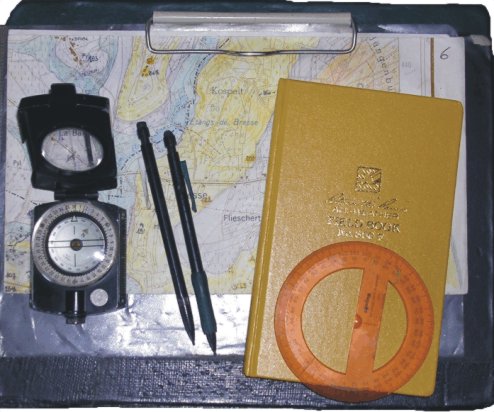
Facciamo ora i conti con il testo di Pratt e l’Atlante De Agostini. Pratt alla fine ammette a denti stretti che la Escondida si nasconde a 19 gradi di latitudine sud e 169 gradi di longitudine ovest: quindi dovrebbe essere tra Tonga e le Cook. Un ufficiale di marina tedesco che per andare alle Tonga naviga verso la Nuova Guinea e dice (come dice) “tra poco arriveremo all’Escondida” (e ne í¨ lontano 5000 chilometri) í¨ un sognatore, preso nella rete di Rasputin, che ha confuso i confini dello spazio. Il fatto í¨ che Rasputin, o Pratt, o entrambi, cercano di confondere anche i confini del tempo.
E’ solo leggendo attentamente che vi accorgerete che Cain e Pandora vengono catturati da Rasputin il primo novembre 1913 ma tutti arrivano all’Escondida dopo il 4 agosto 1914 (il Monaco li informa che in quella data í¨ scoppiata la guerra) e grosso modo tra il settembre e l’ultima decade di ottobre, quando entrano in scena gli inglesi. Tra due pagine di Coleridge e due discussioni con Slütter, í¨ passato un anno, nel corso del quale il sottomarino si muoveva per vaghe rotte, con indolenza curiosa, la sete di deriva dei bucanieri del XVII secolo, del vecchio marinaio, e del capitano Achab.
Tutti i protagonisti della Ballata, compresi gli ufficiali della marina tedesca, viaggiano nell’arcipelago dell’incertezza, come se percorressero storditi i rami dell’albero genealogico dei Groovesnore, e non vorrebbero mai arrivare. Non sanno seguire i pescecani come Tarao (l’unico che va e arriva dove vuole e deve, quasi in linea retta) e quando sfiorano la Verití Geografica non lo sanno. Eppure í¨ lí¬, nel nome di Pandora: c’í¨ un Pandora Basin tra le Figi e le Nuove Ebridi, ai suoi limiti si dispongono le Yasawa, nelle Yasawa c’í¨ la Blue Lagoon. Pandora í¨ simbolo di una sapienza cartografica che nessun personaggio della Ballata mostra di possedere. Rasputin ha letto solo Bougainville, Pratt ha letto solo de Vere Stackpoole, ma, come al solito, il testo ne sa pií¹ di tutti.
Tutto nella Ballata, segue il ritmo delle rotte marine che racconta, anche la psicologia dei personaggi, che si amano dopo essersi sparati addosso, o si uccidono per amicizia, e perdono il controllo, e si reinventano, con una discendenza, una cartella clinica, ad ogni pagina – e non sappiamo chi sia davvero il Monaco (non credo alla ricostruzione di Slütter, troppo precisa), né che volto abbia, e da dove venga Rasputin, perché Cain abbia quel nome (forse un riferimento byroniano), e soprattutto pochissimo sappiamo di Corto, di cui pure i racconti successivi ci diranno tutto, senza neppure risparmiarne la mamma. E’ incerto anche il disegno e Corto non ha i tratti essenziali e definiti, non dico degli ultimi racconti (dove addirittura ringiovanisce e si angelica, perdendo i segni di una vita non integerrima), ma neppure della sua epopea pií¹ matura, quando si muove con disinvoltura tra la laguna veneta, il Brasile, l’Irlanda e le rotte terrestri della Transiberiana.

Bleeker compass
by blueneurosis
(C) All rights reserved
Corto, oggi inconfondibile, all’epoca della Ballata si cerca ancora: í¨ ignaro della propria biografia (appare di colpo incatenato in mezzo al mare come il Giuda della Navigatio Sancti Brandani), incerto della propria psicologia, e del suo volto lui e Pratt sanno ancor poco, abbozzandolo come fanno di vignetta in vignetta, man mano che la storia procede, da pochi tratti essenziali ad un infittirsi di rughe interrogative. Forse dimenticheremo molte storie dove Corto Maltese appare perfetto nella sua istantaneití geroglifica, ma nella Ballata vive e si fa memorabile a causa della sua tentativa imperfezione. Proprio per questo la Ballata rimane nella mente dei suoi primi lettori come un evento, il modello di un nuovo modo di fare letteratura attraverso il fumetto, e l’Escondida assurge a luogo dell’universo della narrativití , dove Ismaele si confonde con Mandeville, il Pacifico sfuma nella Terra del Prete Gianni, le carte geografiche contraddicono le parole, che non precisano, ma corrodono i contorni dello spazio, s’intersecano i paralleli, l’atlante si riduce ad un portolano dubitoso, e un Monaco quasi medievale potrí inalberare, ingentilito dagli alisei, un emblema da Consiglio dei Dieci.
Ho sempre sostenuto che i disegnatori si disegnano nei loro protagonisti, o nei deuteragonisti al massimo, e chi ha visto di persona Al Capp, Feiffer, Schulz o Jacovitti, lo sa (solo Phil Davis ha disegnato in Mandrake il volto di Lee Falk- o Lee Falk ha adattato il proprio volto ai suggerimenti di Phil Davis). Di Pratt non lo sospettavo. Ma un giorno, alla presentazione di non so pií¹ quale libro o evento, l’ho incontrato alla Terrazza Martini di Milano e l’ho presentato a mia figlia, allora molto piccola ma gií lettrice delle sue storie, e lei mi ha sussurrato che Pratt era Corto Maltese. Che il re sia nudo, lo puí² dire solo un bambino. Pratt non ha la statura, l’astata longilineití di Corto, ma guardandolo meglio, di profilo, ho dovuto convenire che in qualche modo era vero: la linea del naso, il taglio della bocca, non so, certo Pratt non í¨ il Corto della Ballata, ma diciamo il Corto pií¹ magico delle ultime storie, quelle che allora Pratt non conosceva ancora”¦ Pratt si stava cercando (fantasticava con la matita chiedendosi come avrebbe voluto essere – ora lo si sa, si vuole un elfo), e cercandosi inseguiva alcuni sogni errabondi.
Cosí¬ si fa errabondo un testo. Ed í¨ in questa bruma che affetta spazio e tempo che nascono i miti, e i personaggi sciamano per altri testi, si installano come nativi nella nostra memoria come se fossero esistiti da sempre nella memoria dei nostri padri, giovani come Matusalemme e millenari come Peter Pan, talché ci capita spesso di incontrarli anche dove non sono raccontati, e addirittura – almeno tanto í¨ dato ai bambini – nella vita.
Umberto Eco.

X
by: Mathieu Bertrand Struck
(Mapa encontrado em parede na Rua Paula Gomes, centro de Curitiba – Map found in decayed wall in Curitiba, Brasil, Paula Gomes Street)












